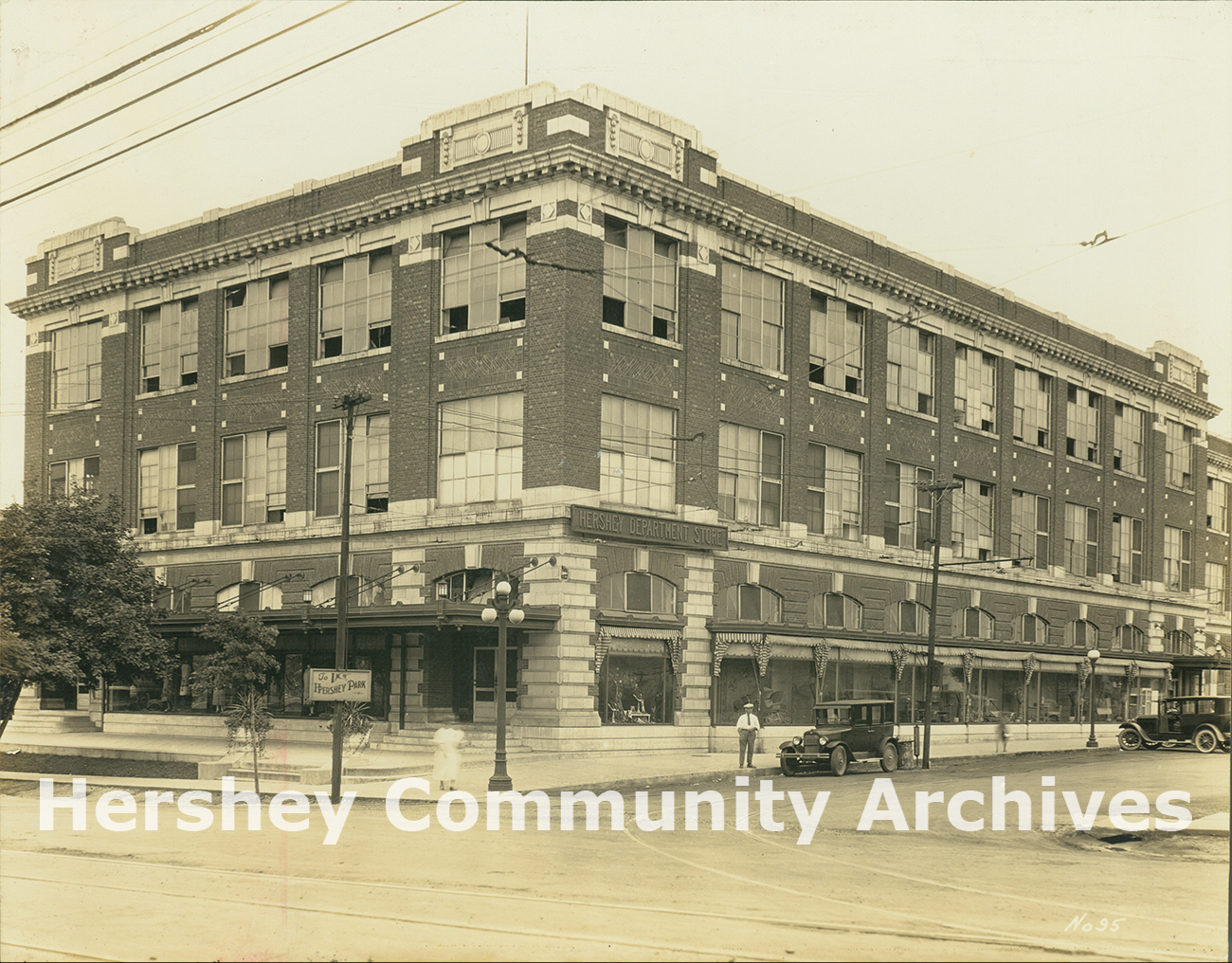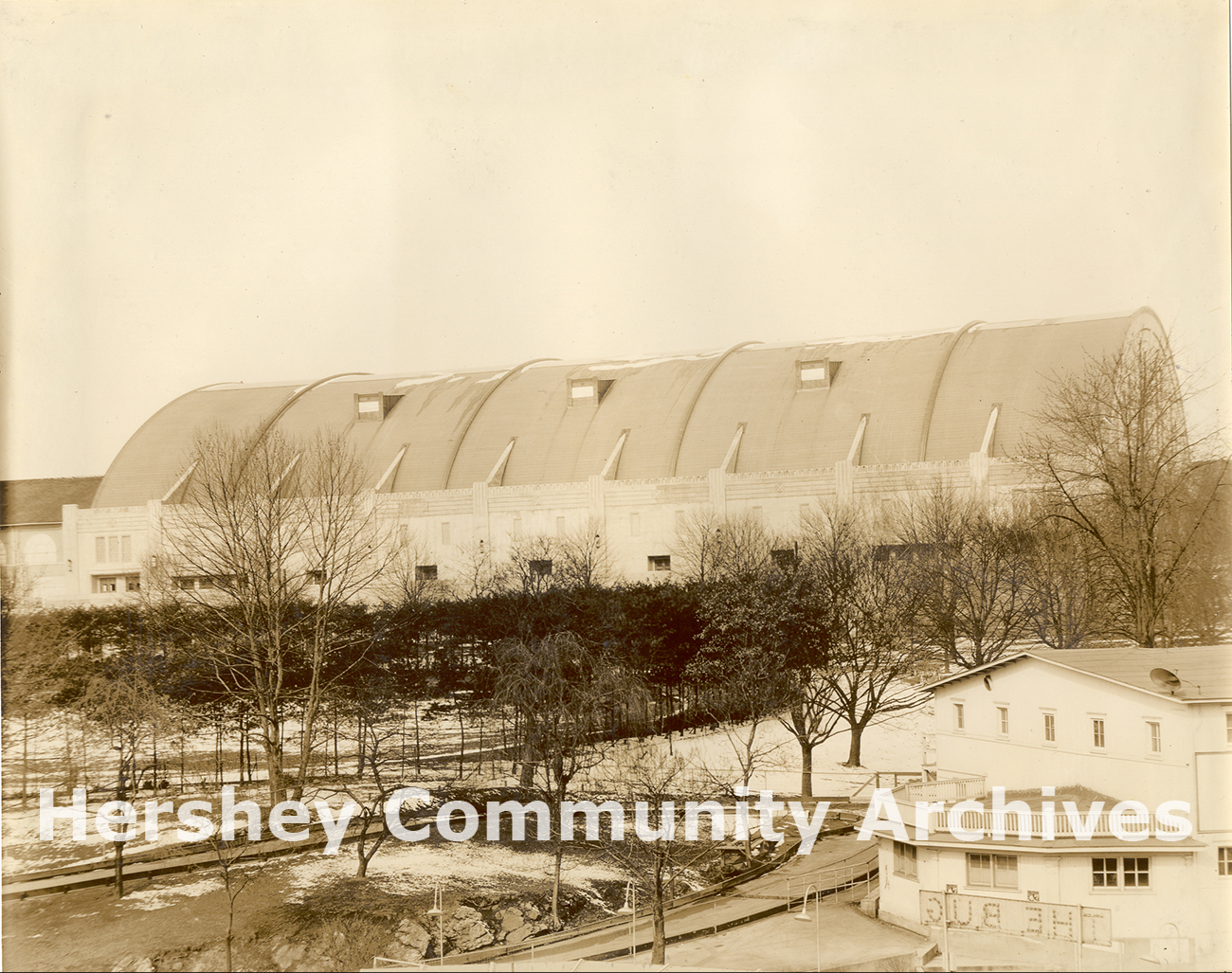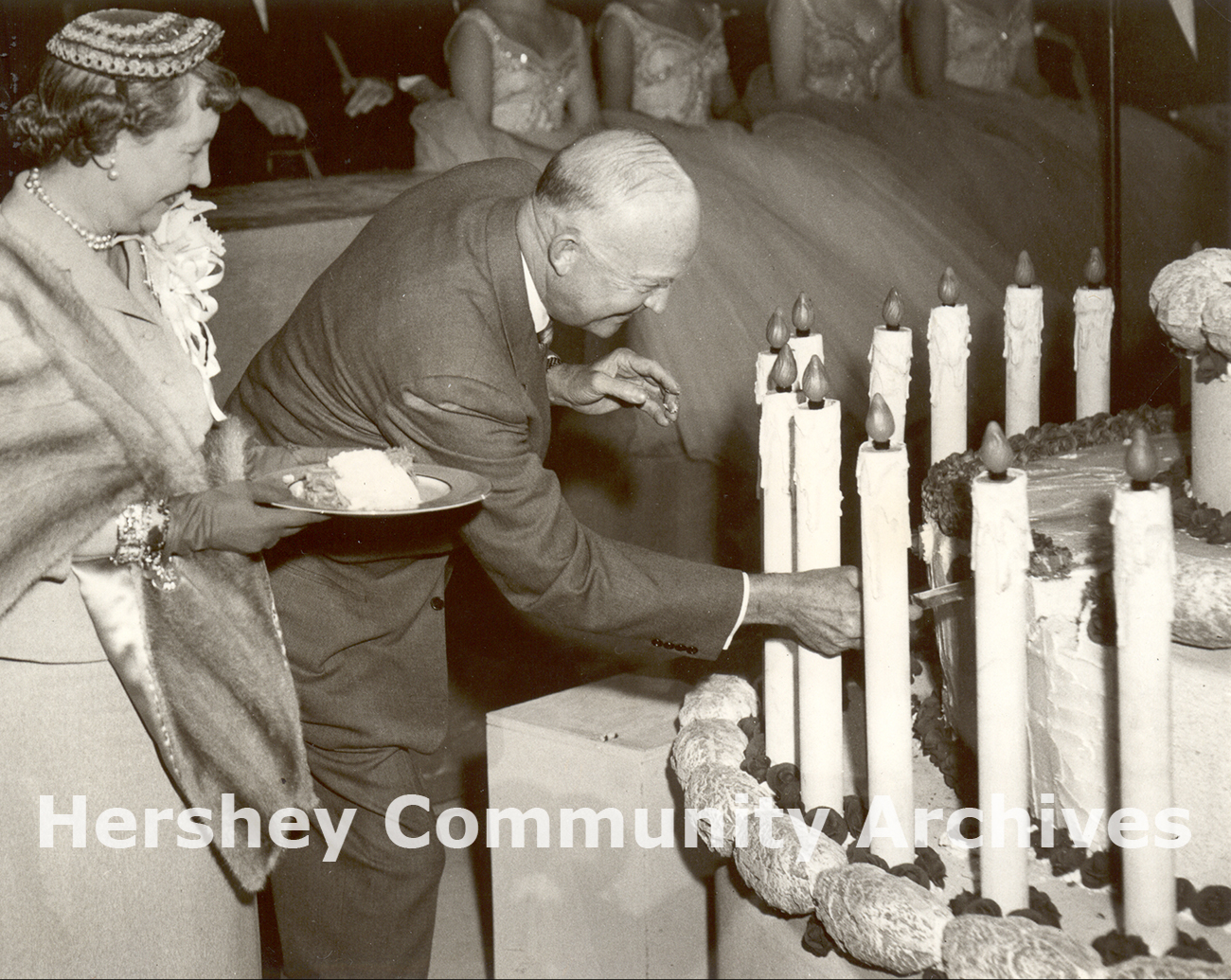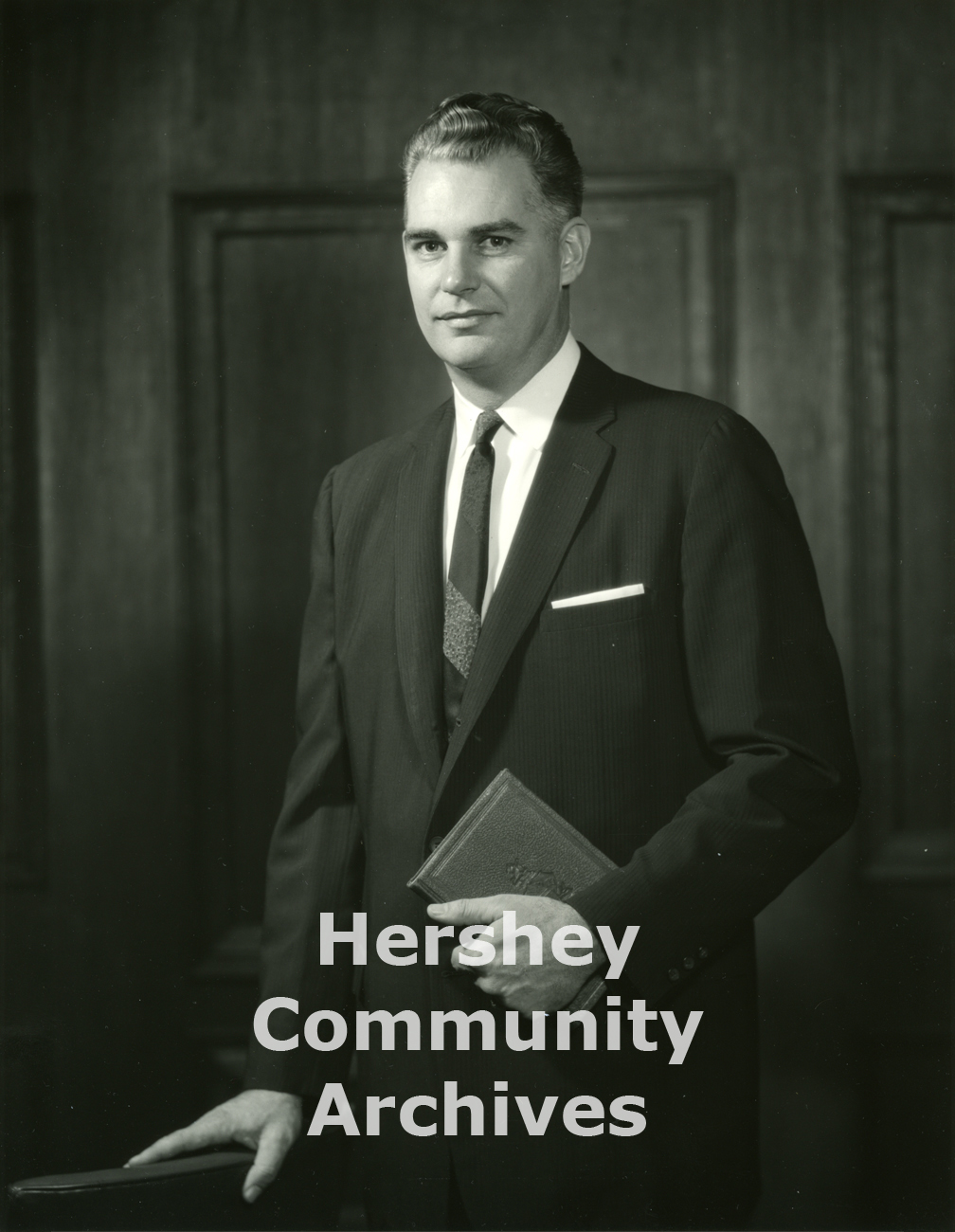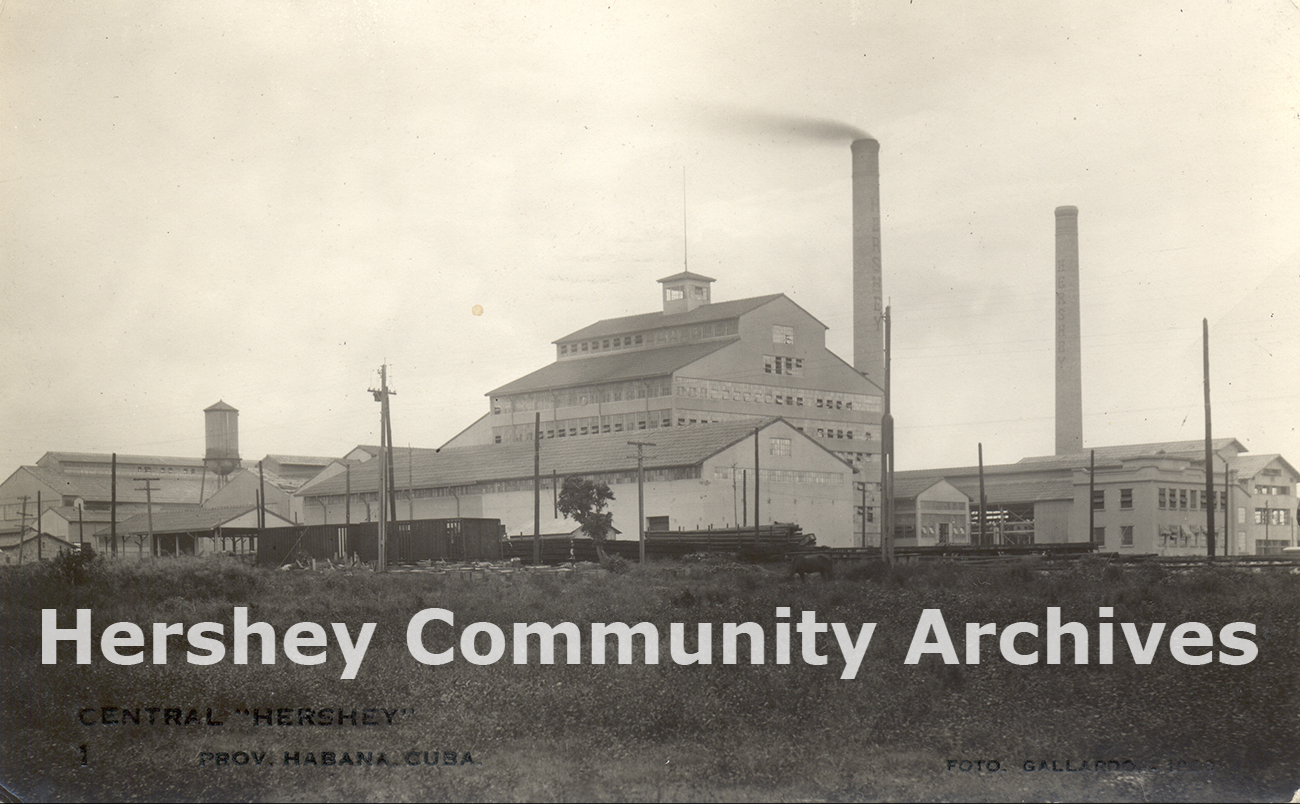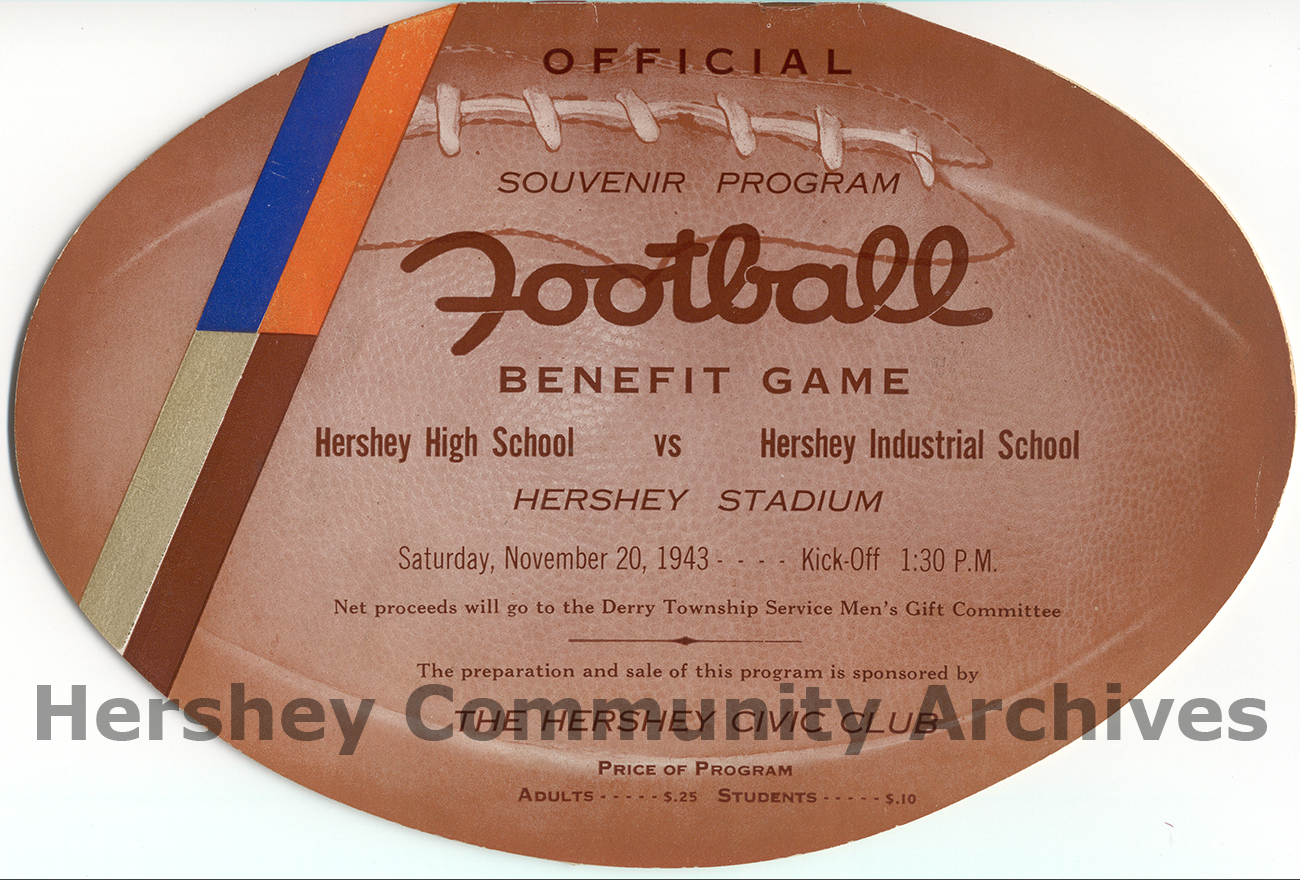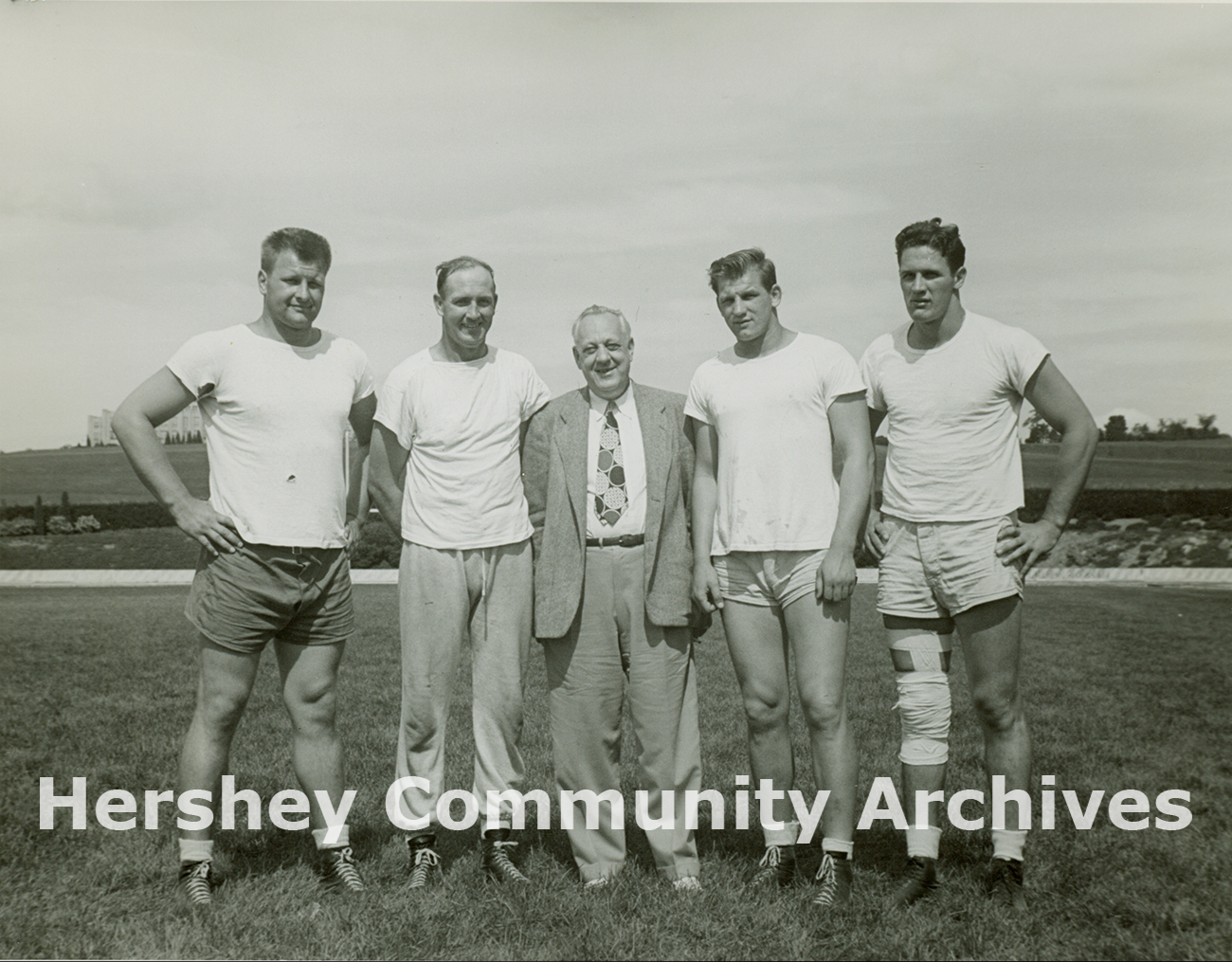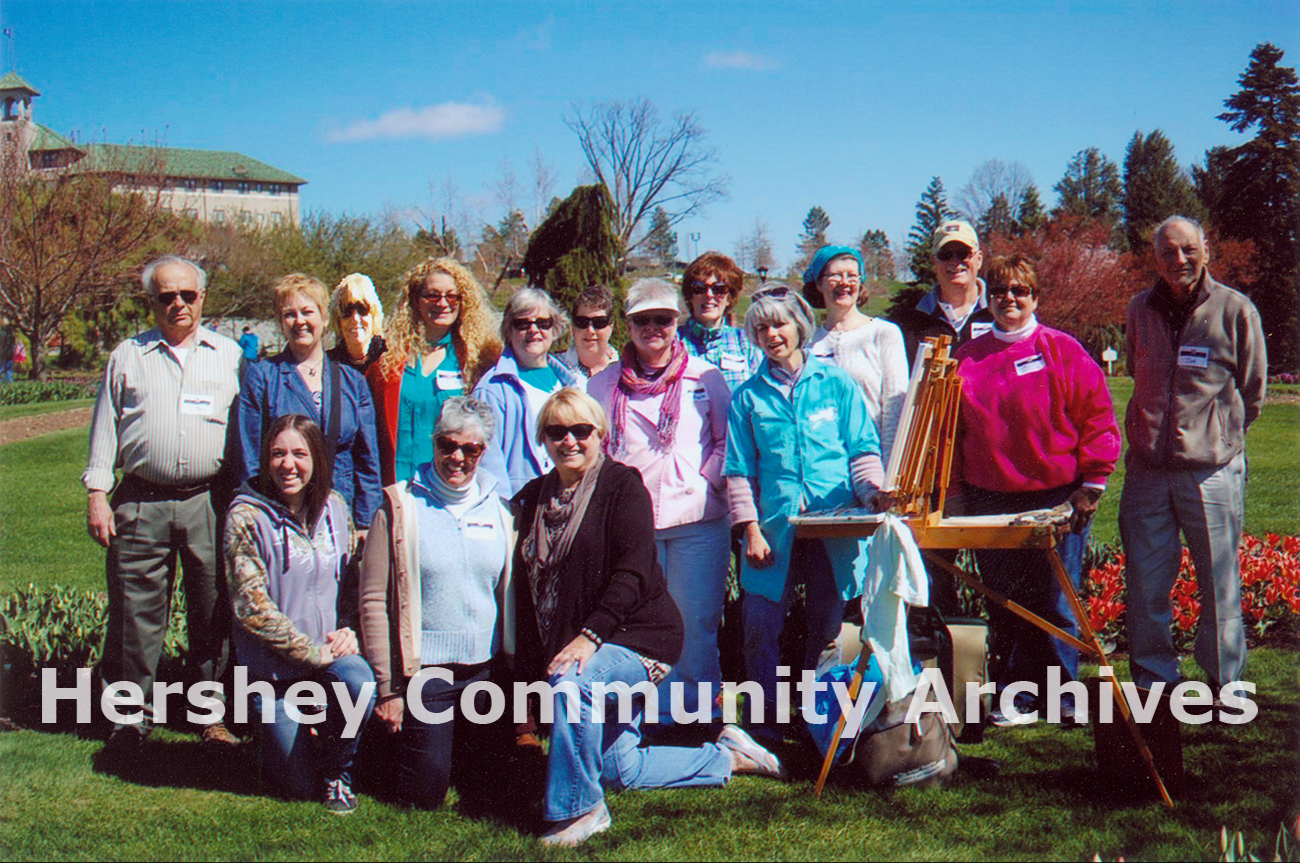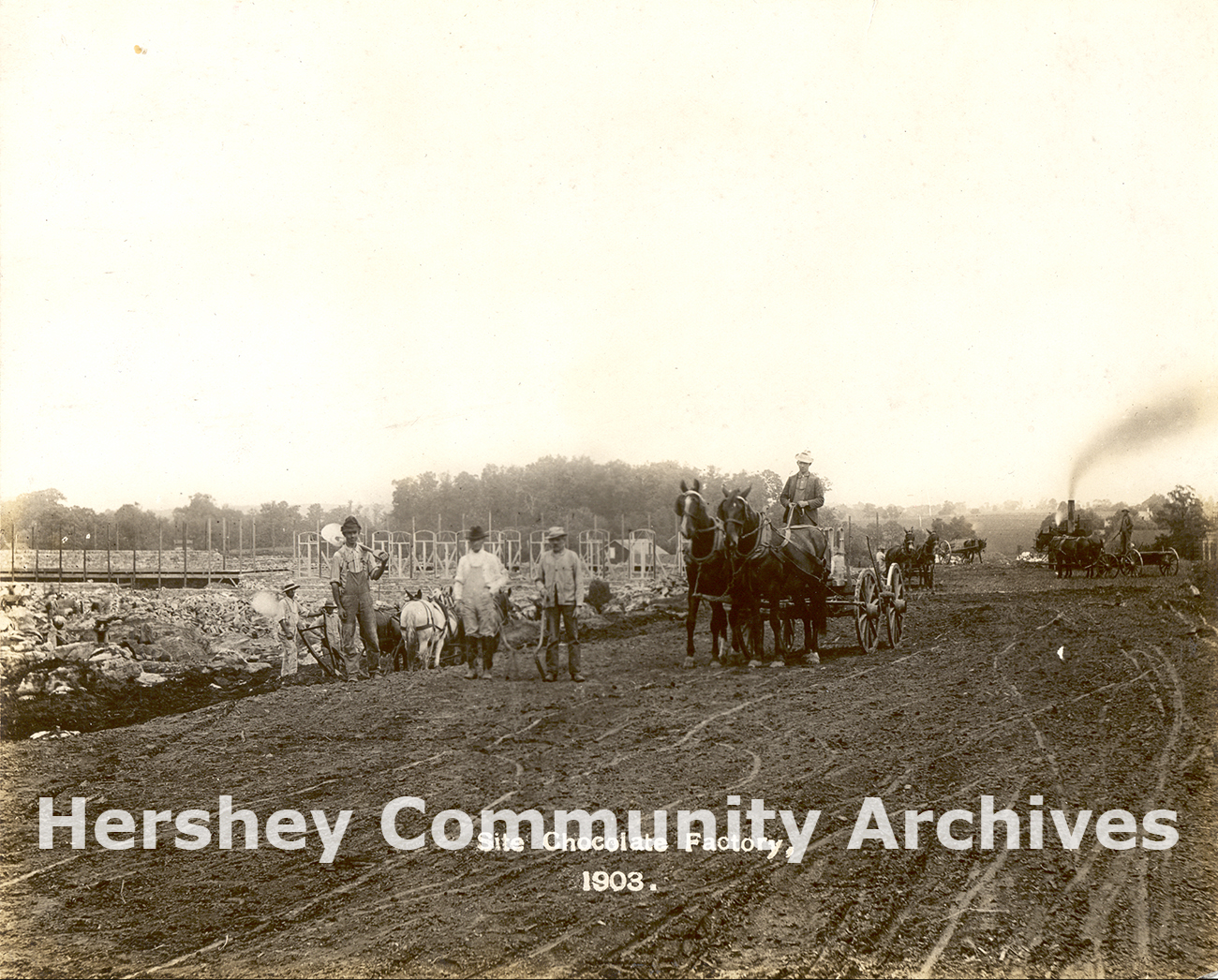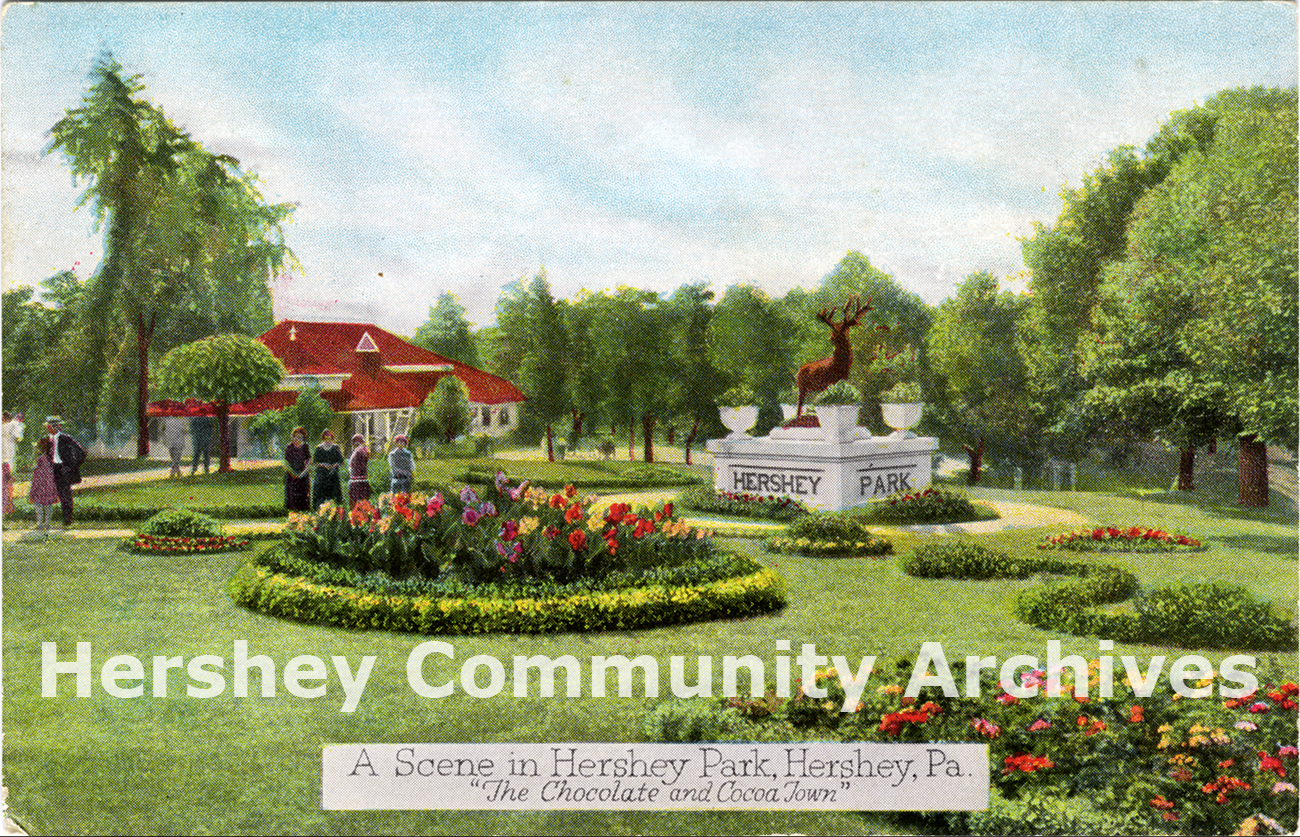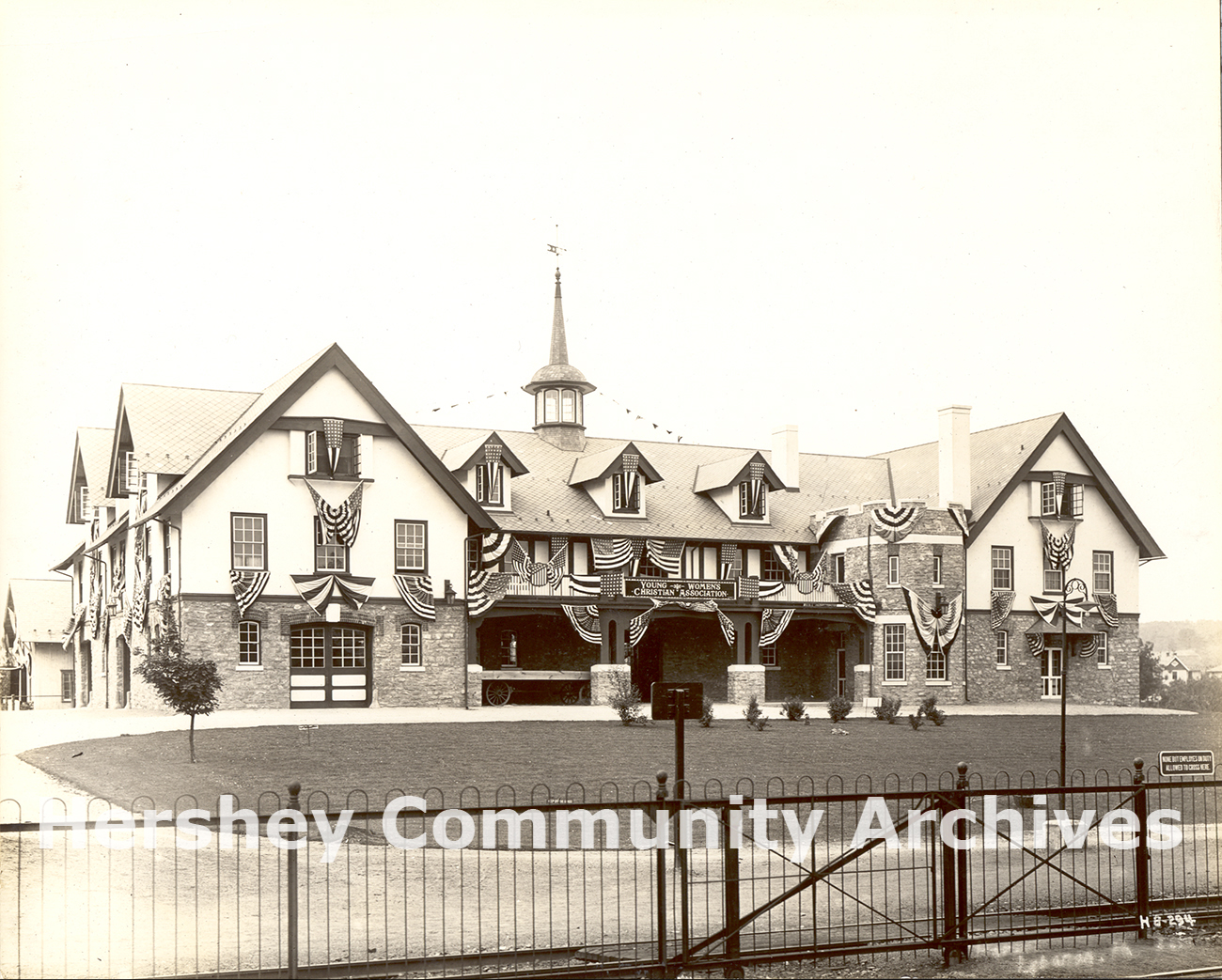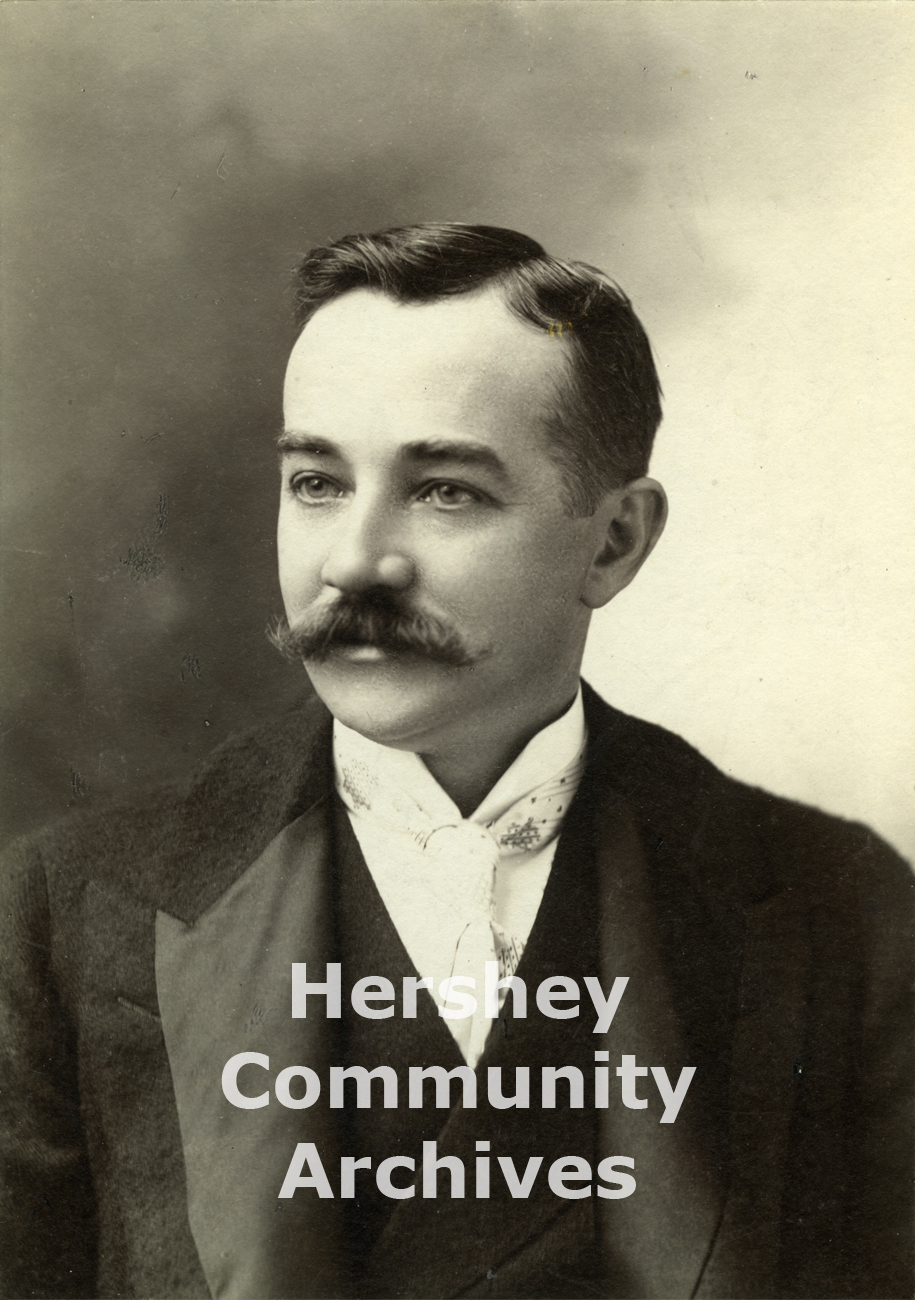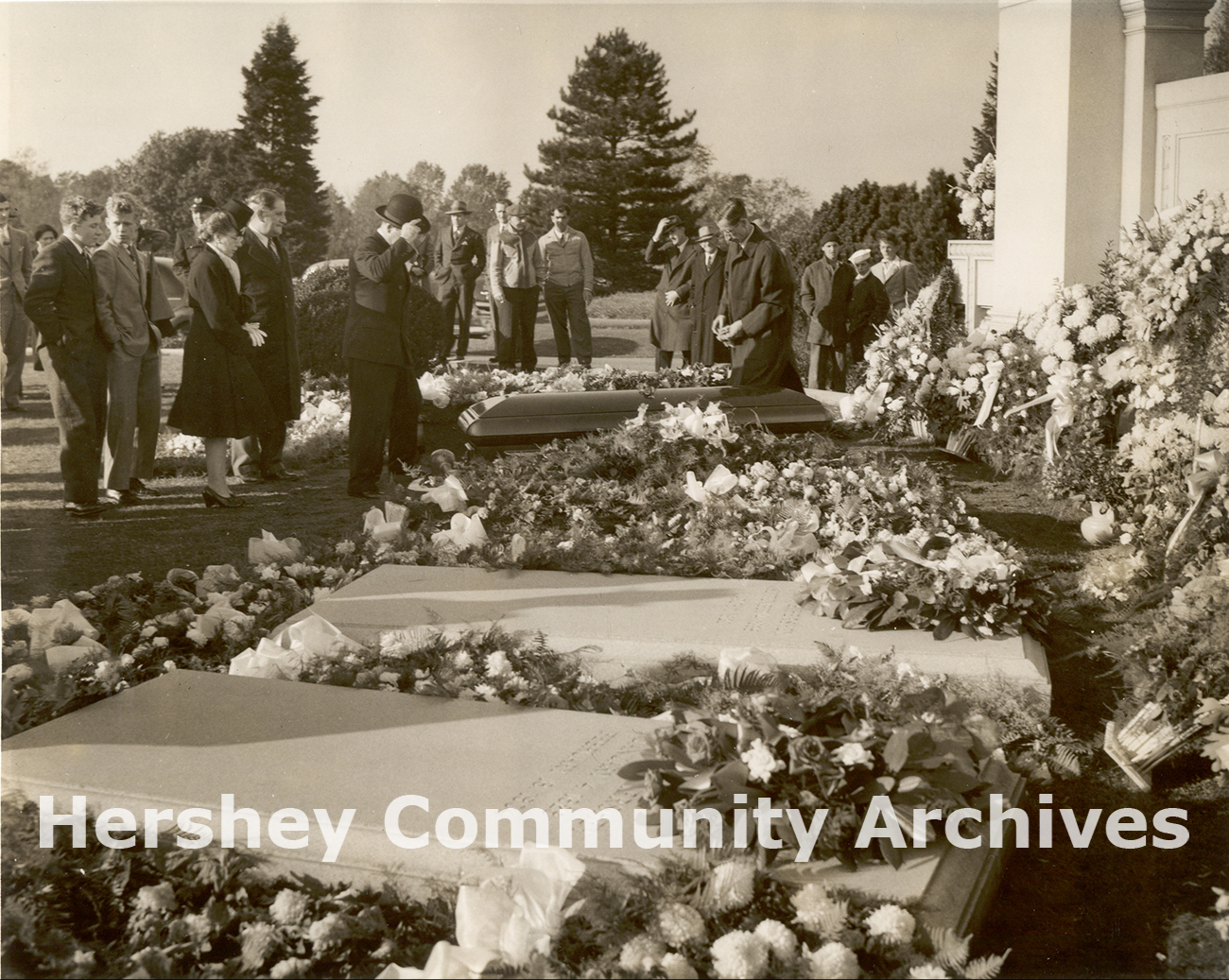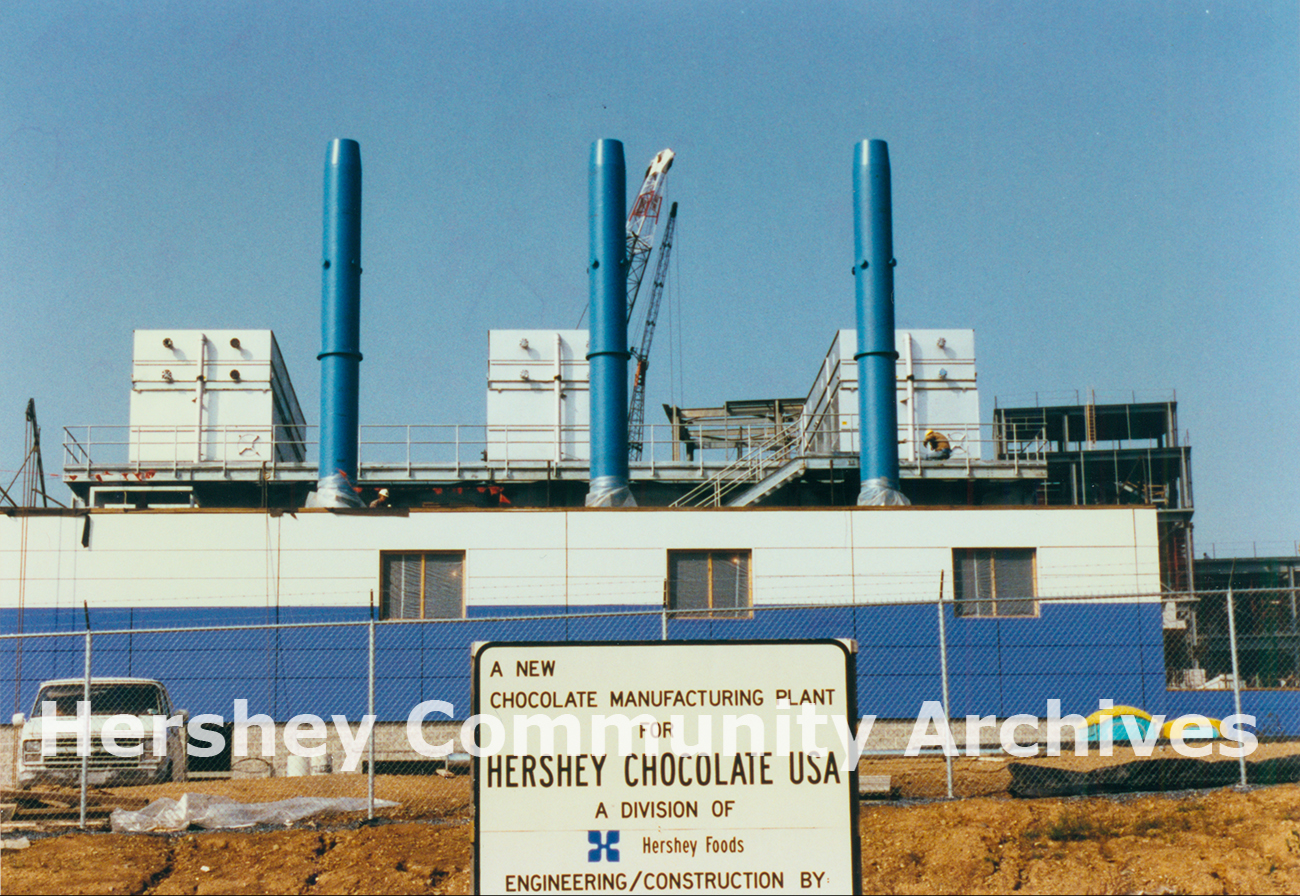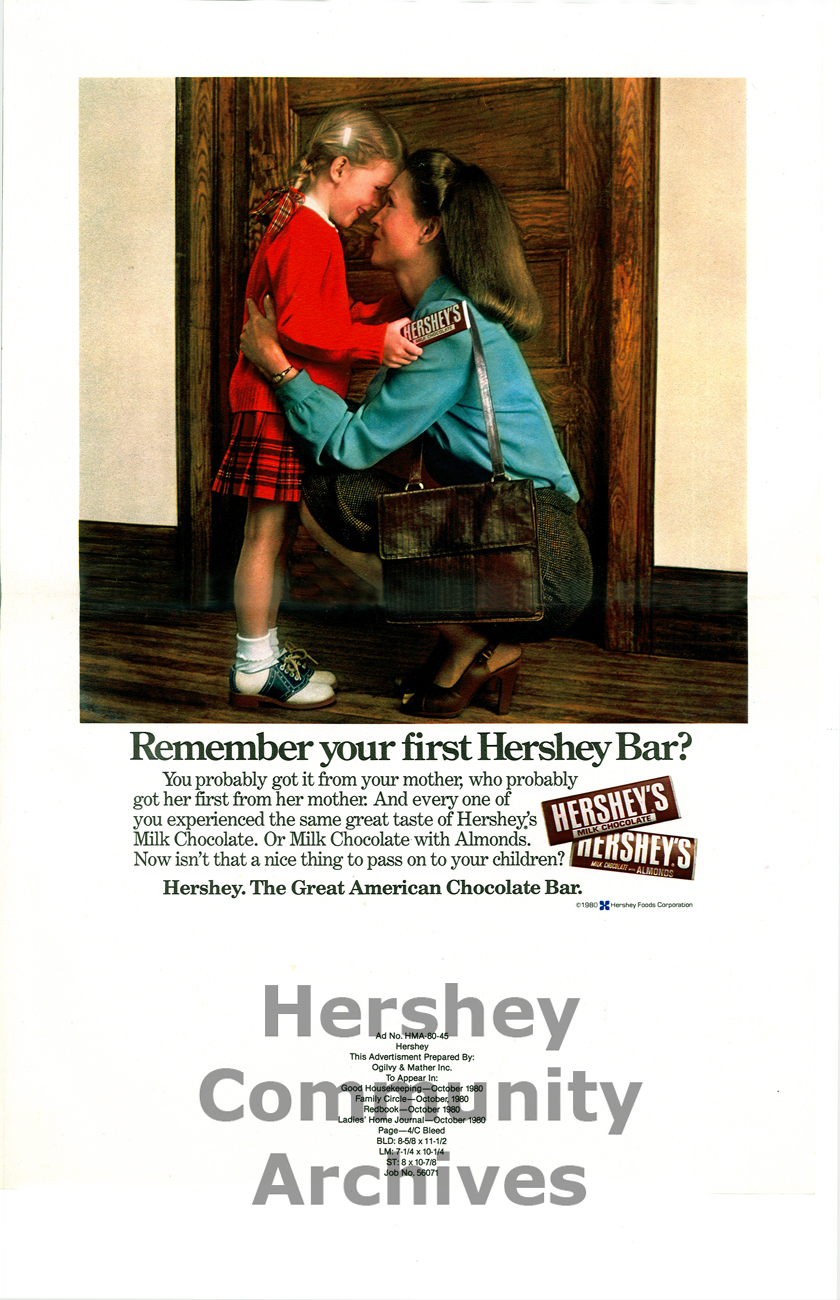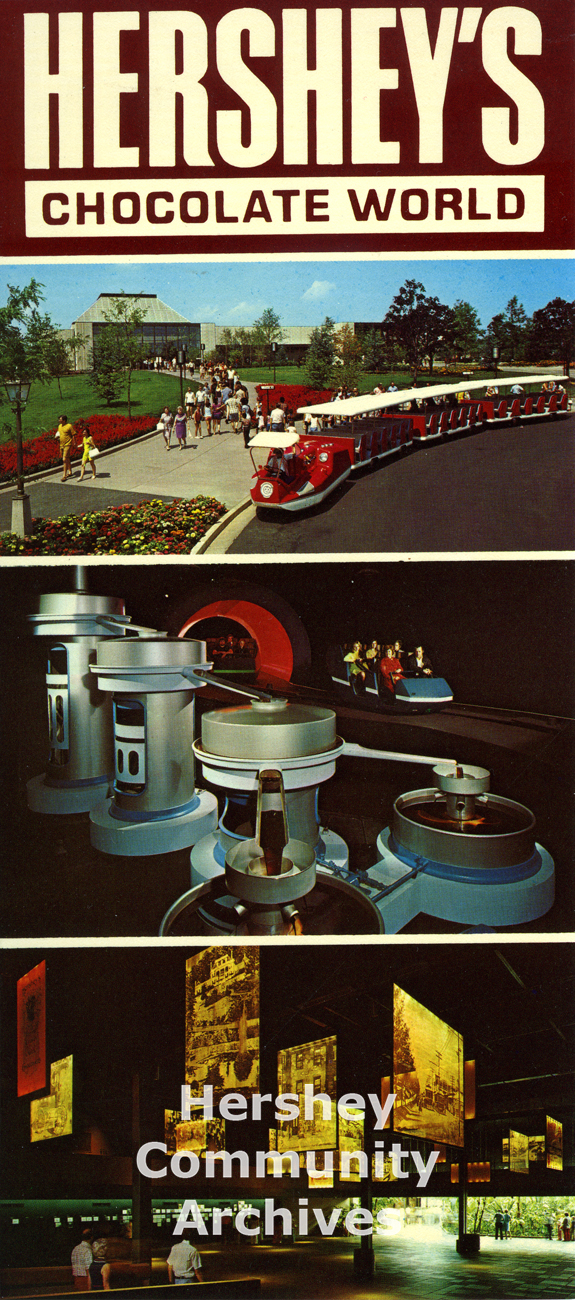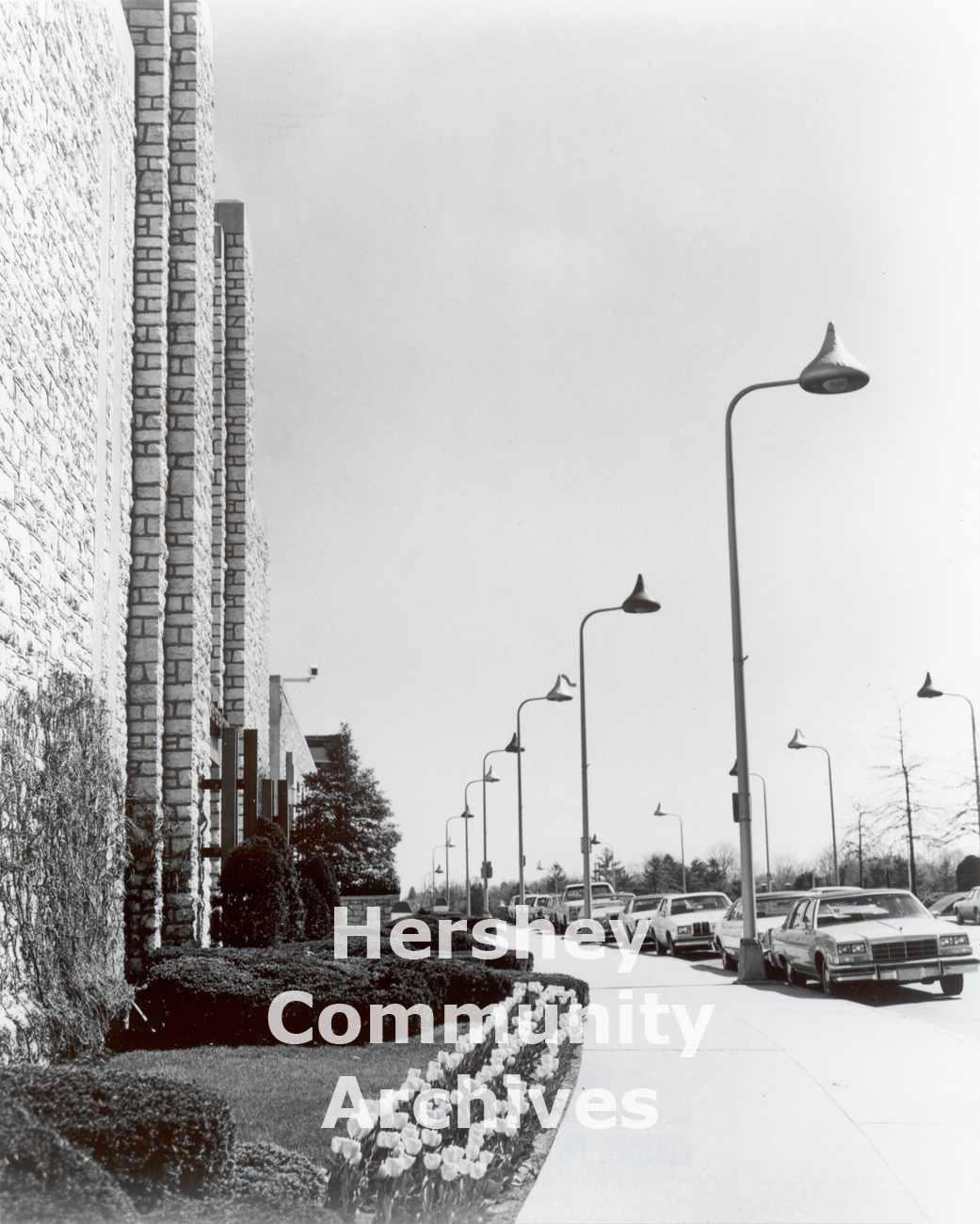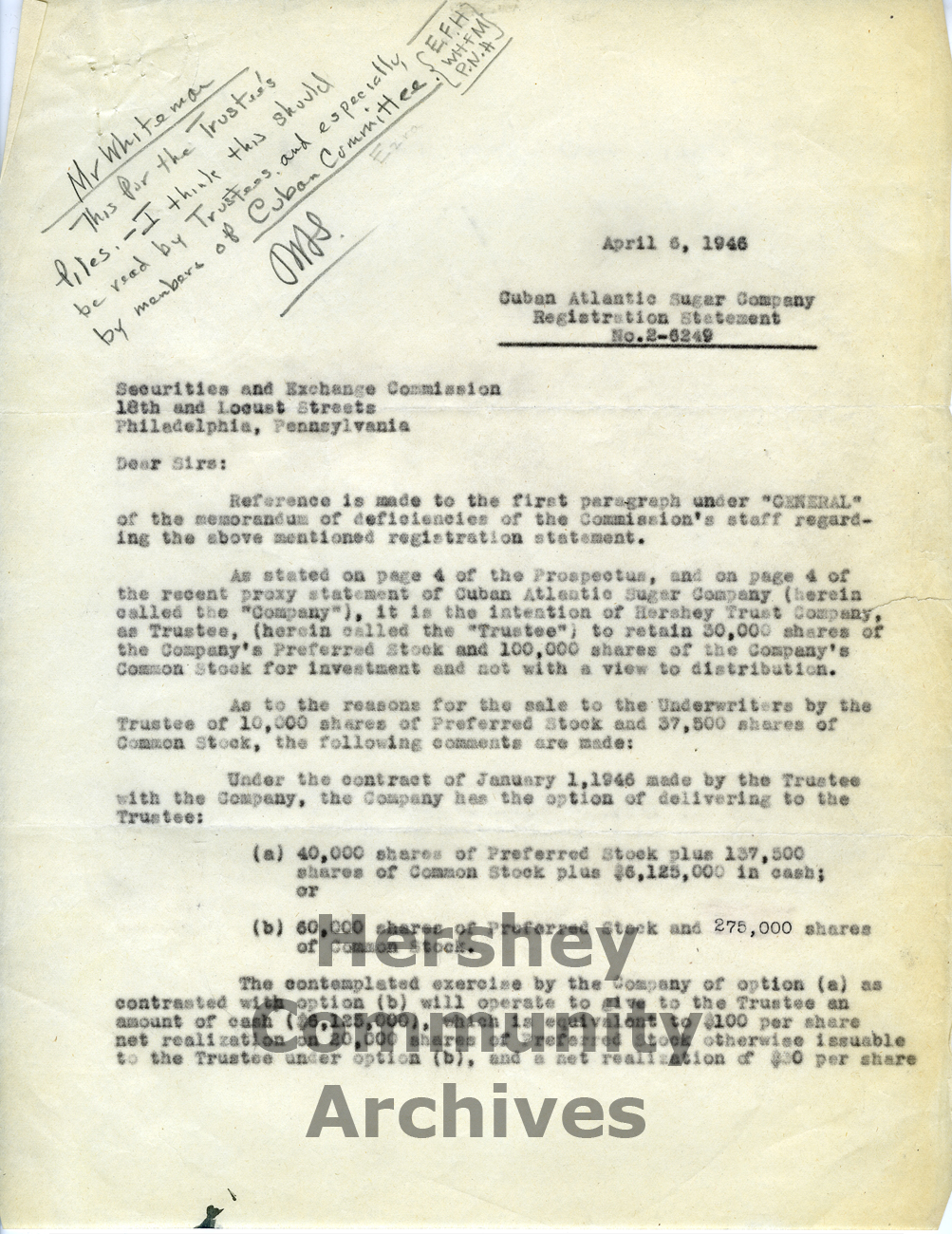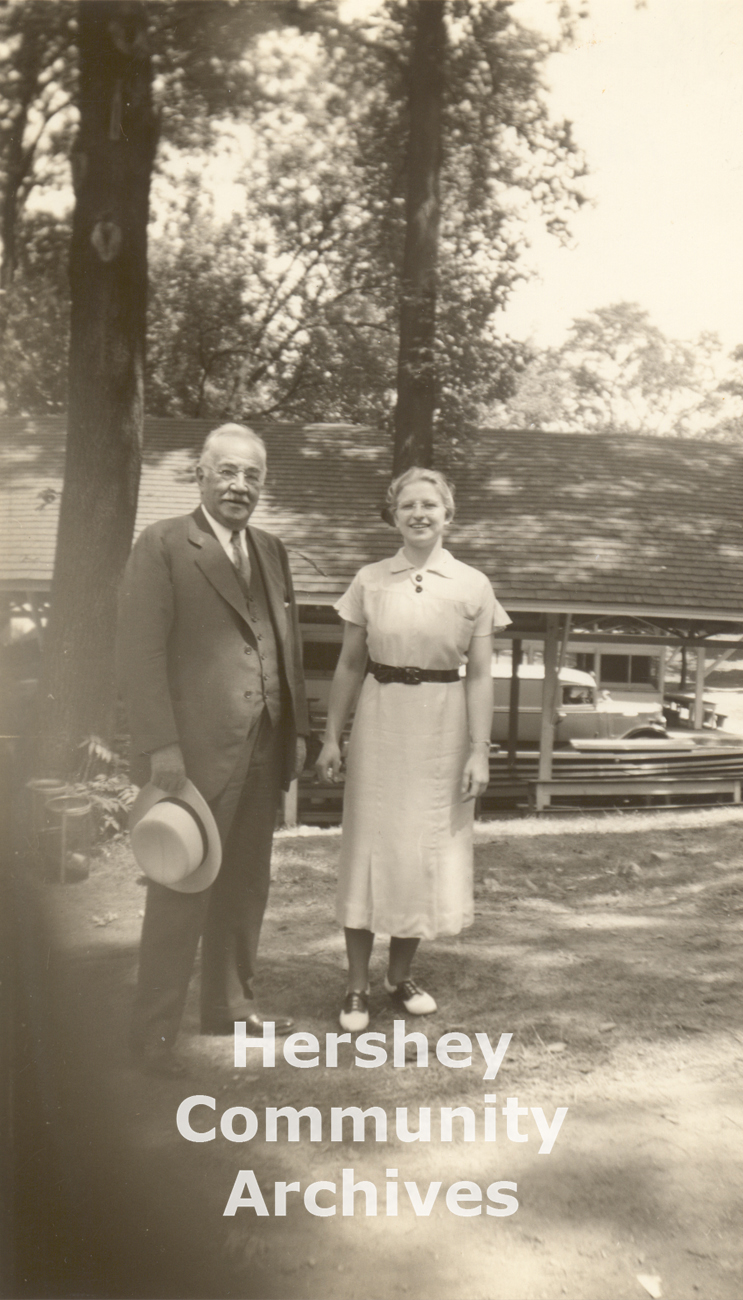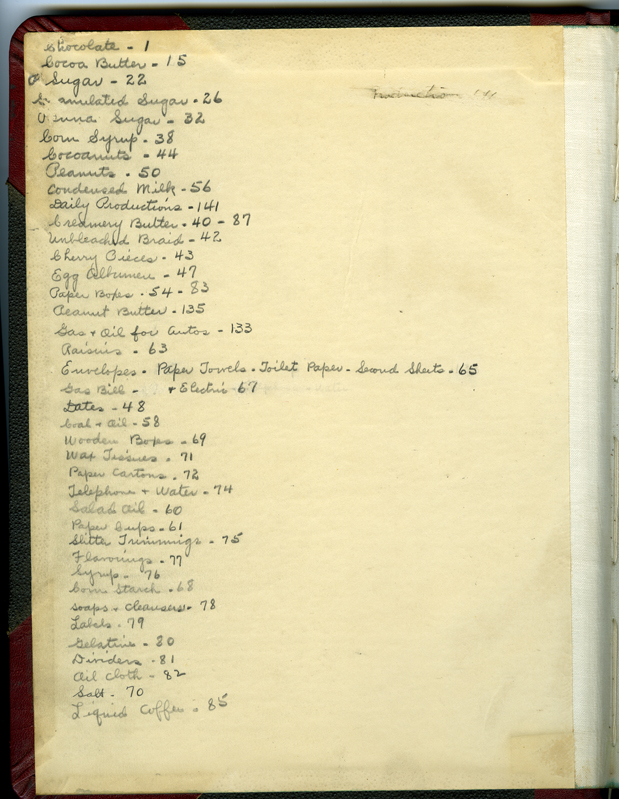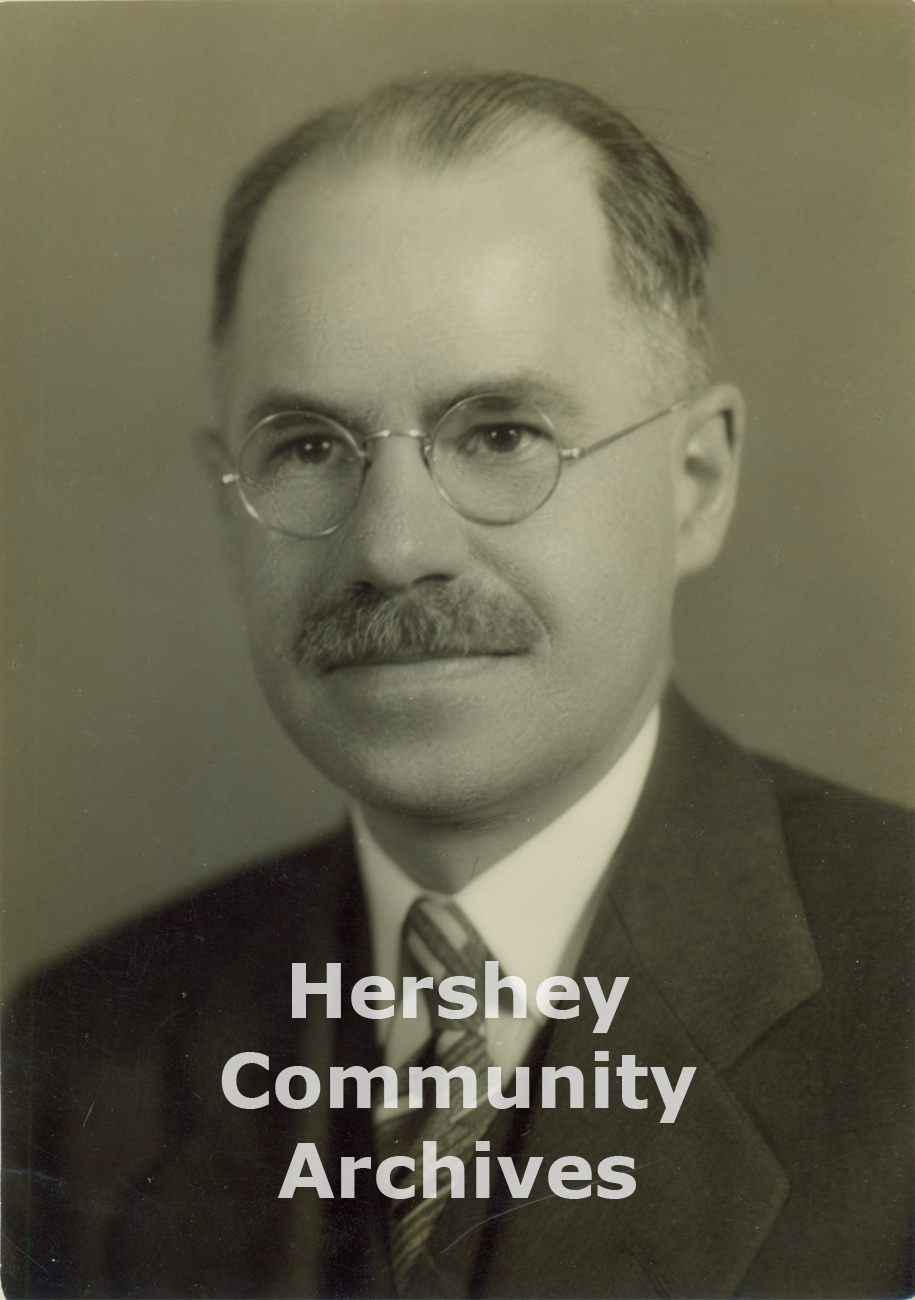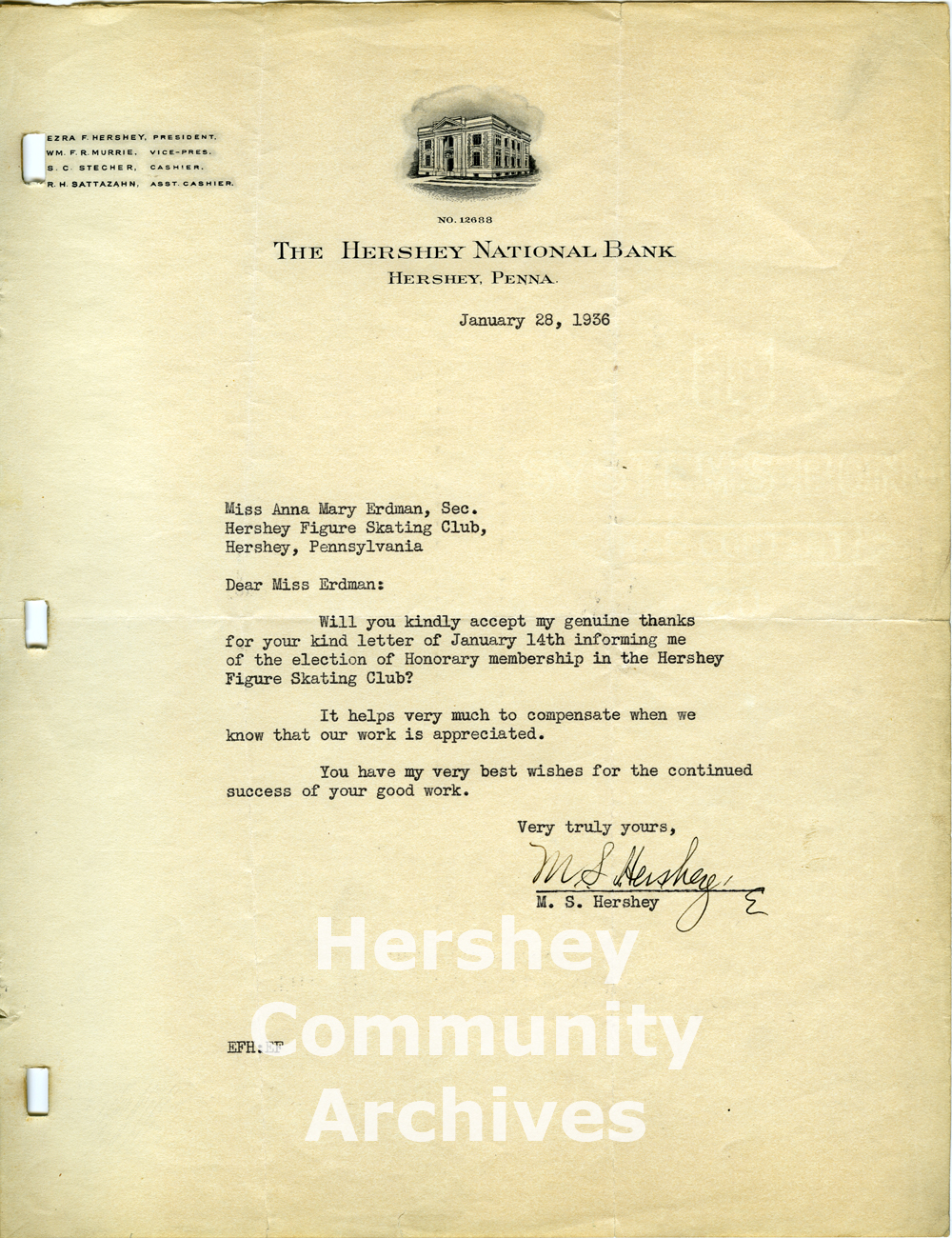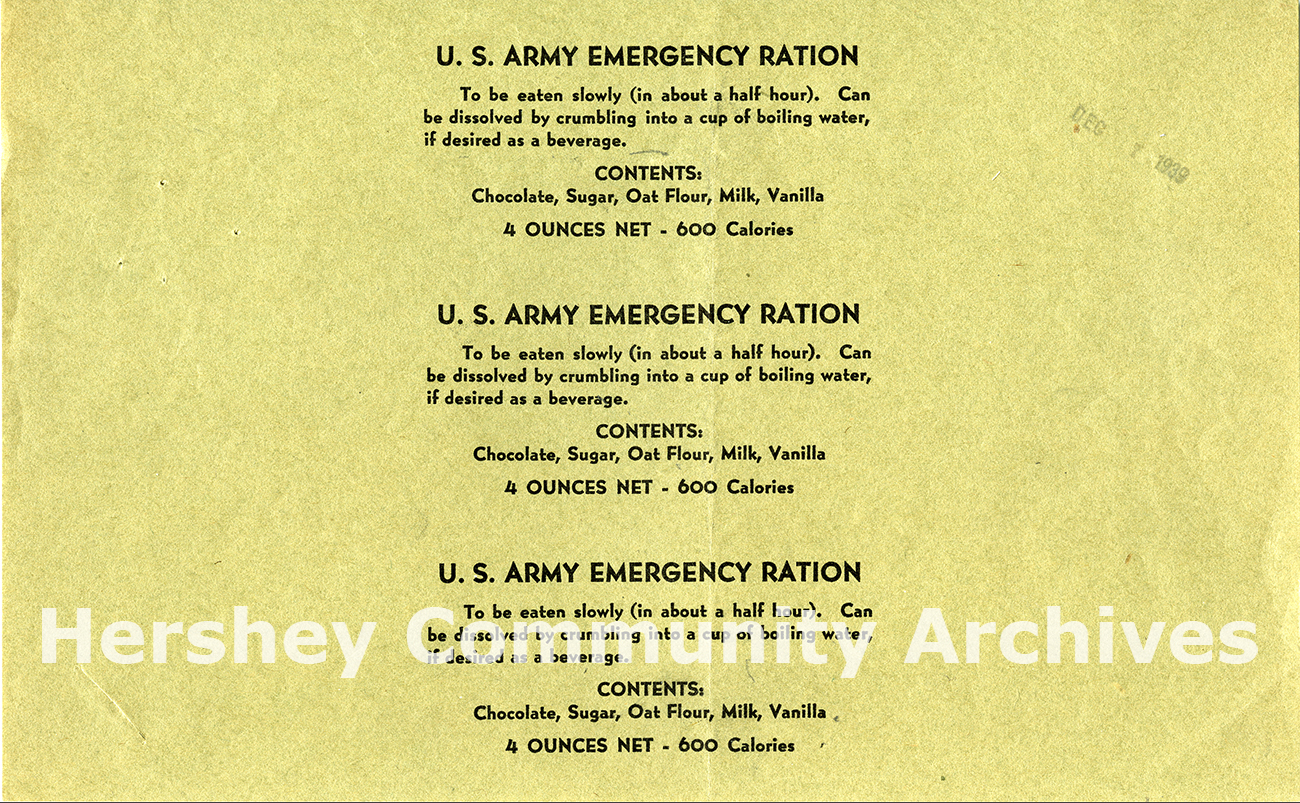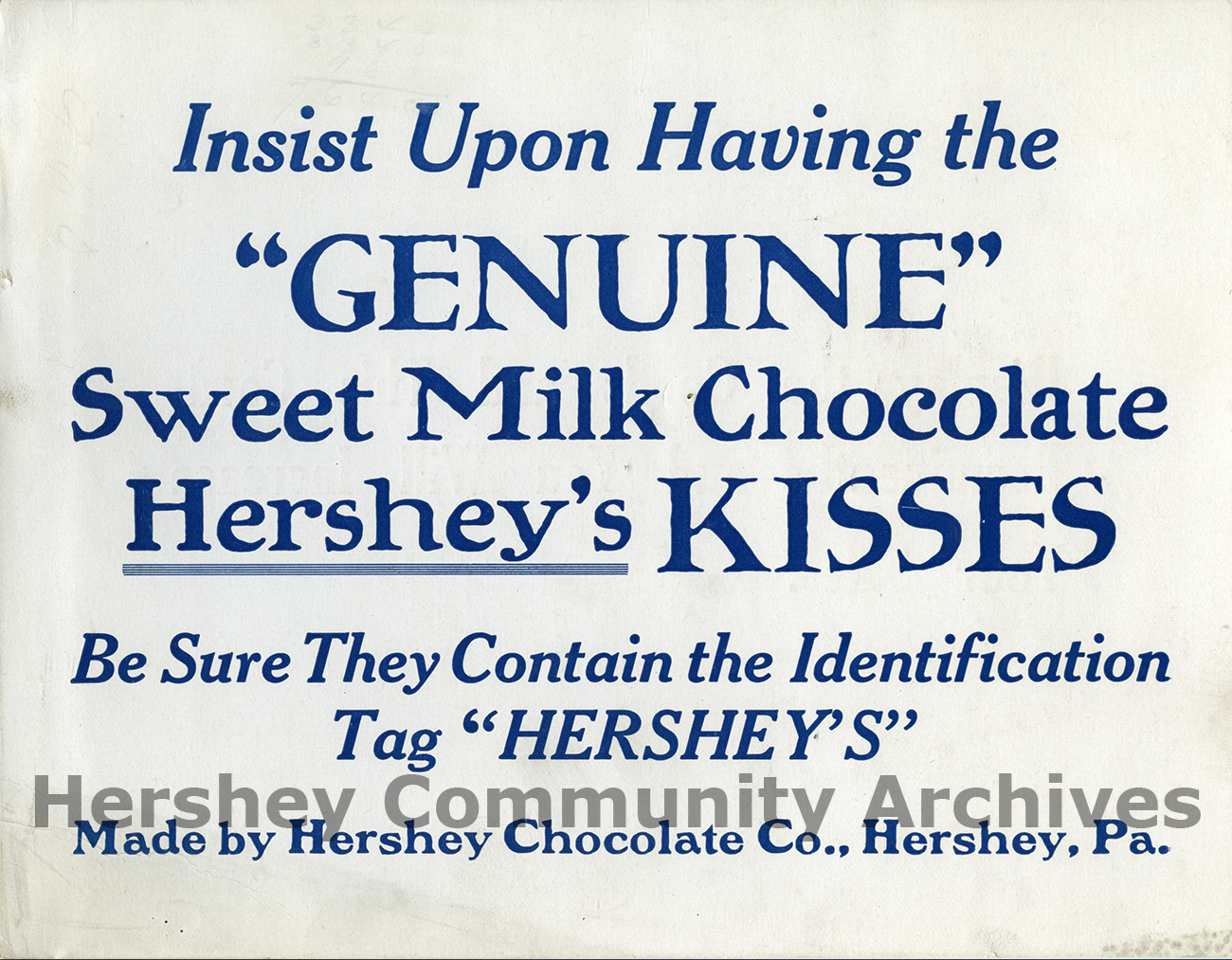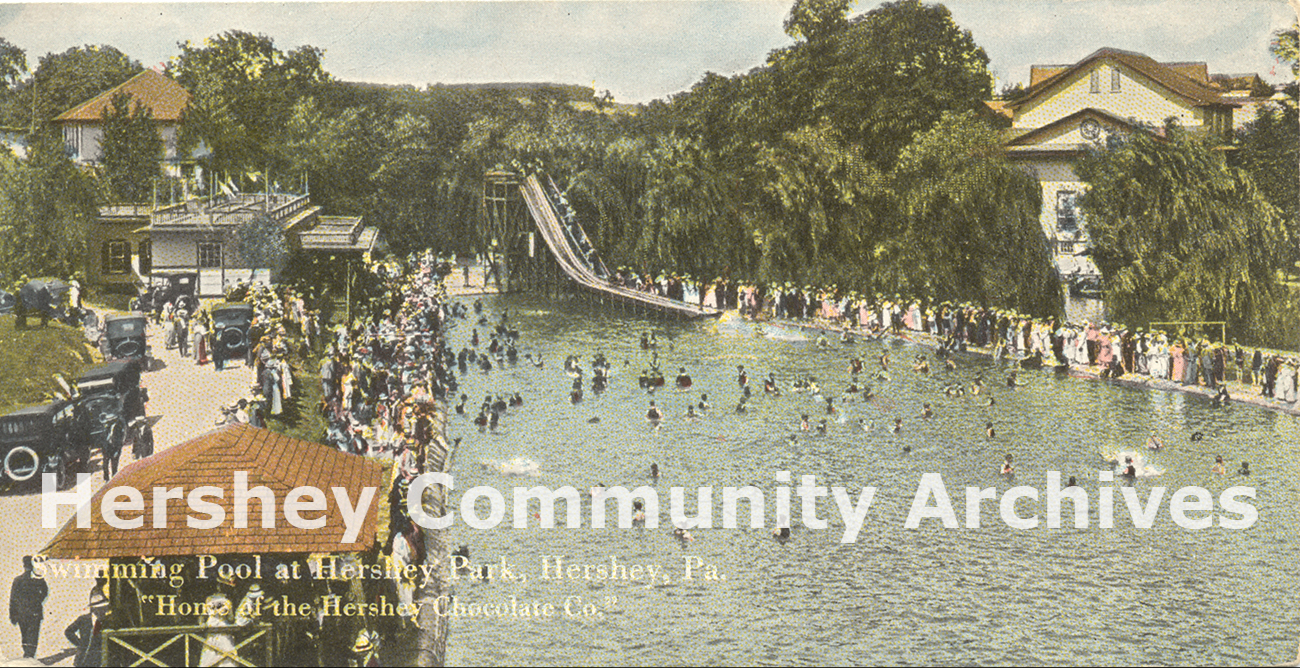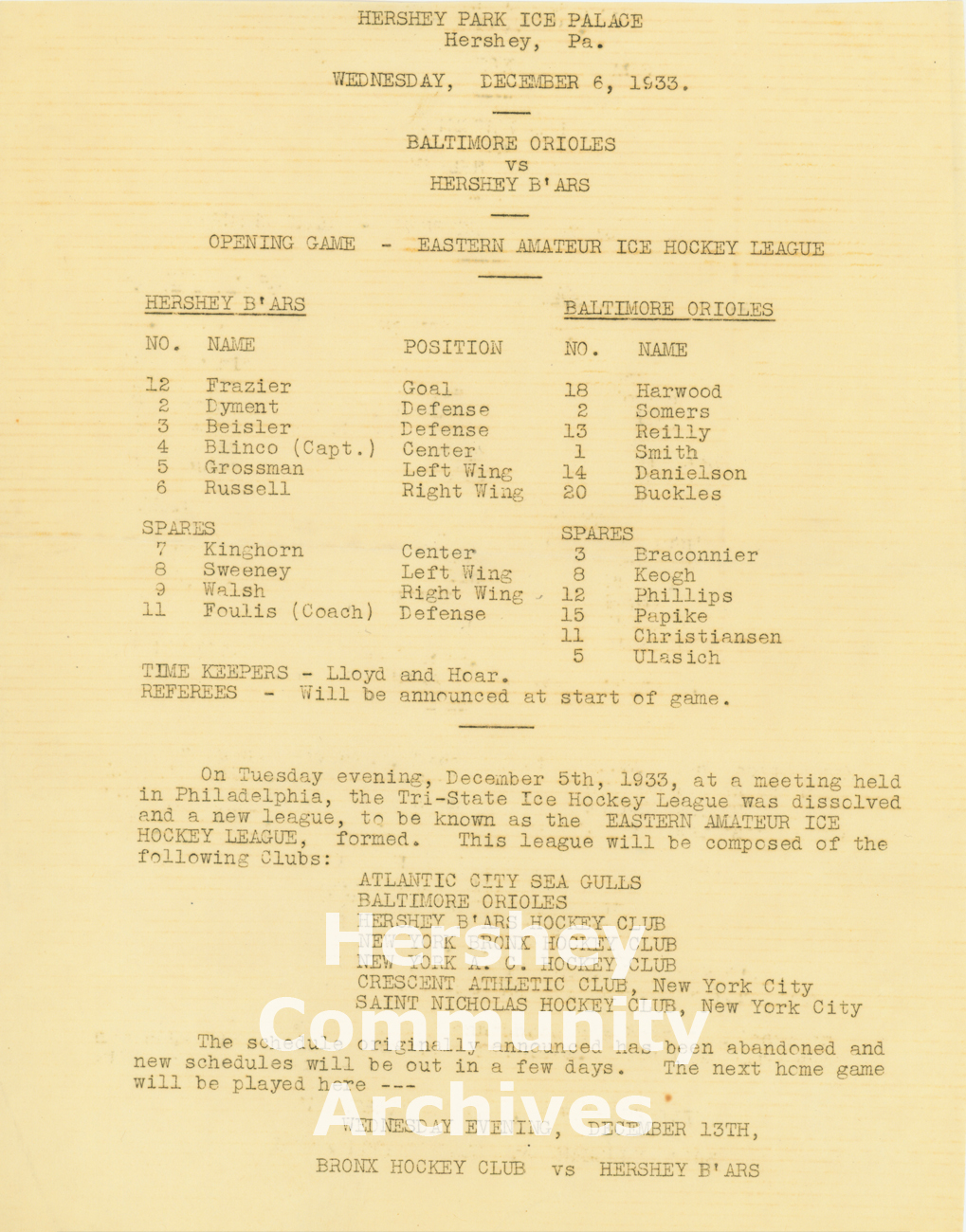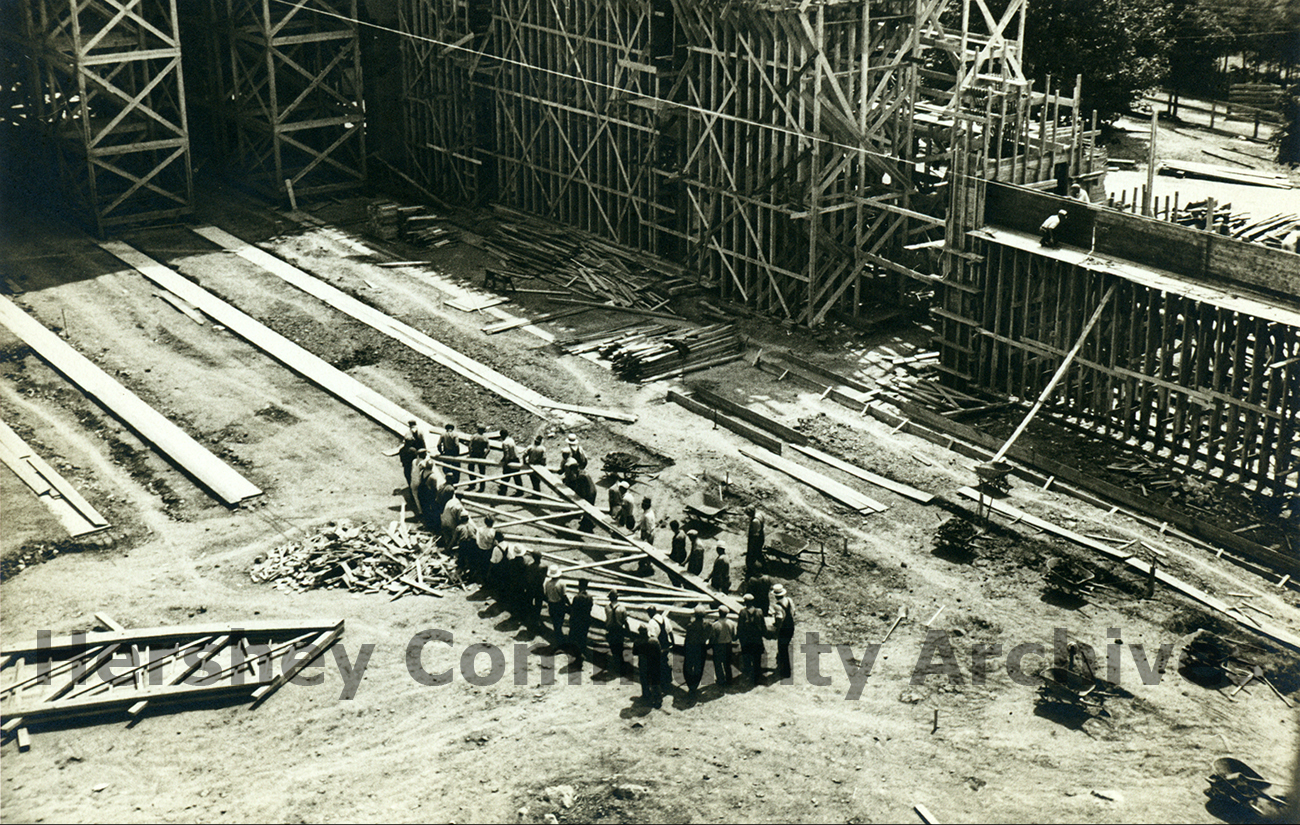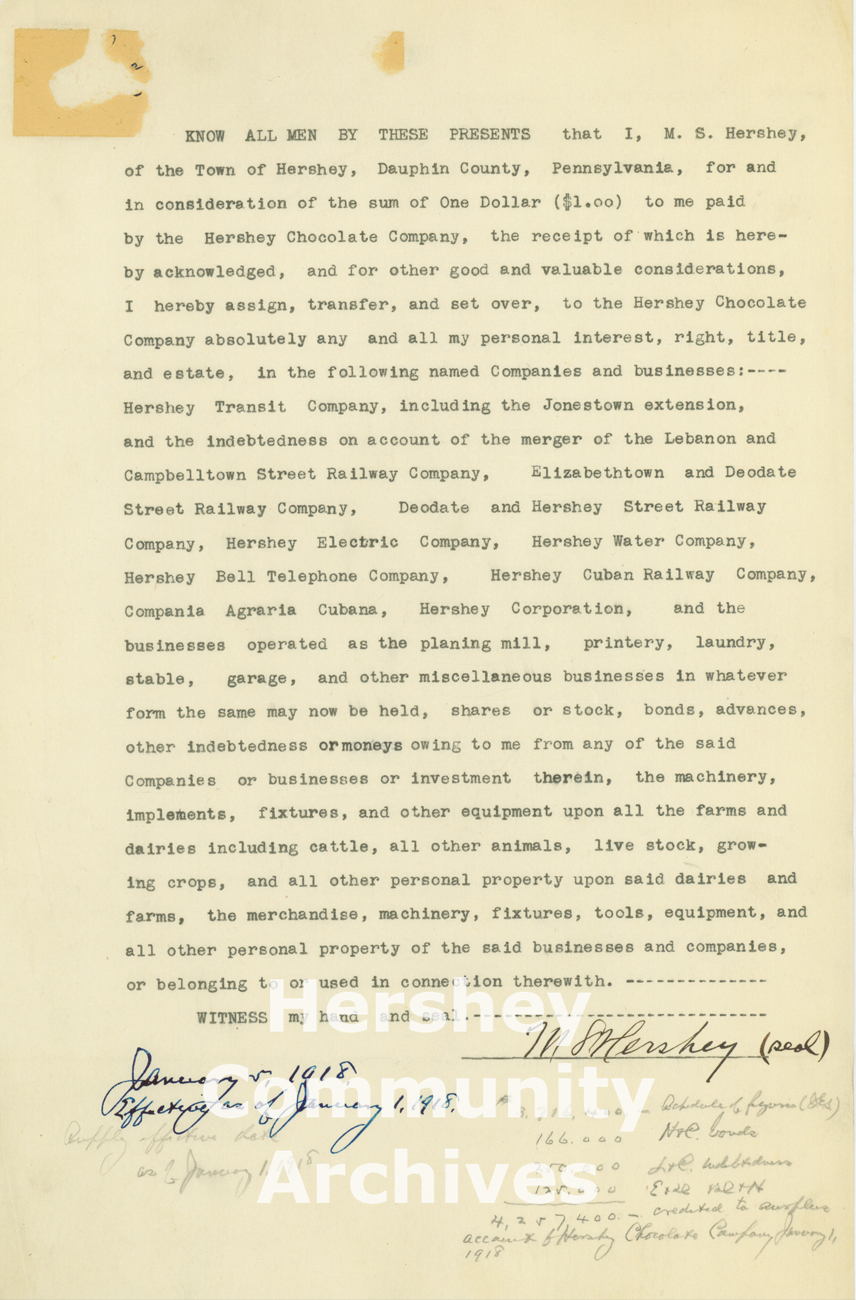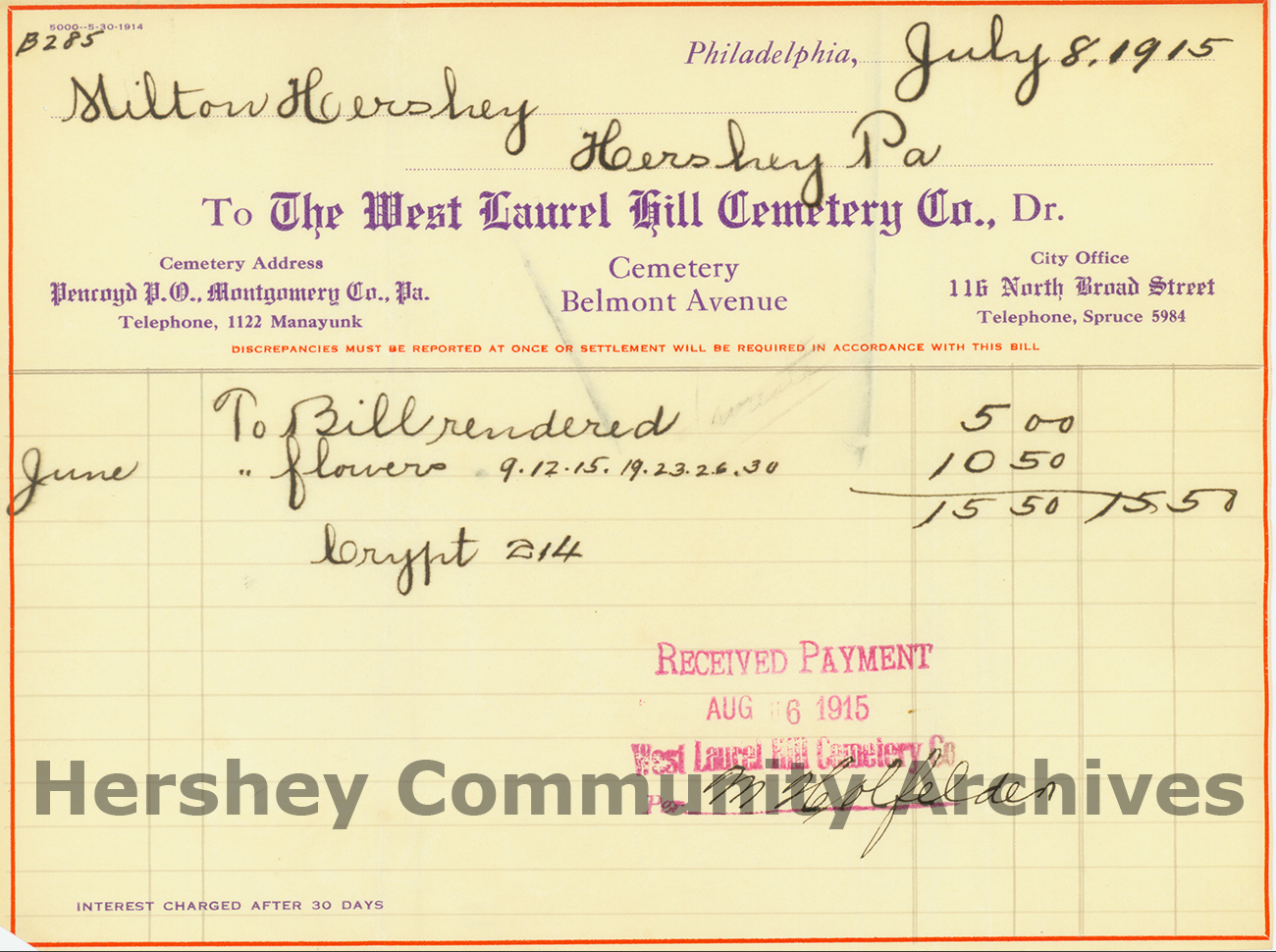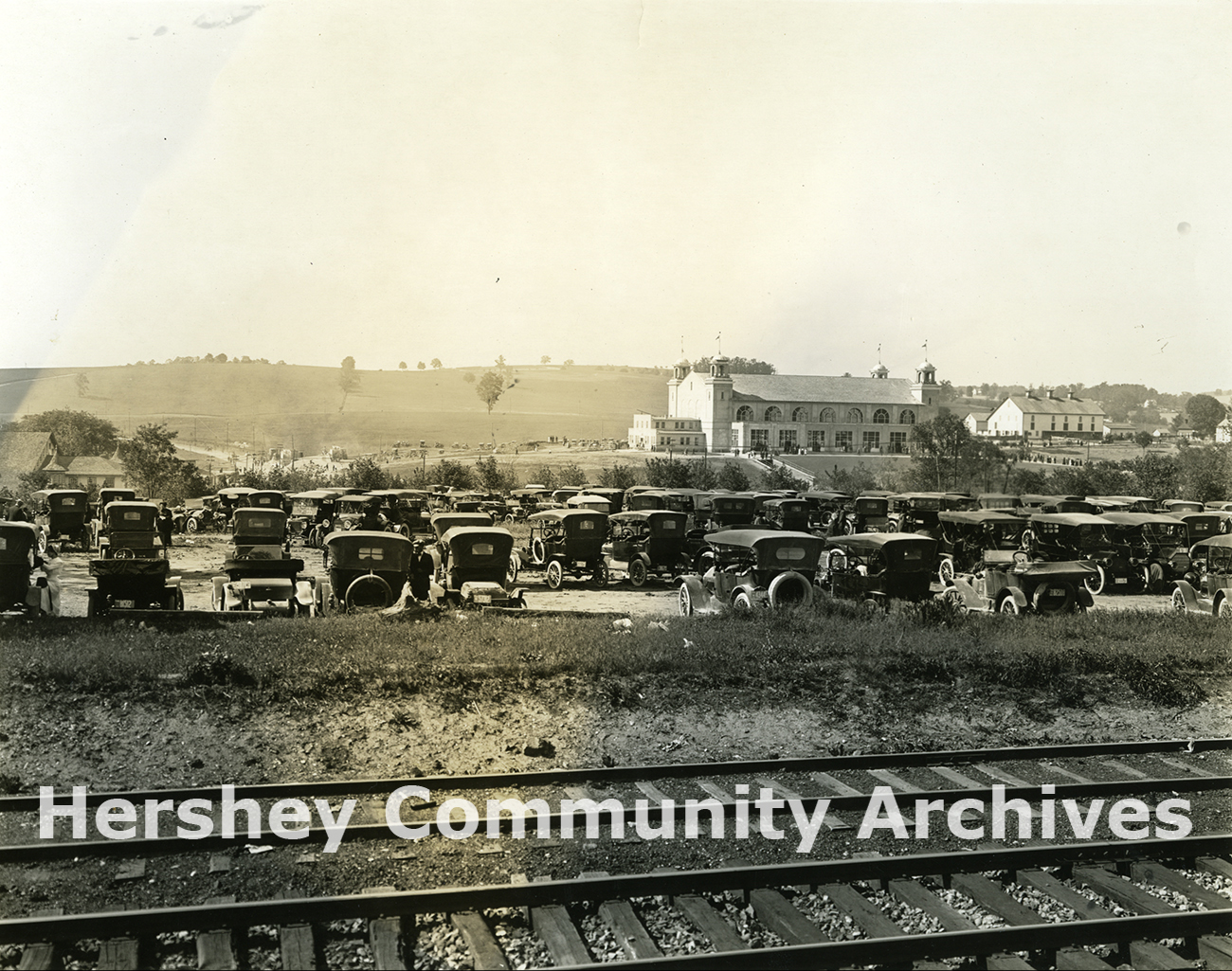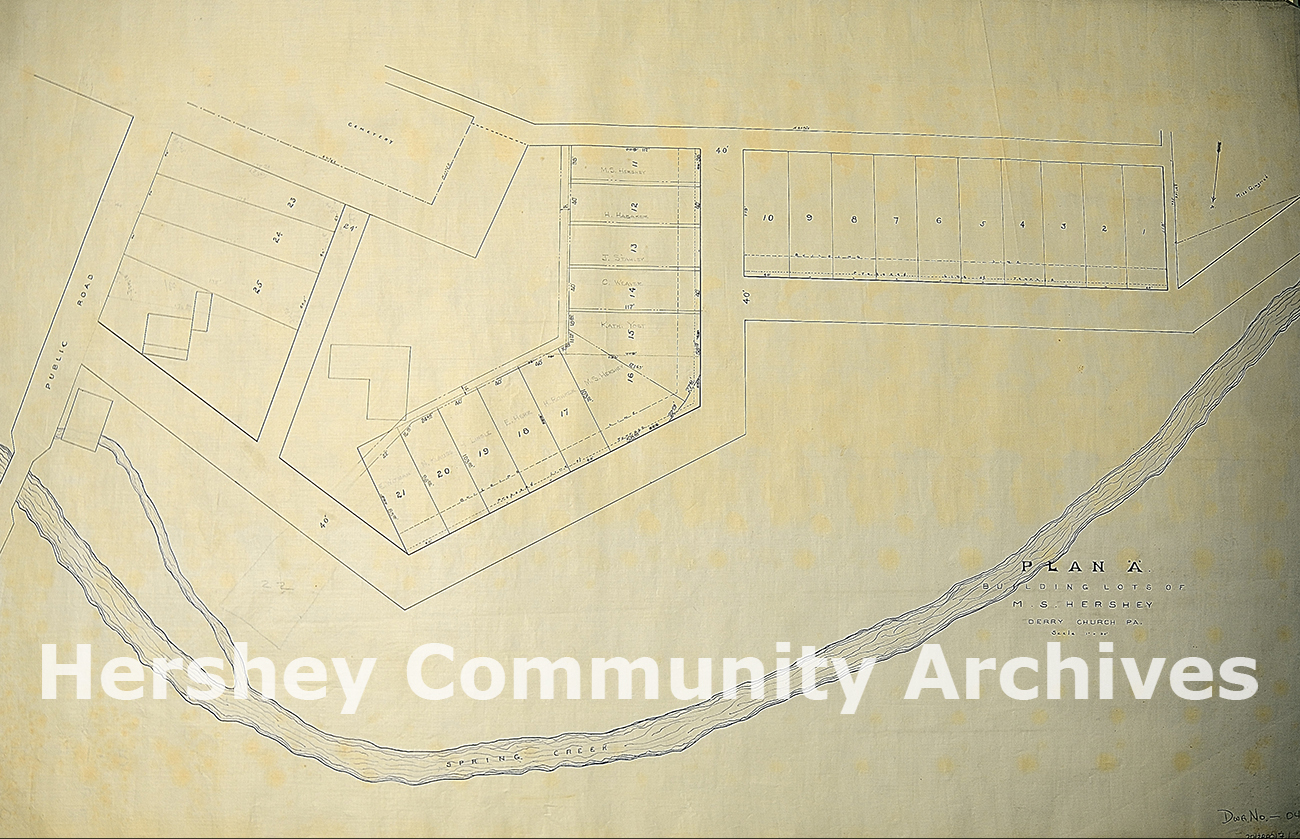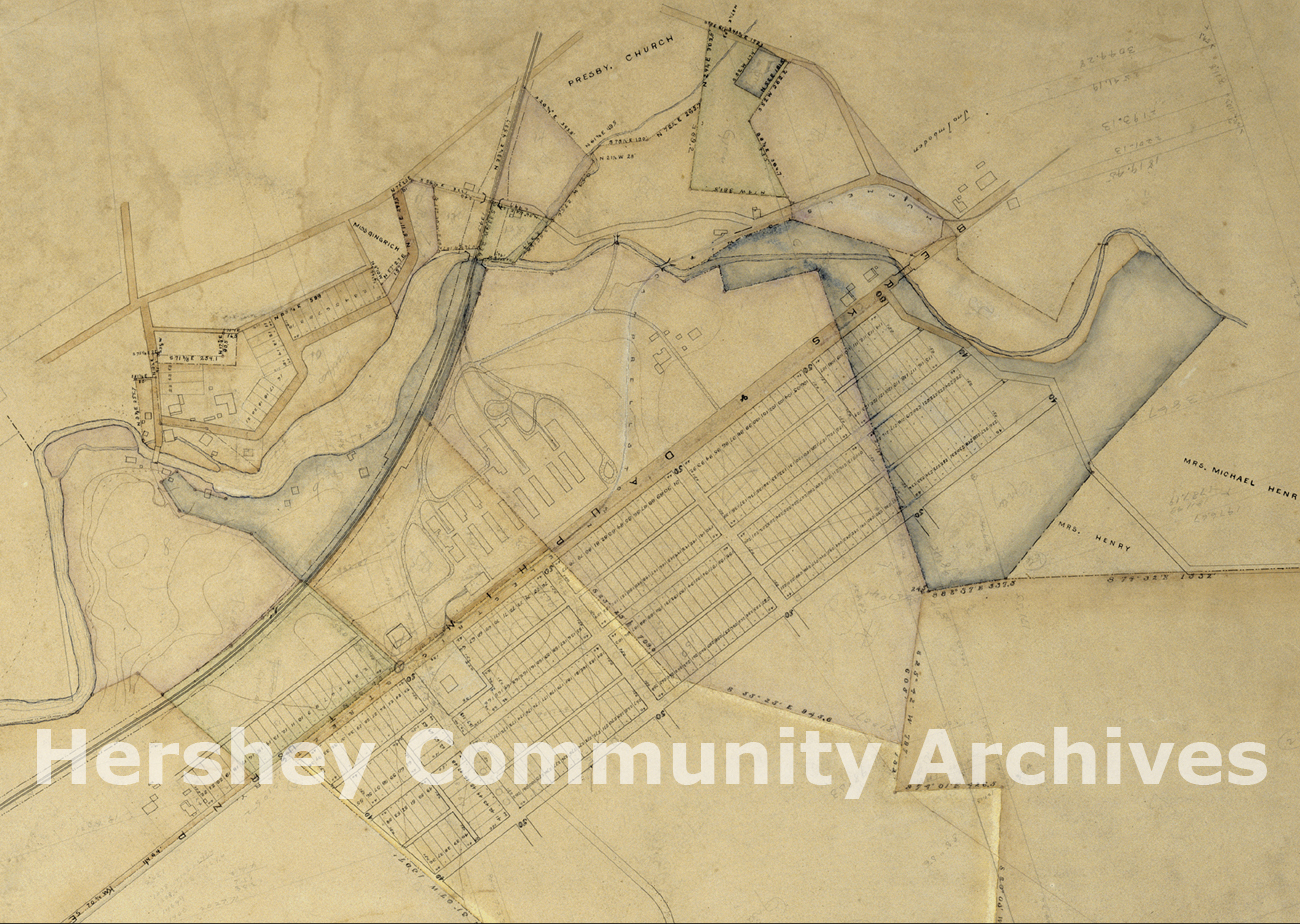A guide to some of the printed and video resources related to Hershey, PA. Books: Berger-Knorr, Lawrence. The Relations of Milton Snavely Hershey. Sunbury Press: New Kingstown, PA, 2006. Brechbill, Joseph A. It Was Kitty’s Idea: A Collection of Facts and Thoughts About the Milton Hershey School. Nappanee, IN: Evangel Press, 2004. Brenner, Joel Glenn. […]
Read More
The origins of the Archives lie in a September 9, 1975 memo from Richard Zimmerman, then Group Vice-President of Hershey Foods Corporation. Zimmerman advocated undertaking a study “by all of the Hershey Interests to identify the types of material which might be retained, probable ways to display and utilize these materials, a designation of […]
Read More
While Hershey’s Milk Chocolate is perhaps The Hershey Company’s most iconic product, perfecting the formula was one of the biggest challenges of Milton Hershey’s career. His interest in chocolate took off when he saw a display of chocolate making equipment at the 1893 Columbian Exposition in Chicago. At the time, he owned the successful Lancaster […]
Read More
Milton Hershey School began as a vision shared by chocolate entrepreneur Milton S. Hershey and his wife, Catherine (Kitty). The Hersheys loved children but were unable to have their own. Instead, they decided to use their wealth to create a home and school for children in need. On November 15, 1909, Milton and Catherine Hershey […]
Read More
One of the most intriguing moments in Milton Hershey’s life was his narrow escape from the sinking of the RMS Titanic. Mr. Hershey originally booked passage on the ill-fated passenger liner, but a last-minute change in plans was most likely a decision that saved his life. In our collection, Hershey Community Archives has the cancelled […]
Read More
Travel Abroad Milton Hershey traveled extensively for pleasure as well as business. As soon as his finances permitted, he began making extended trips to destinations in the United States and abroad. His curiosity took him to museums, cathedrals, theaters and casinos. After his marriage to Kitty travel took on a new significance. Many trips […]
Read More
Planning a model industrial town Milton Hershey planned to build a model industrial town for the workers of his new chocolate factory. Prior to breaking ground for the factory, Milton Hershey had acquired over 1200 acres of land to build a new town. Streets were laid out and named for cacao growing regions. Image: 2003RP081.2 […]
Read More
Search for the Perfect Formula By the early 1890s, Milton Hershey’s Lancaster Caramel Company was an established success. Fortunately, its very success set free Mr. Hershey’s enthusiasm, energy and love of technology to look for a new challenge. He found it at the Columbian Exposition where, in 1893, he had the chance to see a […]
Read More
Image: 4B10811.1 Caption: Milton S. Hershey, 1910 Introduction This articles examines a variety of materials signed by Milton Hershey to explore the man behind the chocolate bar. In fact, Milton Hershey didn’t sign many documents. He preferred to communicate through telephone calls and telegrams. Milton Hershey’s interests and activities were not limited to chocolate. Documents and objects […]
Read More
Introduction Derry Township’s economy before Milton Hershey returned to build his chocolate factory was primarily agricultural, supplemented by a small group of commercial businesses, ranging from grain mills to stone quarries. Milton Hershey had a profound impact on the region. When he broke ground on March 2, 1903 for his new chocolate factory, he also […]
Read More
Introduction Throughout the 19th and early part of the 20th Century there were only a small number of wild animal collections in the United States. Not surprisingly, zoos were big city attractions. The Philadelphia Zoo, Bronx Zoo and Baltimore Zoo all opened during this time period. Milton Hershey believed in providing his town with experiences […]
Read More
Honoring the Founder During most of Milton Hershey’s lifetime, birthday celebrations were a private affair. Sometimes Mr. Hershey hosted a small gathering of friends. Frequently he was traveling in Europe, New York City or Atlantic City, New Jersey during his birthday. That pattern changed when Milton Hershey turned 80 years old. 1937 had been a […]
Read More
Introduction In early 2011 construction began a two year project to straighten the intersection of Cocoa and Chocolate Avenues and build a new bridge over the railroad tracks. As much as we talk about how Hershey has changed since Milton Hershey’s death in 1945, changes to Hershey’s physical landscape were also part of the community […]
Read More
Introduction In early 2011 construction began a two year project to straighten the intersection of Cocoa and Chocolate Avenues and build a new bridge over the railroad tracks. As much as we talk about how Hershey has changed since Milton Hershey’s death in 1945, changes to Hershey’s physical landscape were also part of the community […]
Read More
Introduction In early 2011 construction began a two year project to straighten the intersection of Cocoa and Chocolate Avenues and build a new bridge over the railroad tracks. As much as we talk about how Hershey has changed since Milton Hershey’s death in 1945, changes to Hershey’s physical landscape were also part of the community […]
Read More
Introduction In early 2011 construction began a two year project to straighten the intersection of Cocoa and Chocolate Avenues and build a new bridge over the railroad tracks. As much as we talk about how Hershey has changed since Milton Hershey’s death in 1945, changes to Hershey’s physical landscape were also part of the community […]
Read More
Inspired by chocolate-making machinery he saw at the 1893 World’s Exposition in Chicago, Milton Hershey returned to Lancaster and began experimenting with making chocolate. In 1894, he established the Hershey Chocolate Company and was soon producing over 100 varieties of “sweet chocolate” novelties, bite-size chocolates produced in a variety of shapes and sizes. The term […]
Read More
Throughout its history, Hershey has been a well-known destination for entertainment. After the Hershey Chocolate Factory opened in 1905, the town soon emerged as a popular regional destination. Visitors came to explore the model town and enjoy Hershey Park and its growing number of amenities. In 1914, Hershey’s weekly newspaper, the Hershey Press, announced that […]
Read More
Additional Zoo photographs can be found on the Archives’ Flickr site. The origins of the zoo lie with the story of Franz and Louise Zinner who moved to Lebanon, PA from Weisenberg, Germany in 1899. They became good friends with their neighbors. Their neighbors soon left Lebanon to move to the western part of the United […]
Read More
Many know that Hershey Chocolate Corporation played a key role in supporting the war effort during World War II. Hershey devoted the bulk of its chocolate production to the military. Hershey Chocolate Corporation was also responsible for the development and production of the Ration D bar, a survival ration that provided subsistence calories and nutrition […]
Read More
The Hershey Chocolate factory expanded regularly over its first fifty years. So did the town. Homes, businesses, schools, and recreational facilities needed to be built to keep up with the needs of a growing workforce. In addition, Hershey’s growing reputation as a tourist destination resulted in the need for more amenities to enhance the visitor’s […]
Read More
Cassius Emlen Urban was born in Conestoga Township, Lancaster County, Pennsylvania. After graduating from Lancaster’s Boys High School, he apprenticed as a draftsman at a Scranton architectural firm before returning to Lancaster in 1886. That was the same year Milton Hershey also returned to establish the Lancaster Caramel Company. Like Milton Hershey, Urban’s career quickly took […]
Read More
The Hershey Story Museum is one of several educational and cultural institutions established by Milton Hershey, founder of the Hershey Chocolate Company, during his lifetime between the founding of the Hershey community in 1903 and his death in 1945. Hershey intended to make his community a model town – an interesting and enjoyable place to live, work, and […]
Read More
Milton Hershey was not a person to leave things to chance. As his health began to decline in the 1940s, he knew he must plan for the future leadership of the companies and community he had created. On October 5, 1944 he announced that he was resigning as chair of the Hershey Chocolate, Hershey Trust Company, […]
Read More
When Milton Hershey reorganized his businesses in 1927, he placed all his non-chocolate businesses in a new company, Hershey Estates. Hershey Estates was charged with managing the town and running all the recreational and tourist-oriented attractions. From 1949 to 1962 John B. Sollenberger served as President of Hershey Estates as well as General Manager for […]
Read More
Harry Burnett Reese, founder of the H.B. Reese Candy Company, was born in Frosty Hill, Pennsylvania (York County) on May 24, 1879. In 1900, H.B. Reese married Blanche Edna Hyson, daughter of a well to do family in Bridgeton (York County), Pennsylvania. H.B. and Blanche would eventually have 16 children (8 girls, 8 boys), 13 […]
Read More
Introduction Hershey Chocolate Corporation’s involvement with the production of military ration bars began when Captain Paul Logan, from the office of U.S. Army Quartermaster General, met with William Murrie, President, Hershey Chocolate Corporation and Sam Hinkle, Chief Chemist, in April 1937. This initial visit started the experimental production of a ration bar which was to meet […]
Read More
Introduction Born 1873, William F.R. Murrie started his work career at age 16 as a telegraph apprentice. Despite his rapid advancement to train dispatcher, Murrie soon became bored with railroad life and went to work for Weaver and Costello, a Pittsburgh confectionery firm. Within a couple years Murrie, not yet 23, became the top salesman […]
Read More
Harold Mohler’s years as President and Chief Executive Officer, and then as Chairman of the Board, of Hershey Chocolate comprised a period of unprecedented change and dramatic growth for Hershey. While at the helm, Mohler led the company to diversify into other food and food-related fields and to venture into previously uncharted territory — the […]
Read More
Planning for a community park On a July day in 1944 Milton Hershey invited the Derry Township School Board (Harry L. Erdman, Amos F. Geesaman, William H. Dunbar, III, Dr. Wayne D. Stettler, Clayton C. Gingrich, Howard G. Shelley, Edward Stover and Raymond H. Koch, School Superintendent), to a luncheon at his home in the […]
Read More
Providing for the youth of Derry Township was an enduring passion for Milton Hershey throughout his life. During the Depression he realized that jobs were limited and young men and women just graduating from high school had limited opportunities for employment. In 1935, in response to this need, Milton Hershey established The M.S. Hershey Foundation, […]
Read More
William Henry “Lebbie” Lebkicher, a wizened, string bean of a man, was a native of Lancaster County, Pennsylvania. In 1880 he was working on a farm adjoining one of the Snavely farms in southern Lancaster County. The Snavelys were part of Milton Hershey’s mother’s family. It was through them that Lebbie learned of Milton Hershey’s need for […]
Read More
Milton Hershey started the Lancaster Caramel Company in 1886 after he returned to Lancaster, Pennsylvania following the failure of his New York City candy business. The Lancaster business would be his third confectionery venture. The new business was first located in Jacob Gable’s big warehouse on the west side of South Duke Street near Vine […]
Read More
Additional photographs of Hotel Hershey can be found on the Archives’ Flickr site. Introduction Sitting high on Pat’s Hill overlooking the town of Hershey and the beautiful Lebanon Valley, Hotel Hershey is often referred to as the jewel in the crown of attractions and amenities that Milton Hershey created for his model community. The Hotel was […]
Read More
The Early Years Samuel Hinkle graduated from the Pennsylvania State University in 1922 with a degree in industrial (now chemical) engineering. Following two unsatisfactory industrial laboratory jobs in Canada, he returned to Lancaster County, Pennsylvania. Hinkle contacted the Academic Department at Penn State and was referred to a job opening at the Hershey Chocolate Company. […]
Read More
On May 25, 1898, Milton Hershey married Catherine Sweeney of Jamestown, NY in the rectory of St. Patrick’s Cathedral in New York City. He was 41 and she 26. Following the wedding they returned to Lancaster, PA where Mr. Hershey owned a highly successful confectionery business. When Milton Hershey decided to move his chocolate business to Derry Church, […]
Read More
Since the United States Army turned to Hershey for help in developing its survival Field Ration D bar, it was only natural that in 1943, the Procurement Division of the United States Army approached Hershey Chocolate Corporation about the possibility of developing a heat resistant confectionery chocolate bar with an improved flavor. After a short period […]
Read More
Hershey Chocolate Company first began producing chocolate syrup for commercial use in 1926. However work on a formula for syrup had begun a few years earlier. There was an experimental kitchen at the old Hershey Industrial School (today Milton Hershey School). Chance Phillips, a long time employee began working for Hershey Chocolate in 1914 recalled that […]
Read More
Introduced in 1925, Mr. Goodbar was Hershey’s first new bar in almost twenty years. Hershey’s Milk Chocolate with Almonds had been introduced in 1908. The man responsible for developing the formula for Mr. Goodbar, Samuel Hinkle, graduated from the Pennsylvania State University in 1922 with a degree in industrial (now chemical) engineering. Following two unsatisfactory industrial […]
Read More
Milton Hershey, did not like to have anything go to waste. Around 1936, he decided to make cocoa butter soap as a way of dealing with the million pounds of surplus cocoa butter created by the factory each year. This surplus came from floor scrapings, product and cocoa shells. Hershey Estates was selected to produce the soap […]
Read More
Introduction Hershey Chocolate Company manufactured chewing gum between 1915 and 1924. The gum was first introduced under the name “Easy Chew.” Clayton Snavely, Milton Hershey’s cousin and the man put in charge of developing the chewing gum business, was interviewed in 1954 and related the story of how Hershey Chocolate got into the chewing gum business. About […]
Read More
Hershey’s Bon Bons were one of the Hershey Chocolate Company’s earliest products. They appear on a ca. 1900 Saleman’s wholesale price list. They were listed under Hershey Chocolate “Fancy Shapes” as Vanilla Chocolate Bon Bons. Bon Bons were small solid pieces of chocolate molded in flower shapes. In each package pieces were packed in a […]
Read More
Hersheypark has been home to three different carrousels or merry-go-rounds over the years. Hershey Park’s first carrousel began operating in 1908. One of Hershey Chocolate’s salesmen, who had seen one while out traveling on business, thought the Park should have one. He also knew where the Park could buy a good secondhand machine. He told […]
Read More
Fun houses are an old amusement park tradition dating back to the turn of the 20th century. As fun houses developed they followed two design approaches: active and walk-through. In an “active” fun house, guests could experience the different attractions within the fun house repeatedly. Patrons could stay as long as they wanted, moving from […]
Read More
Origins Milton Hershey recognized that opportunities for recreation would be critical to the success of his planned model town. As he laid out his model industrial town, Milton Hershey set aside 150 acres of land for a park. The land was located to the north of the town and chocolate factory. Hershey Park was developed while […]
Read More
Veronica “Fanny” Snavely Hershey – 9/4/1835 – 3/11/1920 “Fanny,” whose formal name was Veronica after her great-grandmother, was born September 4, 1835, the daughter of Abraham Snavely (1787-1866) and Elizabeth (Buckwalter) Snavely. Fanny’s father, a Reformed Mennonite clergyman, had been confirmed bishop in 1830. Bishop Abraham was a wealthy man for his day. Milton Hershey […]
Read More
Milton Hershey’s success as a candy maker came only after several years of struggle and two failed attempts to establish a candy business. After Milton Hershey completed his apprenticeship with Lancaster confectioner, Joseph Royer, he wanted to open his own candy shop. Not wanting to compete with his teacher, Hershey traveled to Philadelphia in May […]
Read More
Introduction In the early 1900s, Milton S. Hershey made one of the great American fortunes through dogged persistence and the courage to pursue a dream. Though he was modest and unassuming in appearance, Milton Hershey was a shrewd and determined businessman. He had a genius for timing and an instinctive ability to choose loyal and […]
Read More
Born January 4, 1829 at The Homestead, Henry Hershey was the oldest of seven children, six of whom survived to adulthood. His parents were Jacob and Nancy (Hershey) Hershey. This is the family roster: Henry (1829-1904), Joseph (1830-1855), Elizabeth (1832-1903), Christian (1836- ? ), Jacob (1938-1887), and Elias (1841-1925). Little Isaac (1846-1848) died before he was two […]
Read More
Additional photographs of Catherine Hershey can be found at the Archives’ Flickr site: http://www.flickr.com/photos/26307193@N02/sets/ Picture it. A young, working-class girl from western New York state meets a rich Lancaster, PA businessman fourteen years her senior at the turn of the 20th century. They fall in love, get married, and settle in the rich farmlands of central Pennsylvania. […]
Read More
Introduction In early 1903, while he made plans to break ground for his chocolate factory in a field near the tiny community of Derry Church, Pennsylvania, Milton Hershey thought about the needs of his future workers. He had the foresight to recognize that if his chocolate making idea was to work for the benefit of all, he […]
Read More
Origins of Hershey Theatre In 1915, Hershey had his architect, C. Emlen Urban, draw up plans for a new community building. As Urban drew up plans for the building, the architect engaged the design services of Tiffany Studios to develop plans for the Theatre’s interior design. The building was to include two theaters, a dining […]
Read More
Hershey Stadium was the last major project of Hershey’s Great Building Campaign of the 1930s. Hershey’s construction program during the Great Depression provided 600 construction jobs and helped protect Hershey from the country’s economic collapse. Hershey Stadium was completed in the Spring of 1939. It was intended to provide a venue for college, professional, and […]
Read More
Landscaping and beautification of grounds and property was always a priority for Milton and Catherine Hershey. Mr. Hershey strongly believed in giving his people a beautiful place to live, and he was very fond of flowers and all types of plants. The gardens at his home, High Point, were well planned and beautiful. There was beautiful […]
Read More
Introduction When Milton Hershey decided to build a new chocolate factory he also decided to build a model town to house his workers and support his business. His model town included comfortable homes, an inexpensive public transportation system, a quality public school system, and extensive recreational and cultural opportunities. Under the umbrella of the Hershey […]
Read More
Building designed by C. Emlen Urban, noted Lancaster architect, responsible for designing many of Hershey’s major structures, including the original factory and offices, Cocoa House, Hershey Trust Company building, the Convention Hall, High Point and the Community Building. Construction of the Press Building was described in the 11/4/1915 issue of the Hershey Press. It was one of the principal projects of […]
Read More
When founding the community of Hershey, Milton Hershey planned for most of the necessities and amenities needed to serve its residents. He provided for the community’s housing, schools, recreation and transportation. One service he didn’t immediately establish was for the dead. Hershey had no cemetery. Most of the Derry Township’s churches maintained graveyards, but for […]
Read More
Hershey Sports Arena is a testament to Milton Hershey’s love of risk-taking and for innovative ideas. Its engineering significance and the story of its construction are a fascinating part of Hershey’s history. Residents of Hershey have been enthusiasts of hockey for years. Its popularity in its early years brought large crowds to the old Ice Palace. […]
Read More
It is not every day that a small town in rural Pennsylvania gets to honor a president, and not just any president, but a beloved war hero. On October 13, 1953, the people of Hershey got to do just that, when Hershey hosted a 63rd birthday party for sitting President Dwight D. Eisenhower, sponsored by the […]
Read More
The first time William E. Dearden came to Hershey was in 1935. He was 13 years old and it was the Depression. Dearden’s mother had recently died and his father was struggling to care for his three children while he was frequently unemployed. Acting on the advice of a Philadelphia neighbor, his father enrolled Dearden and his […]
Read More
Milton Hershey first visited Cuba in January 1916. It is said that he fell in love with the country at first sight. It was a country of eternal spring, where the inhabitants found it hot if the temperature went up over eighty degrees and cold if it dropped to seventy. Hershey was excited by the […]
Read More
Shortly after Milton Hershey started his chocolate company he began searching for a trademark design that would reflect the promise of his new business. The first logo that he used was an intertwined ‘H’, ‘C’, and ‘Co.’ Unfortunately, this monogram wasn’t very distinctive and it was soon replaced by a design that would represent the […]
Read More
The Cocoa Bean Game began in 1943 as a community service project of the Rotary Club of Hershey and the Hershey Civic Club. The local football teams of Hershey High School and the Hershey Industrial School [now known as the Milton Hershey School] wanted to play each other. Ralph Hoar, then head of athletics for […]
Read More
During World War I, the United States government promoted community gardens to supplement and expand the domestic food supply. In 1917 Hershey responded by setting aside six acres of ground in East Hershey [east of Homestead Road, probably bounded on the south by Areba Avenue] for a community farm. Rohrer Snavely was placed in charge. […]
Read More
In 1903, when Milton Hershey broke ground for the Hershey Chocolate factory in Derry Township his plans far exceeded the construction of one building. Mr. Hershey envisioned the development of a new community; a community that featured modern facilities and residences with the objective of being an “ideal twentieth century town.” [i] Hershey Improvement Company, […]
Read More
Landscaping and beautification of grounds and property was always a priority for Milton and Catherine Hershey. The community of Hershey was noted for its extensive garden beds, as well as the lush lawns and trees that were planted throughout Hershey. Catherine Hershey took particular responsibility for the gardens surrounding their home, High Point, personally supervising the placement and […]
Read More
While the Archives is best known for managing the archival records of Milton Hershey’s corporations, we also collect and care for the records of many individuals and local organizations. The finding aids for these collections are available online on the Archives’ website: Hershey Archives. These collections contain a wealth of materials documenting many different aspects of […]
Read More
Milton Hershey passed away on October 13, 1945 in Hershey Hospital. While he had placed the bulk of his fortune into a trust for the Milton Hershey School in 1918, his continued financial success during the rest of his life created an estate valued at almost $900,000. Mr. Hershey’s will directed that his estate be used to create another […]
Read More
Well, our anniversary year has past, but we have one more story to share that highlights the Archives’ oral history collection. Enjoy! West Hershey, The Hershey Company’s manufacturing facility located on the west end of Hershey, Pennsylvania, began operating in 1993. However, the need for the facility was first recognized in the 1970s. Richard A. Zimmerman, who […]
Read More
It is an advertising industry legend that Hershey Chocolate did not advertise. The advertising industry marveled at Hershey’s success without the use of advertising. During the company’s first fifty years, Hershey Chocolate succeeded without media advertising because it had few competitors in the solid chocolate confectionery market. The image of Hershey as a company that […]
Read More
Occasionally, someone asks: “What is the oldest item in the archival collection?” But no one has asked, “What is the most contemporary item in the collection?” Researchers often equate archives with pre-twentieth century materials such as handwritten deeds or manuscripts written on parchment. However, Hershey Community Archives’ collections are largely comprised of twentieth century records and, increasingly, […]
Read More
Hershey began offering tours of its chocolate factory shortly after the factory opened. By 1915, visitors could register for a tour at the town’s Visitor Bureau, located in the Cocoa House, on Chocolate Avenue. In 1928, the factory began keeping formal statistics about factory tours. A factory tour was a popular part of a visit to Hershey. […]
Read More
Each year millions of people visit Hershey, drawn by Hershey’s many attractions, including its streetlights. Seriously! Hershey’s streetlights are unique. The lights along Chocolate Avenue, Hershey’s main street, are shaped like wrapped and unwrapped Hershey’s Kisses Chocolates. They’ve been a part of the community’s landscape since 1963, when Hershey Chocolate Corporation president, Samuel Hinkle, suggested that […]
Read More
In 1921, Milton Hershey hired Percy Alexander (P.A.) Staples to manage his Cuban operations. For the next 23 years Staples resided in Cuba. As part of his work, he became very knowledgeable about Cuba — not only its sugar industry, but also with its people, culture, economy, and politics. In 1944, Milton Hershey selected Staples […]
Read More
In the 1920s, American households had a new choice in home entertainment—the radio. The first commercial radio station was established in 1920 and by 1922 over 600 stations were on the air. Radio programs in a variety of formats and genres were broadcast including radio plays, variety shows, news, and interview programs. One such program […]
Read More
While most confectionery companies regard other candy-making businesses as their competitor, Milton Hershey was different. Hershey Chocolate limited its definition of a confectionery competitor to those businesses that produced solid chocolate bars. In fact, Hershey Chocolate sold chocolate to a wide range of companies manufacturing enrobed, or chocolate-coated, candy. Harry Burnett “H.B.”Reese, a one-time employee […]
Read More
Milton Hershey, unlike his contemporary Henry Ford, never wrote a memoir and did not court attention from the public or the press. Hershey was rarely interviewed and as he preferred to communicate via telephone and telegraph rather than through letters or memorandums he leaves little of a paper-trail. So without an extensive written record […]
Read More
The Archives’ collections are a rich resource for understanding not just Milton Hershey and his legacy but also for the growth and development of the Hershey community. The Archives actively collections the records of local businesses and organizations to preserve the history of the community and its residents. Milton Hershey took an active interest in everything that […]
Read More
When the United States Army needed a food product that would serve as a survival ration for soldiers in combat situations, they turned to the Hershey Chocolate Corporation. In the spring of 1937, Captain Paul Logan, from the office of U.S. Army Quartermaster General, met with William Murrie, President, Hershey Chocolate Corporation and Sam Hinkle, Chief Chemist. […]
Read More
Consumers associate a trademark with their experiences with the quality of the product or service the trademark represents. Milton Hershey prided himself on manufacturing quality products believing quality was “the best advertising in the world.” Hershey Chocolate Company trademarks and trade dress were consistent across the product line so a Hershey’s Milk Chocolate bar was […]
Read More
While he did not make use of print or radio media advertising, Milton Hershey was interested in promoting his model town and its amenities and attractions. He believed that the town and the chocolate business were intertwined and promoting one benefited the other. Milton Hershey was an innovator and was inspired by new ideas and […]
Read More
Hershey Bears hockey fans were disappointed their Bears did not advance in the Calder Cup tournament this year, but Bears fans know their team is a team of champions. Milton Hershey recognized hockey’s popularity in early 1931, constructed an ice rink, sponsored a team, and by 1936 built a new sports arena with a seating […]
Read More
From 1903 until his death in 1945, Milton Hershey was committed to creating an exemplary model industrial town for his workers and their families. Historically, model industrial towns featured housing and an infrastructure built and maintained by a company and inhabited by the company’s workers. Milton Hershey’s vision for his model town was broader and he created […]
Read More
Hershey’s first golf course opened in 1909. Located along Chocolate Avenue, the 9-hole golf course was built near Milton Hershey’s home, High Point. However, the chocolate factory’s continual eastward development encroached on the golf course, shrinking its size to 5 or 6 holes. Local golfers were forced to go to Harrisburg or Lebanon to play […]
Read More
On November 15, 1909, Milton and Catherine Hershey signed a deed of trust establishing Hershey Industrial School (now Milton Hershey School). Approximately 486 acres of land were transferred to the School together with all assets contained on the property. All income, revenue, and rents derived from the property were to be used to support and maintain […]
Read More
Catherine Sweeney Hershey died on March 25, 1915. Kitty, as she was affectionately known, and Milton Hershey shared a brief 18 years together before her death. A bachelor at the age of 40, Milton met the 26 year-old Kitty while on a sales call in Jamestown, New York. Something about Kitty must have instantly charmed […]
Read More
Within five years of Hershey Park’s official opening additional attractions were introduced in the Park to supplement and enhance the guest experience. An amphitheatre, bandstand, dance hall, photograph gallery, and bowling alley were part of the Park’s expansion; and in 1910, Hershey Zoo. Franz and Louise Zinner, who moved to Lebanon, Pennsylvania from Heisenberg, Germany […]
Read More
Throughout its history, Hershey has been a well-known destination for entertainment. After the Hershey Chocolate Factory opened in 1905, the town soon emerged as a popular regional destination. Visitors came to explore the model town and enjoy Hershey Park and its growing number of amenities. In 1914, Hershey’s weekly newspaper, The Hershey Press, announced that a […]
Read More
By the late 1890s, Milton Hershey was convinced that his future lay in producing chocolate rather than caramels. In 1900, the same year Hershey introduced Hershey’s Milk Chocolate, he sold his Lancaster Caramel Company to competitors for $1 million to devote all his energies to his quickly expanding chocolate business. By 1902 it was obvious that a new, […]
Read More

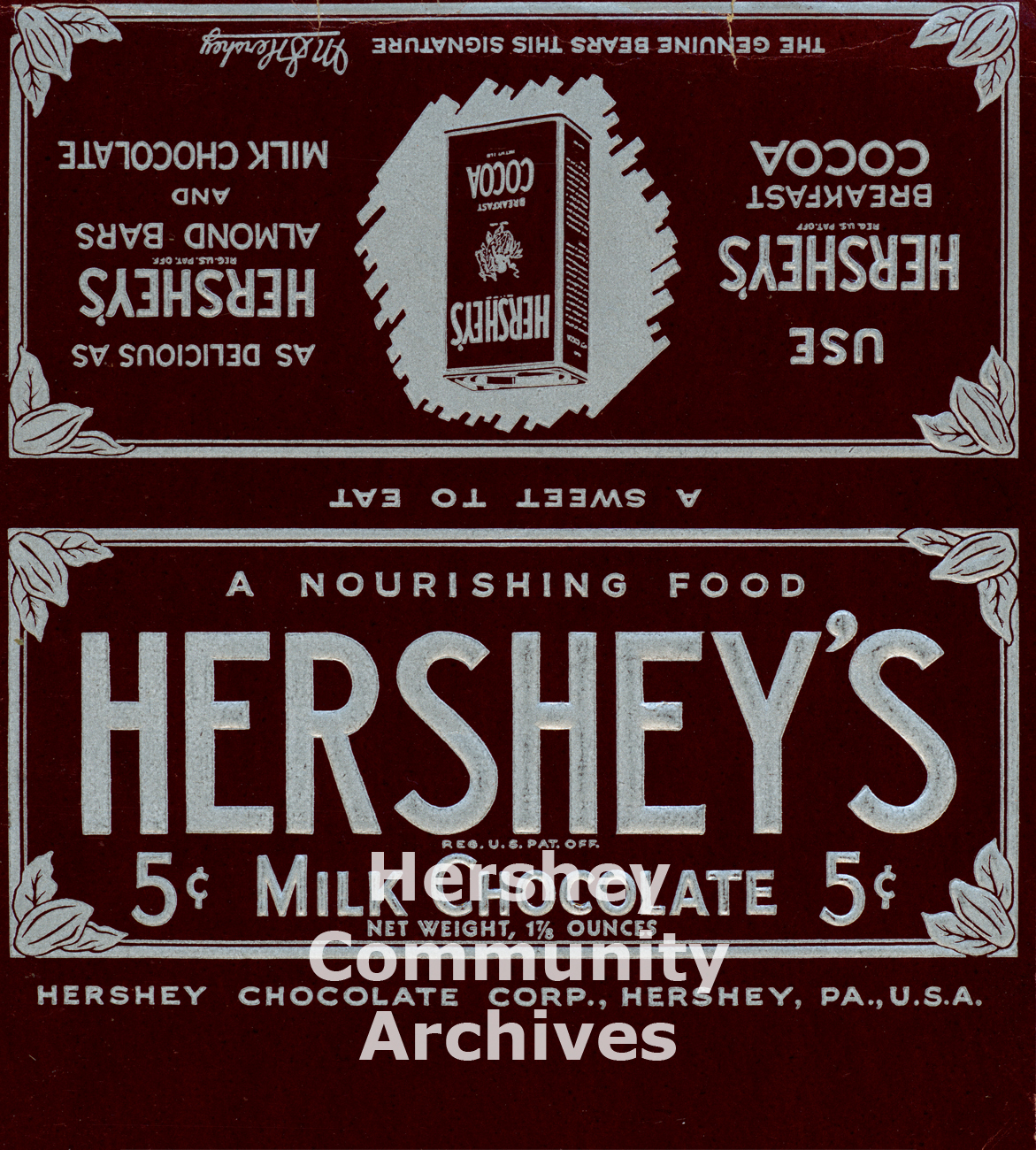
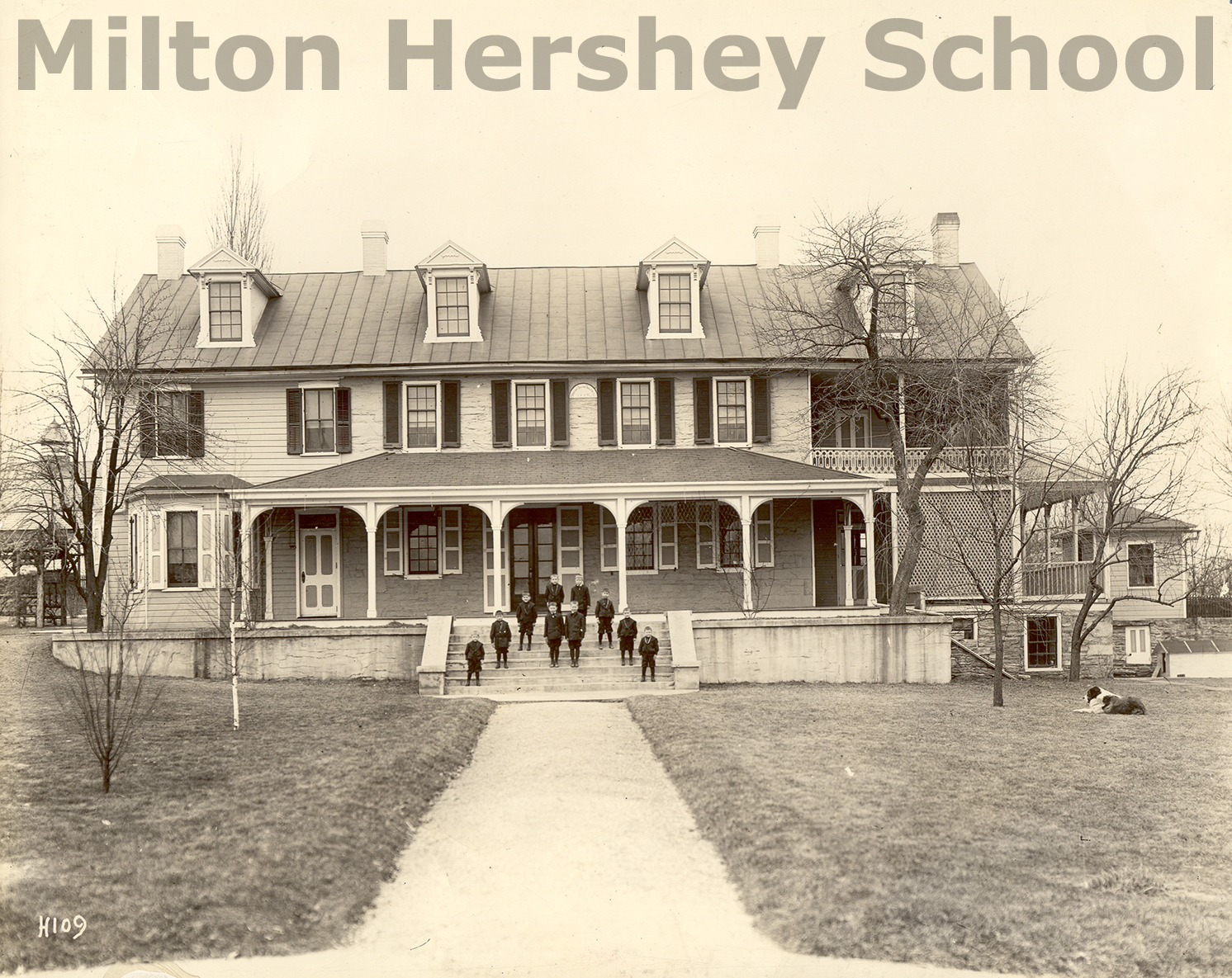
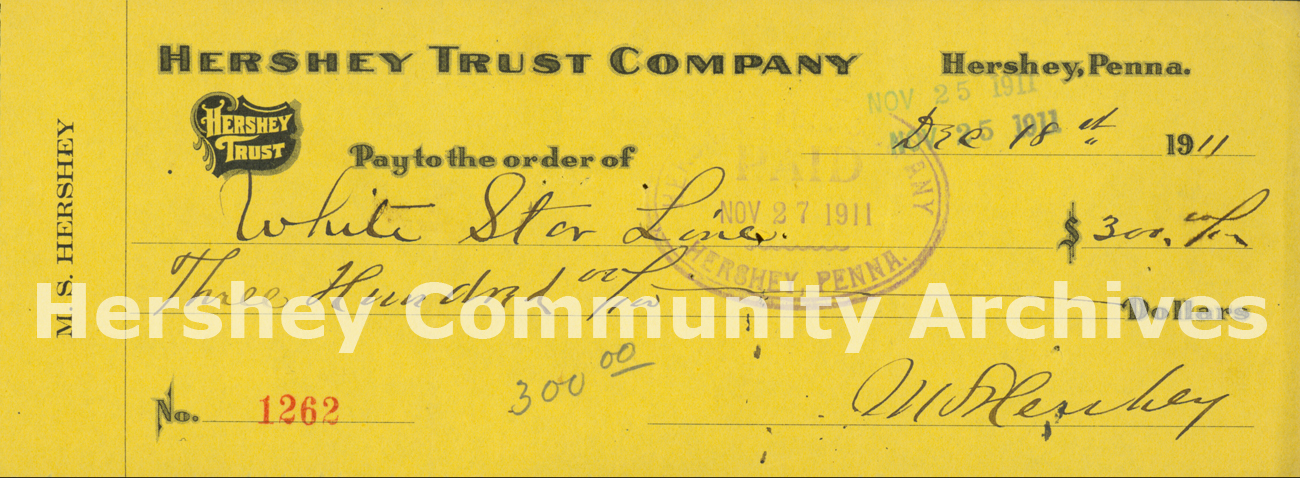
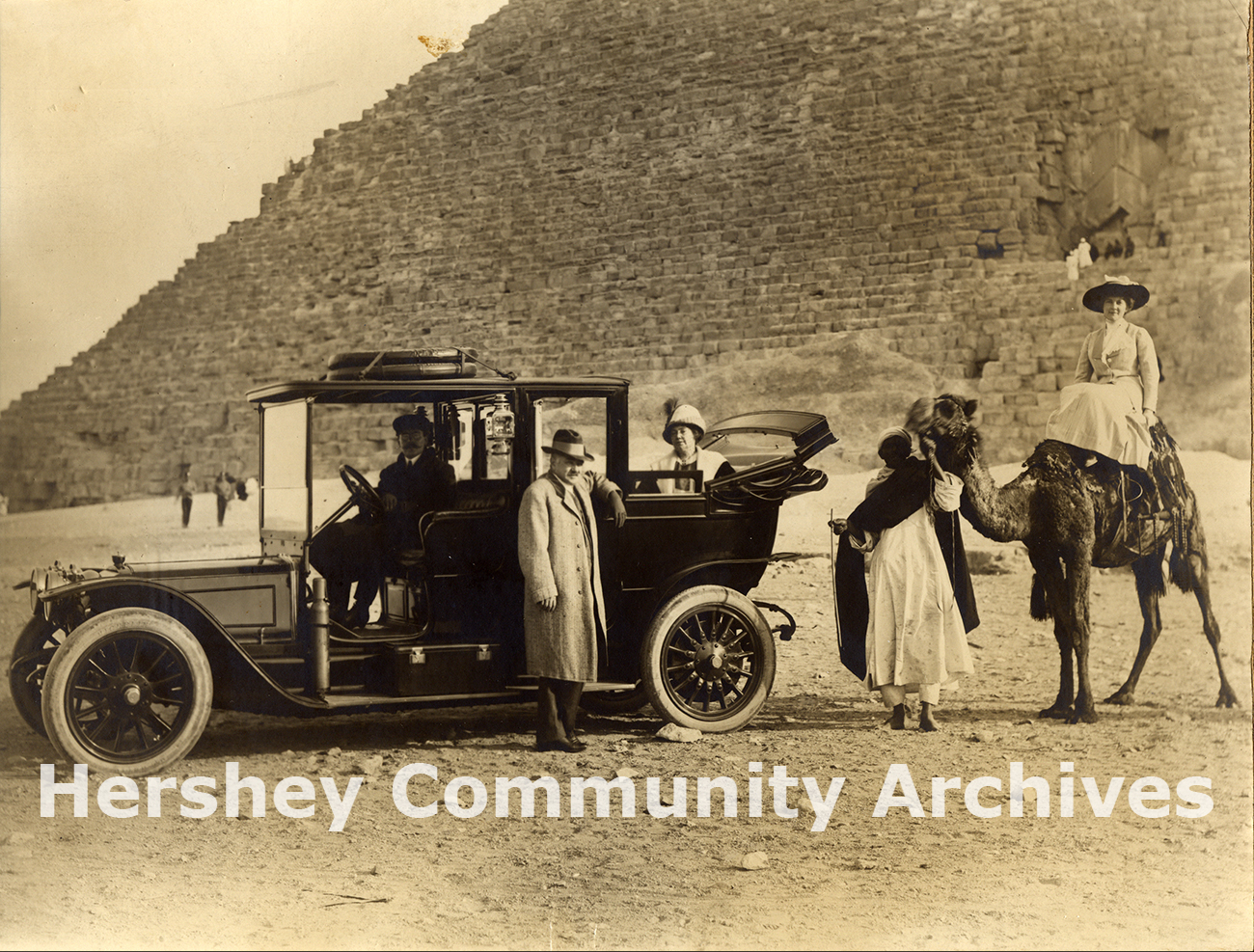

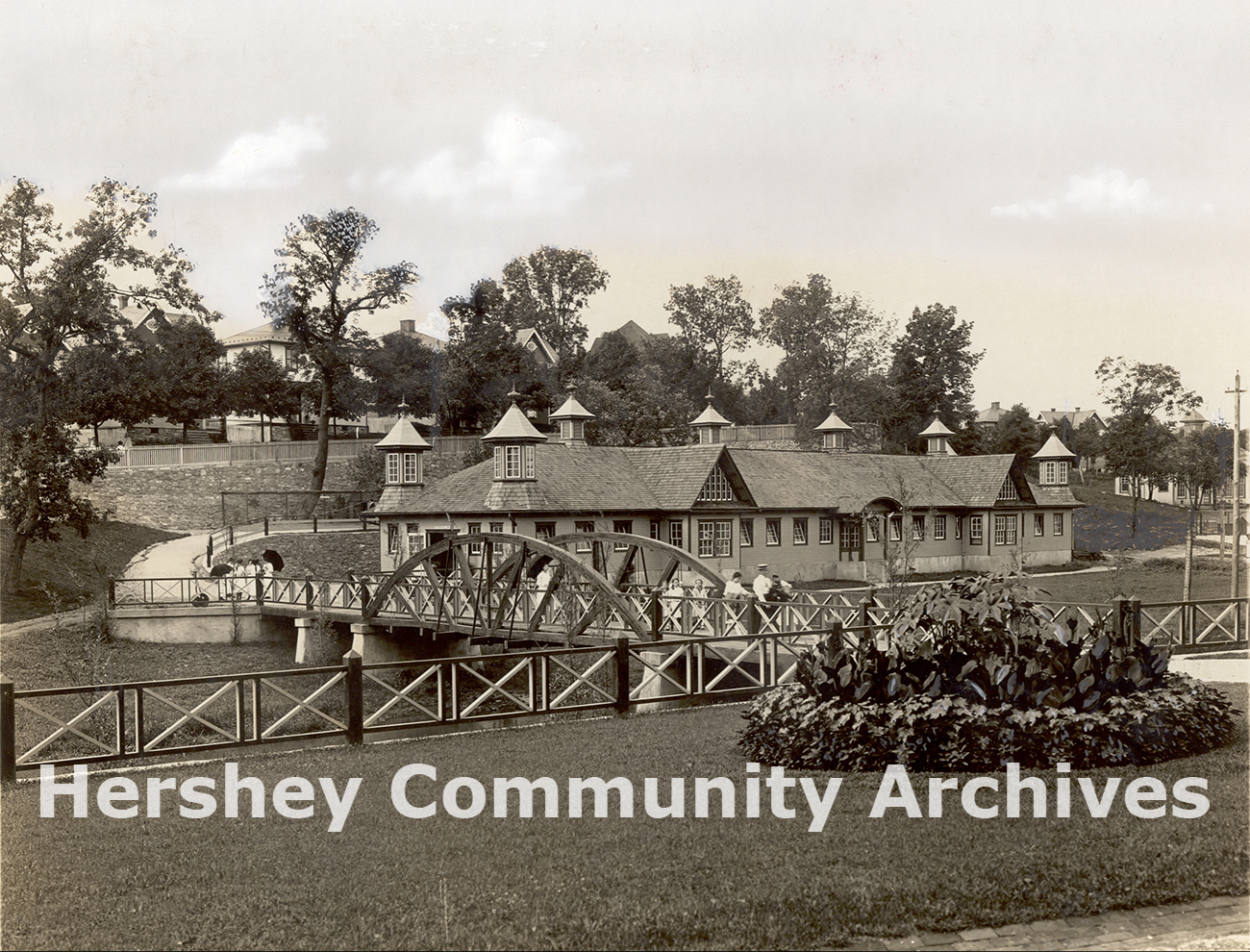
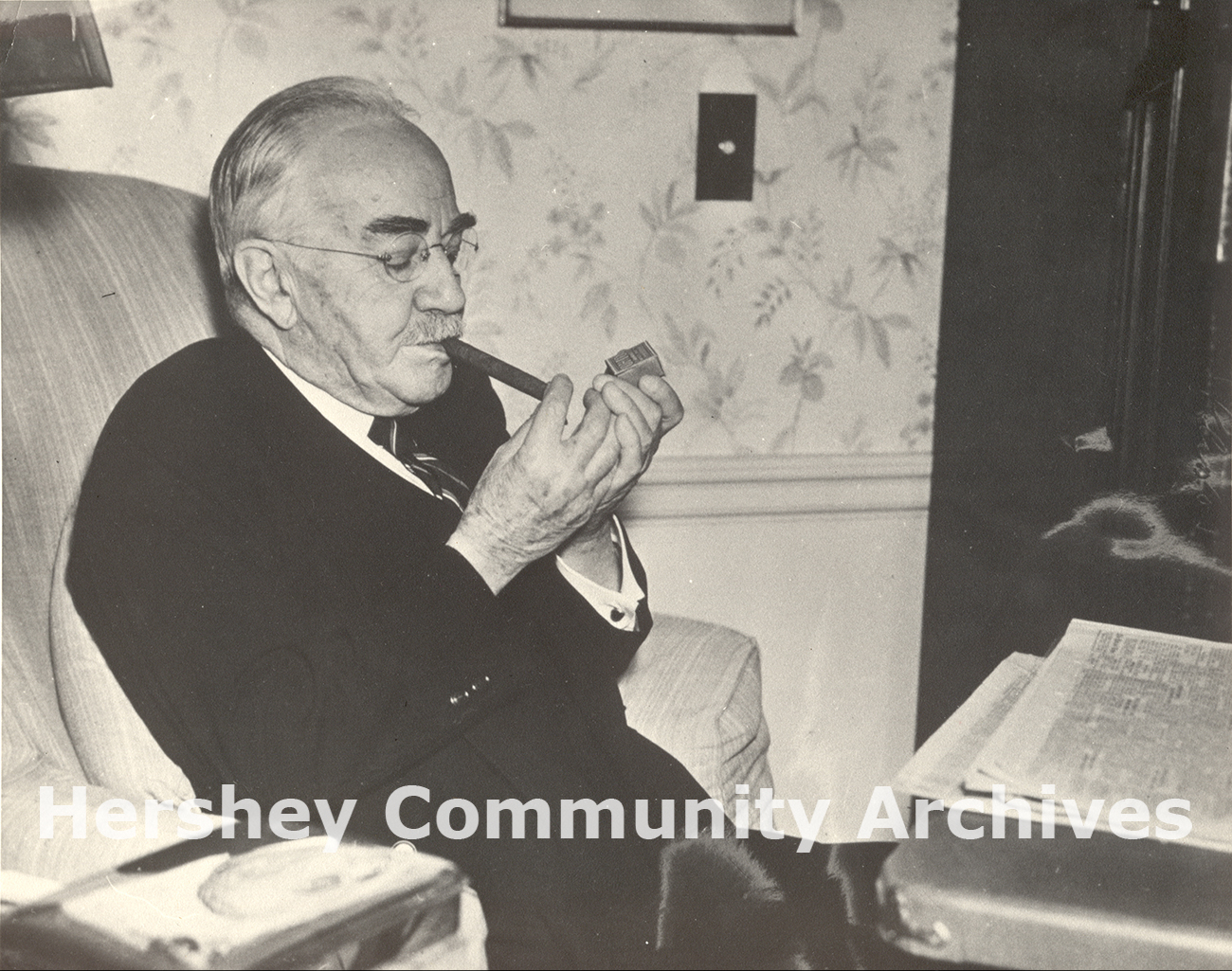
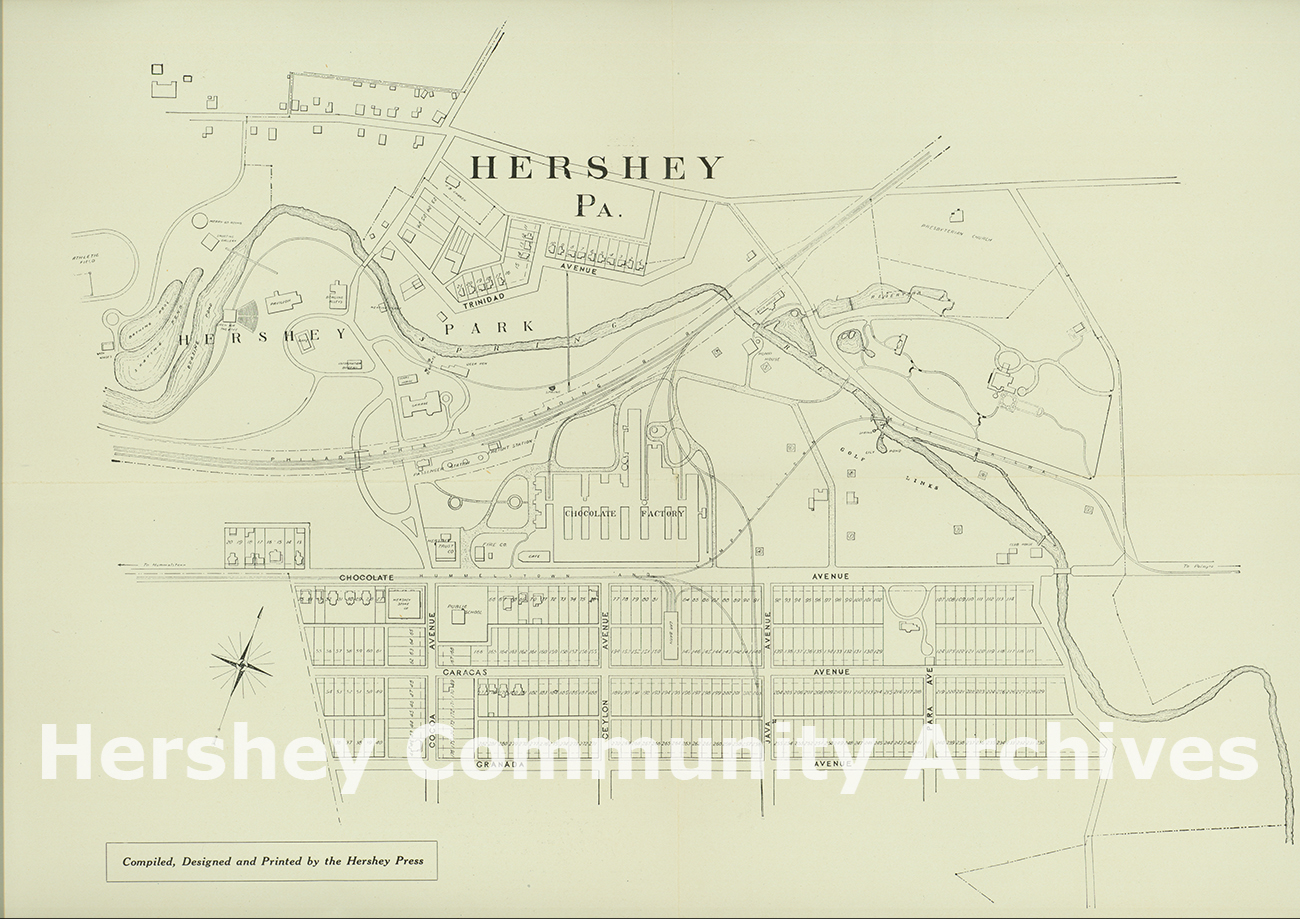
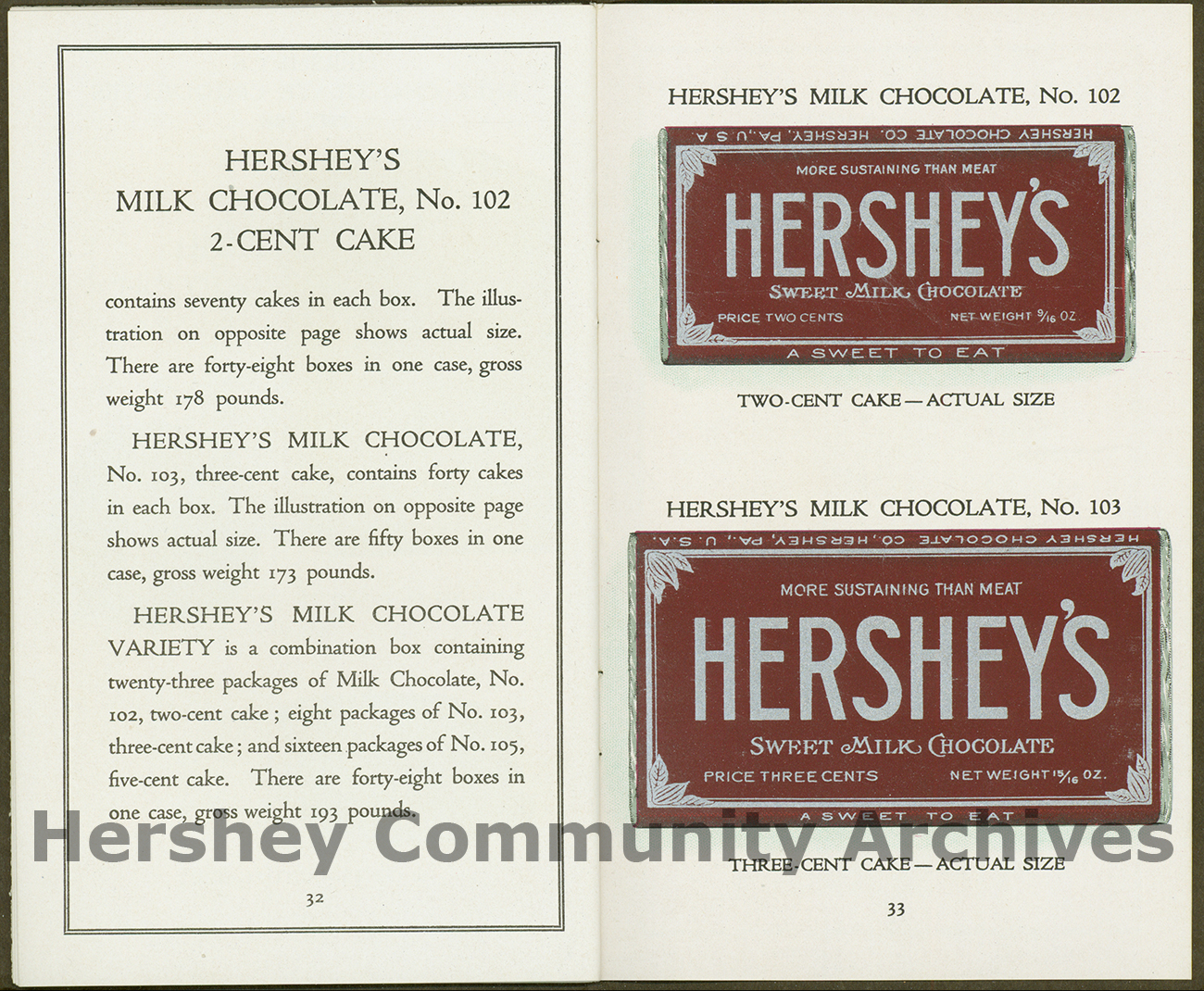
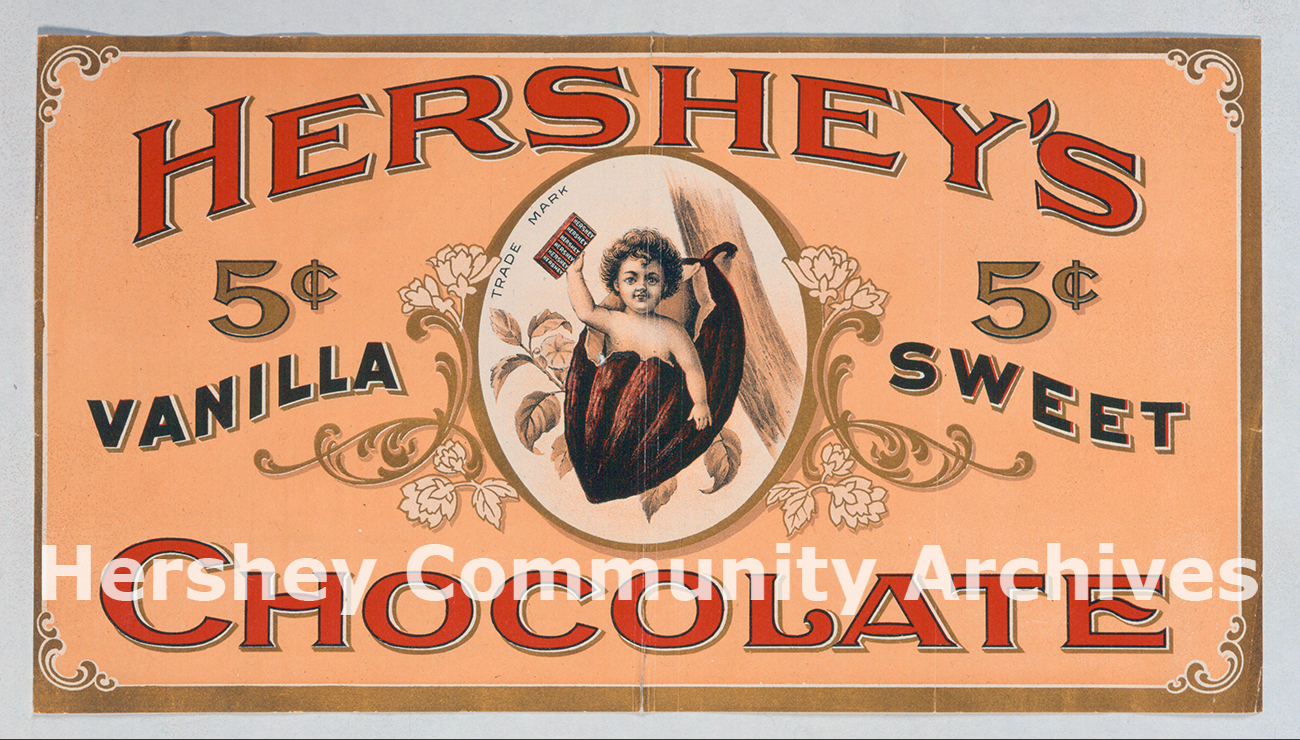

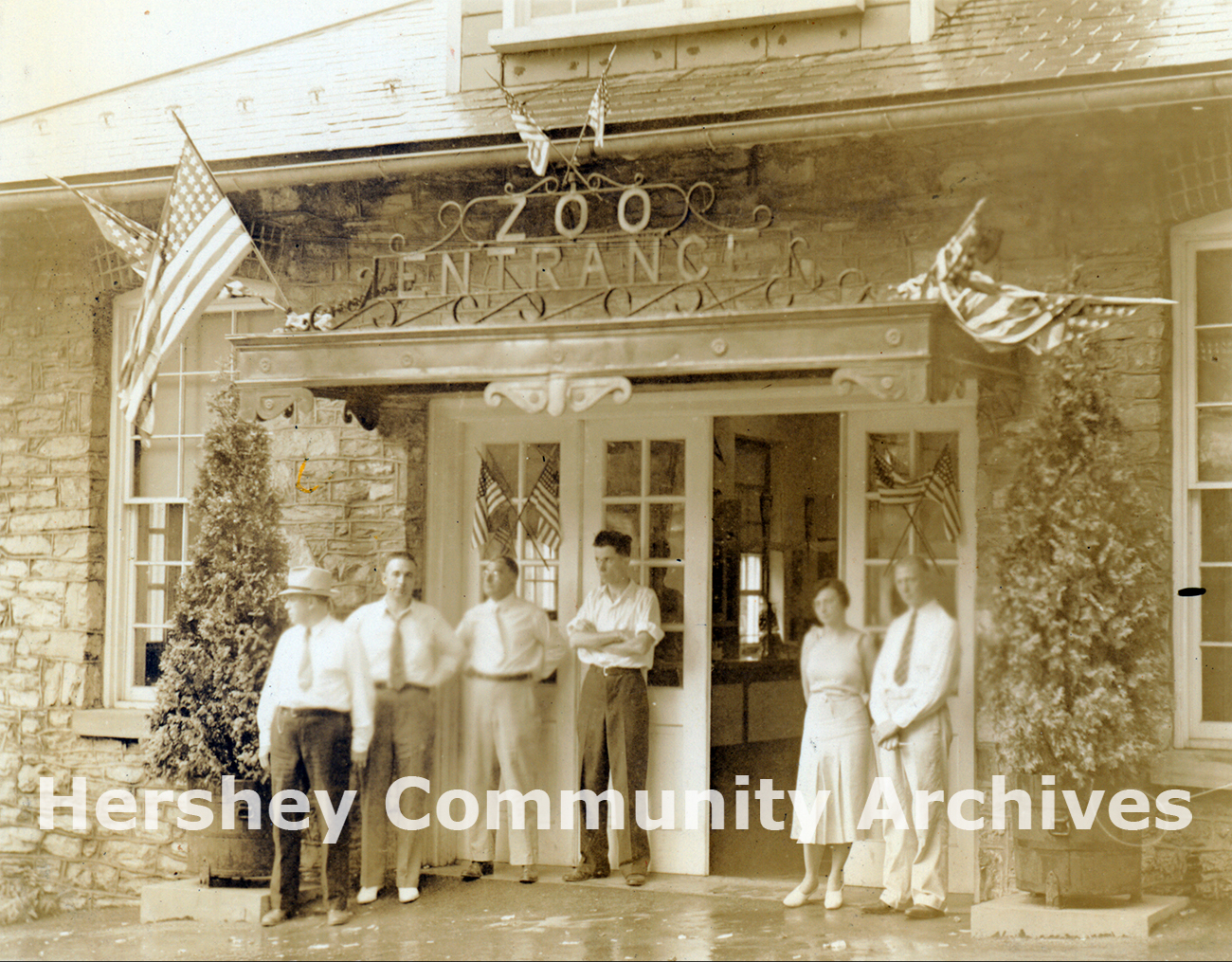
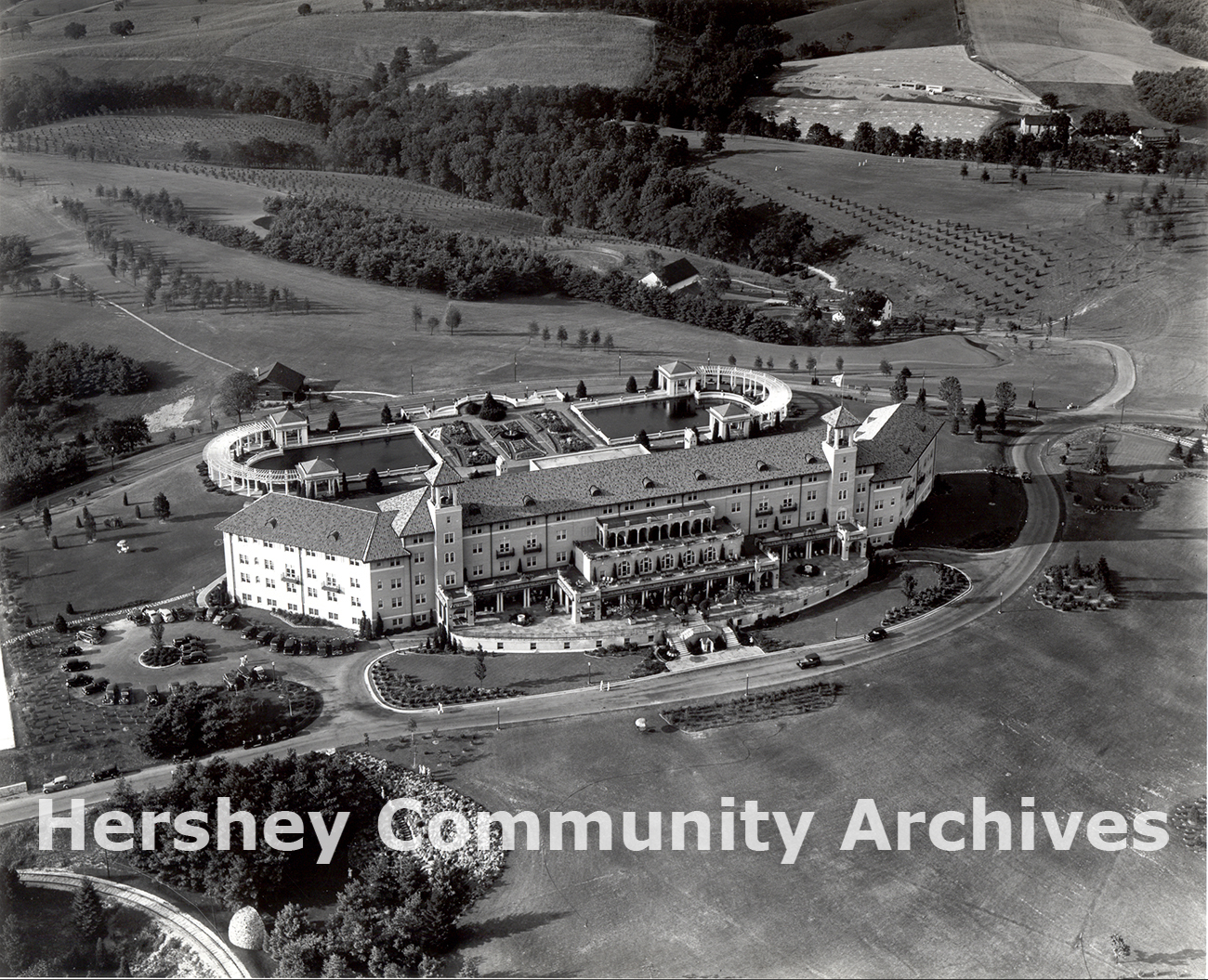
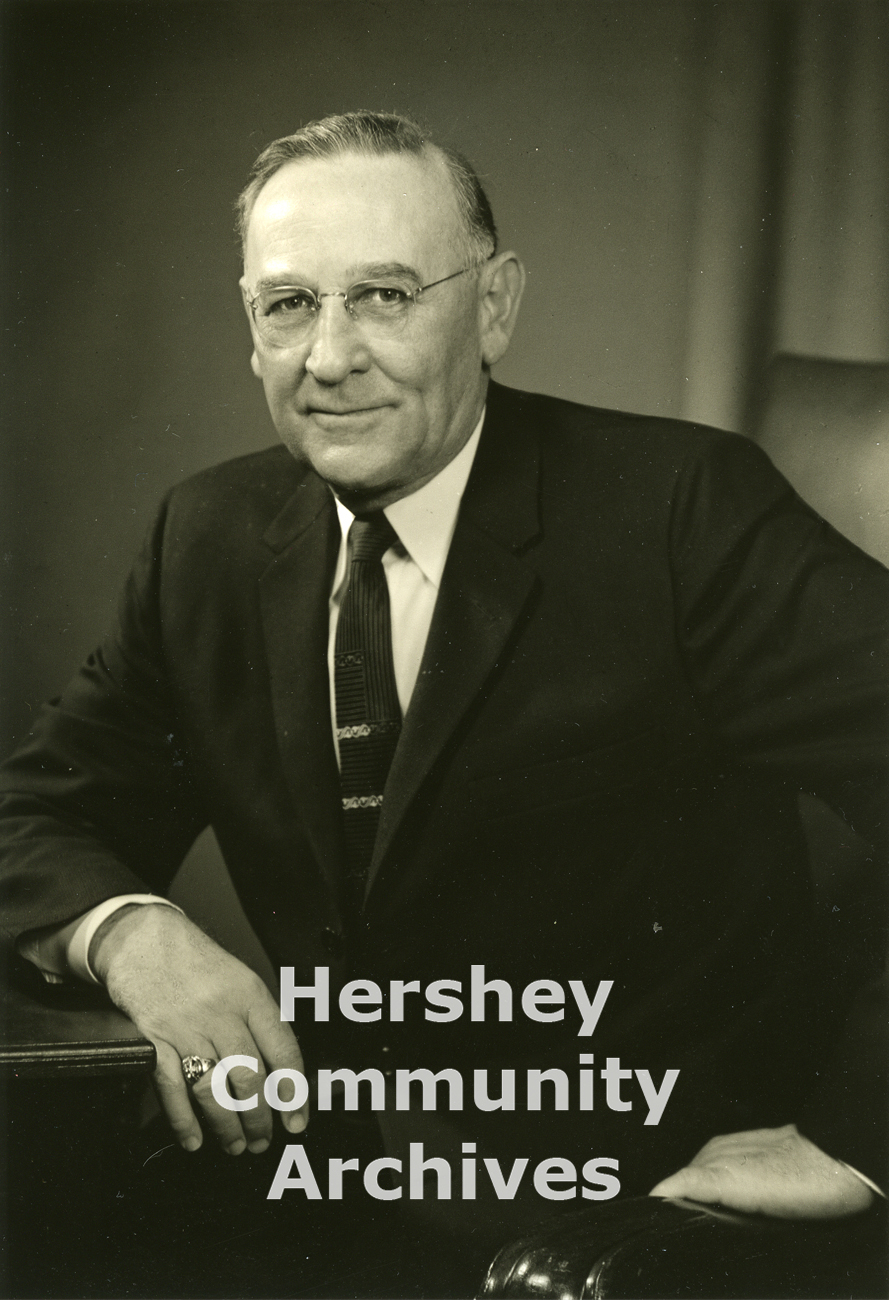
![Percy Alexander [P.A.] Staples, ca. 1946](https://hersheyarchives.org/wp-content/uploads/2019/09/1C114.1.jpg)
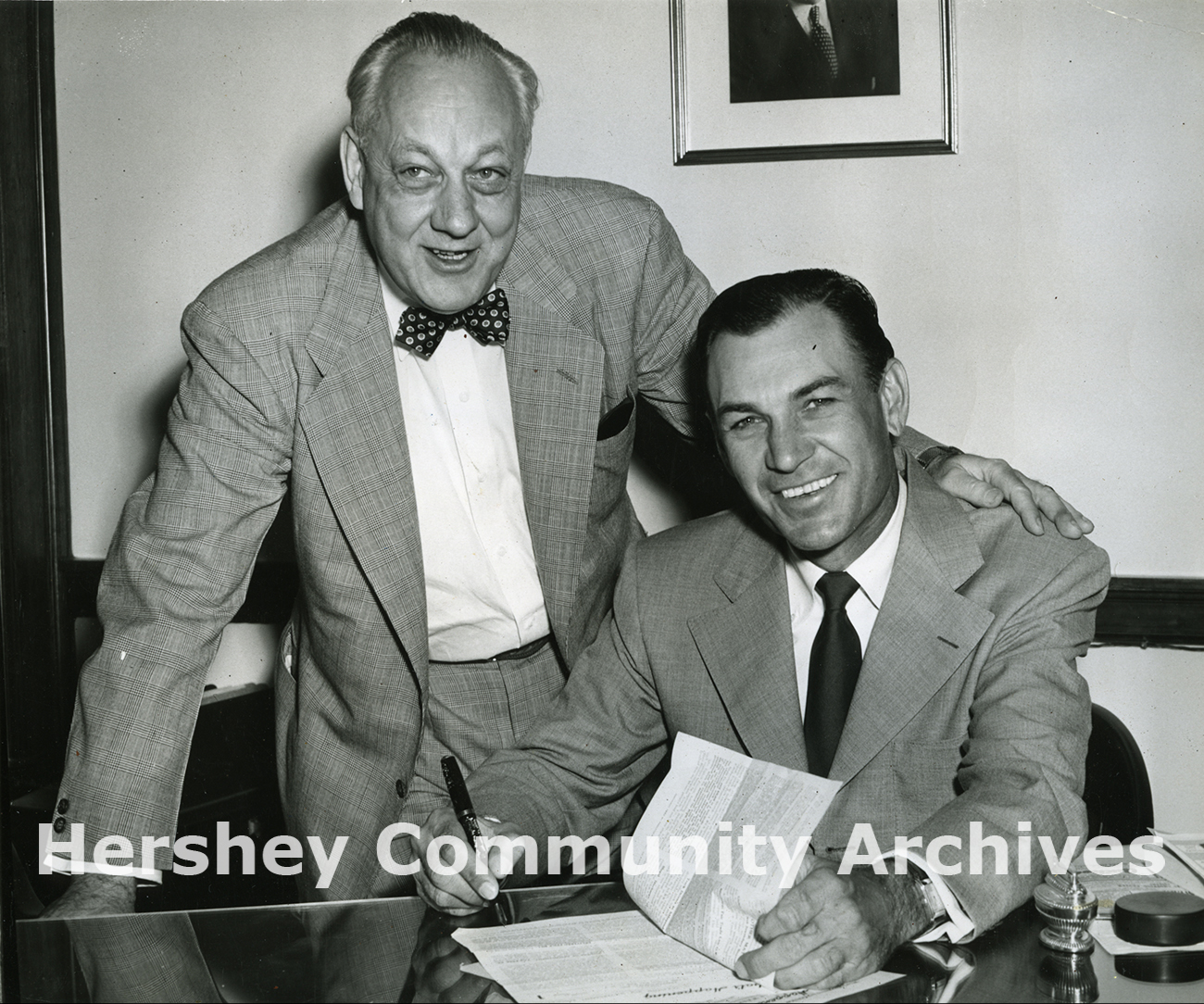
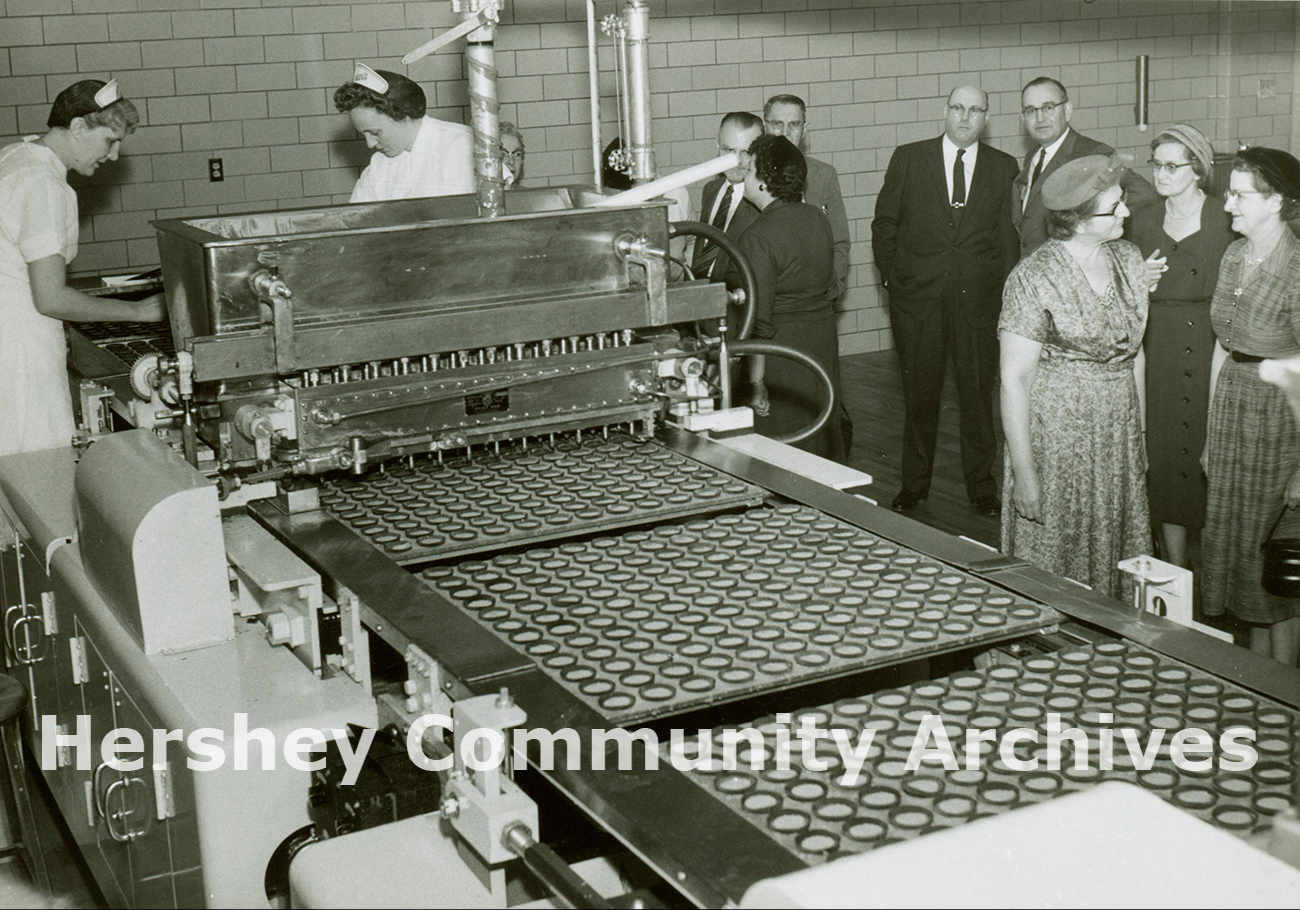

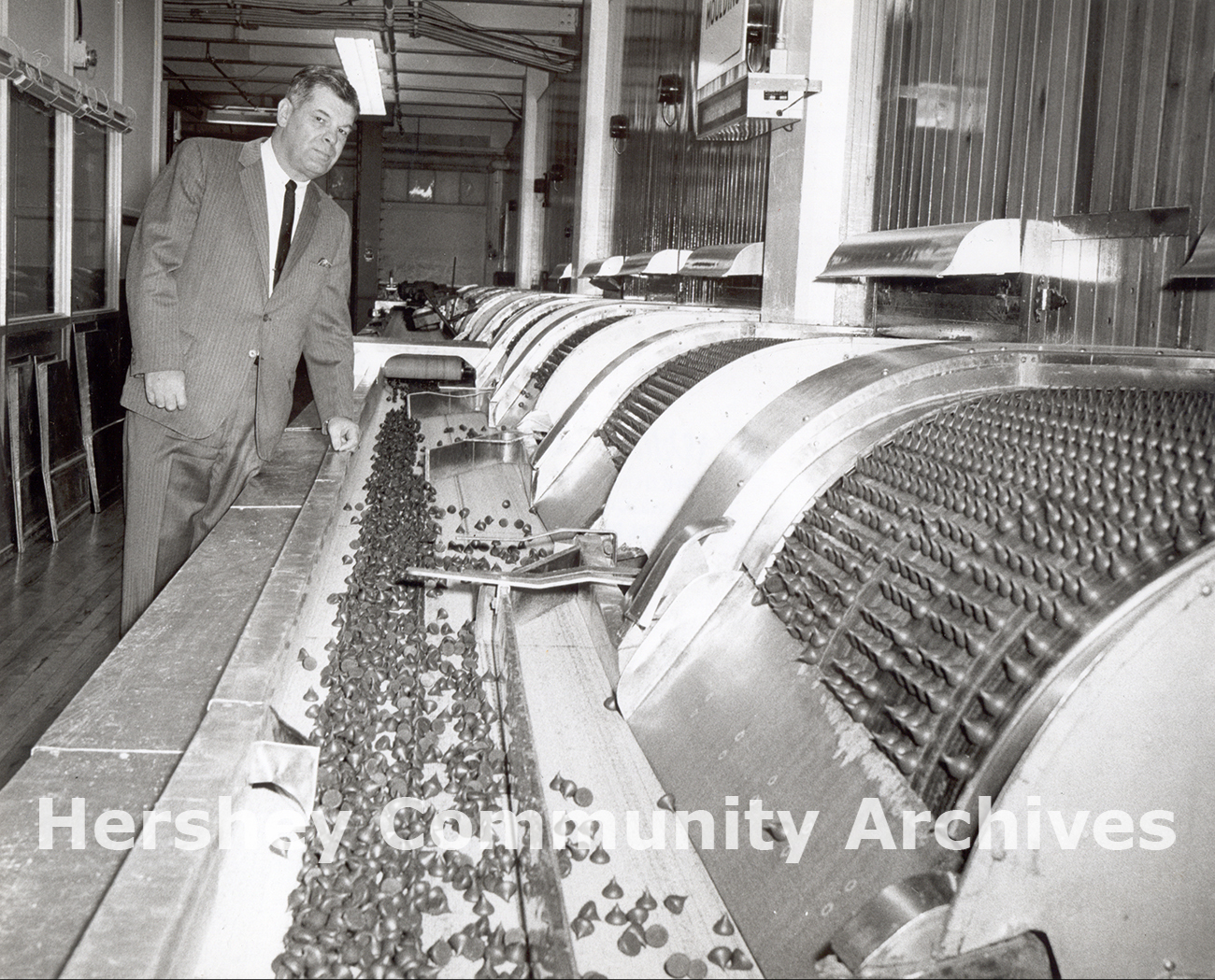
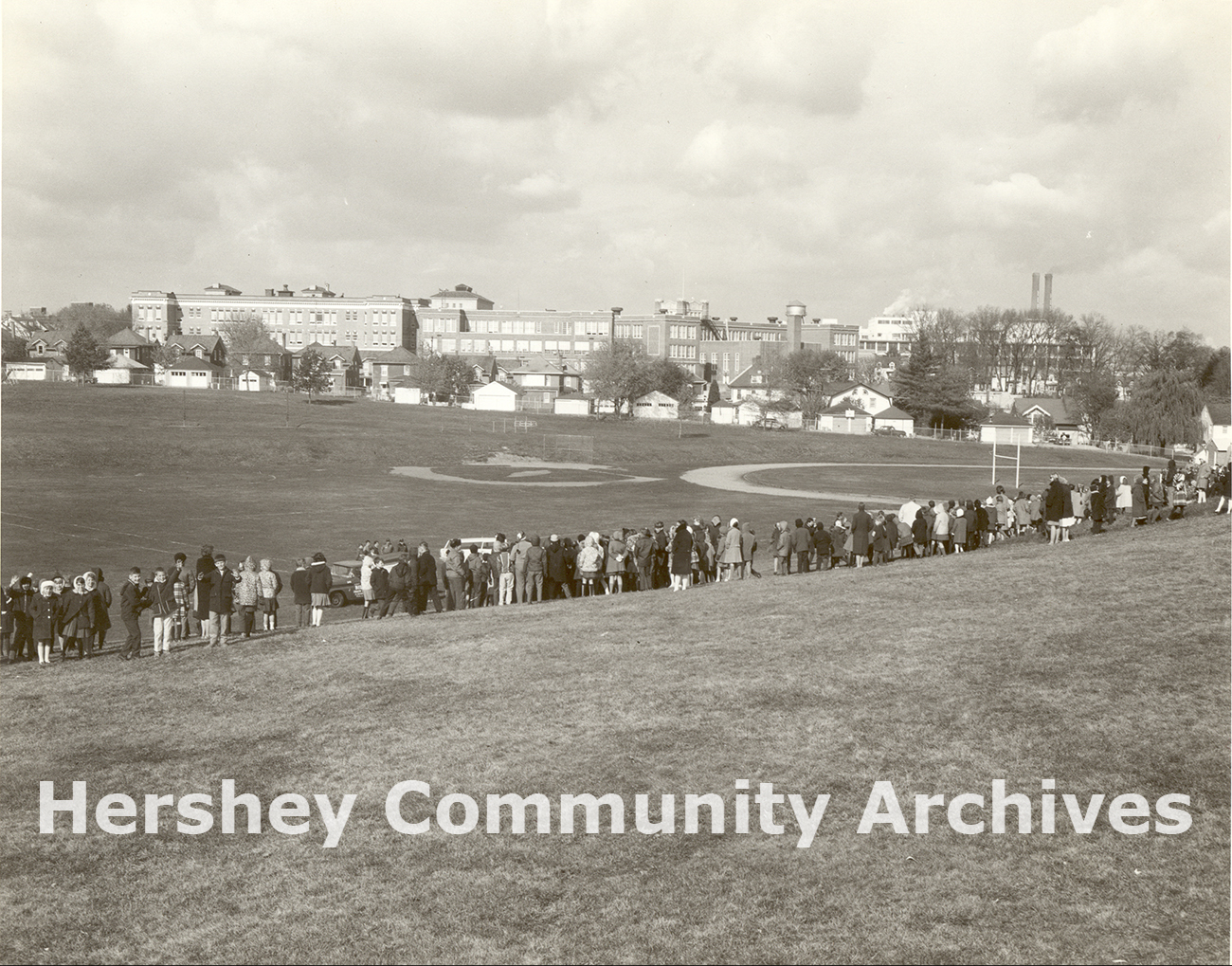
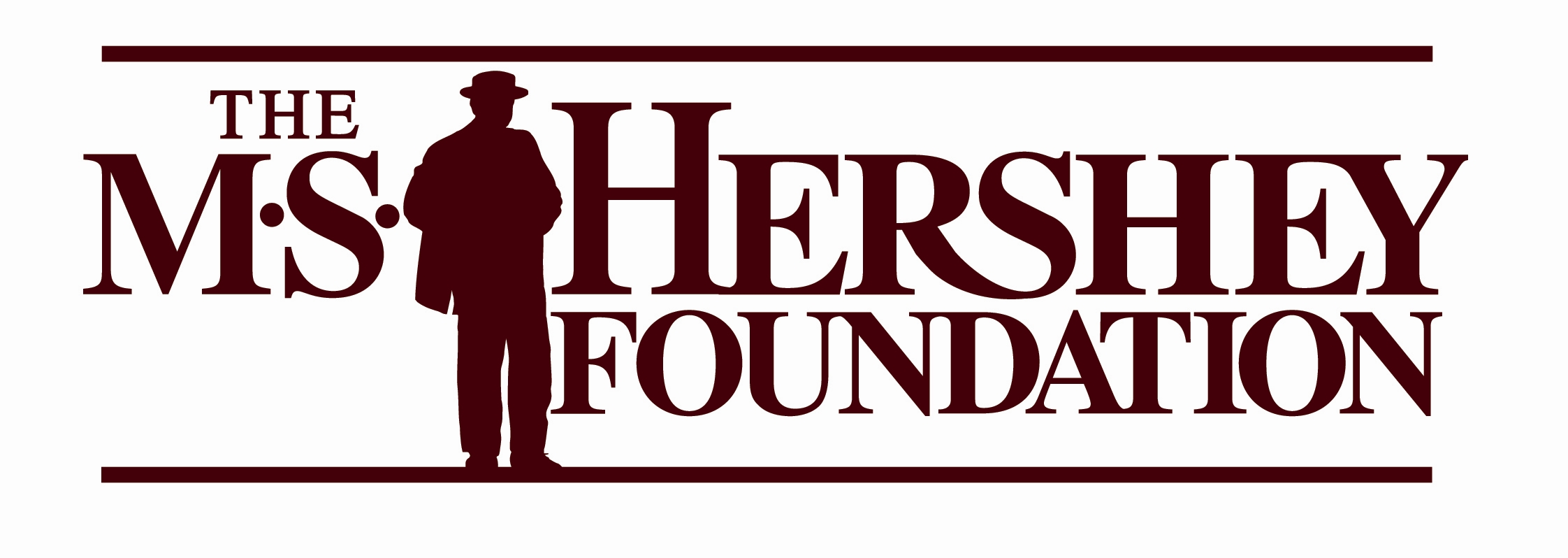
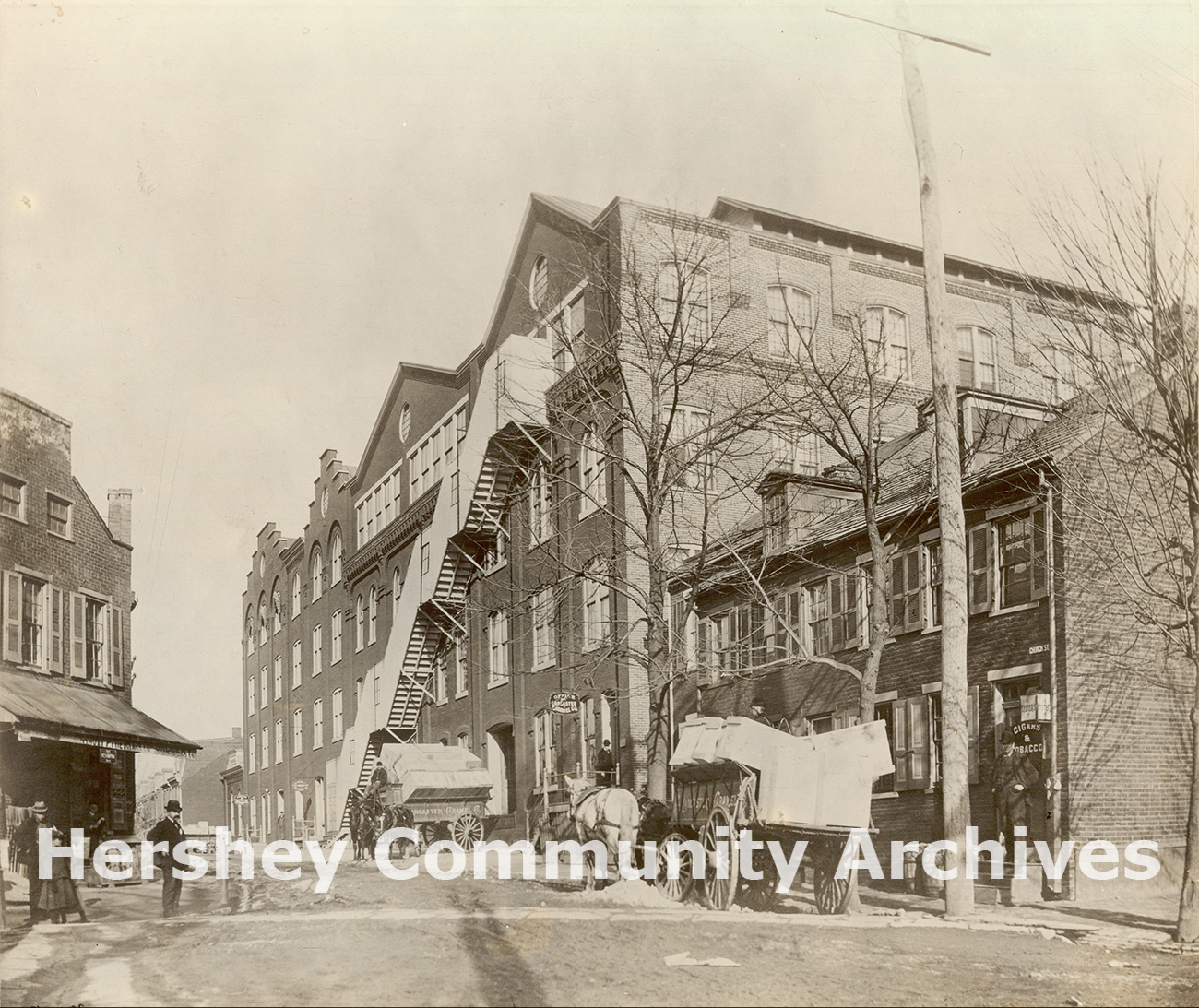

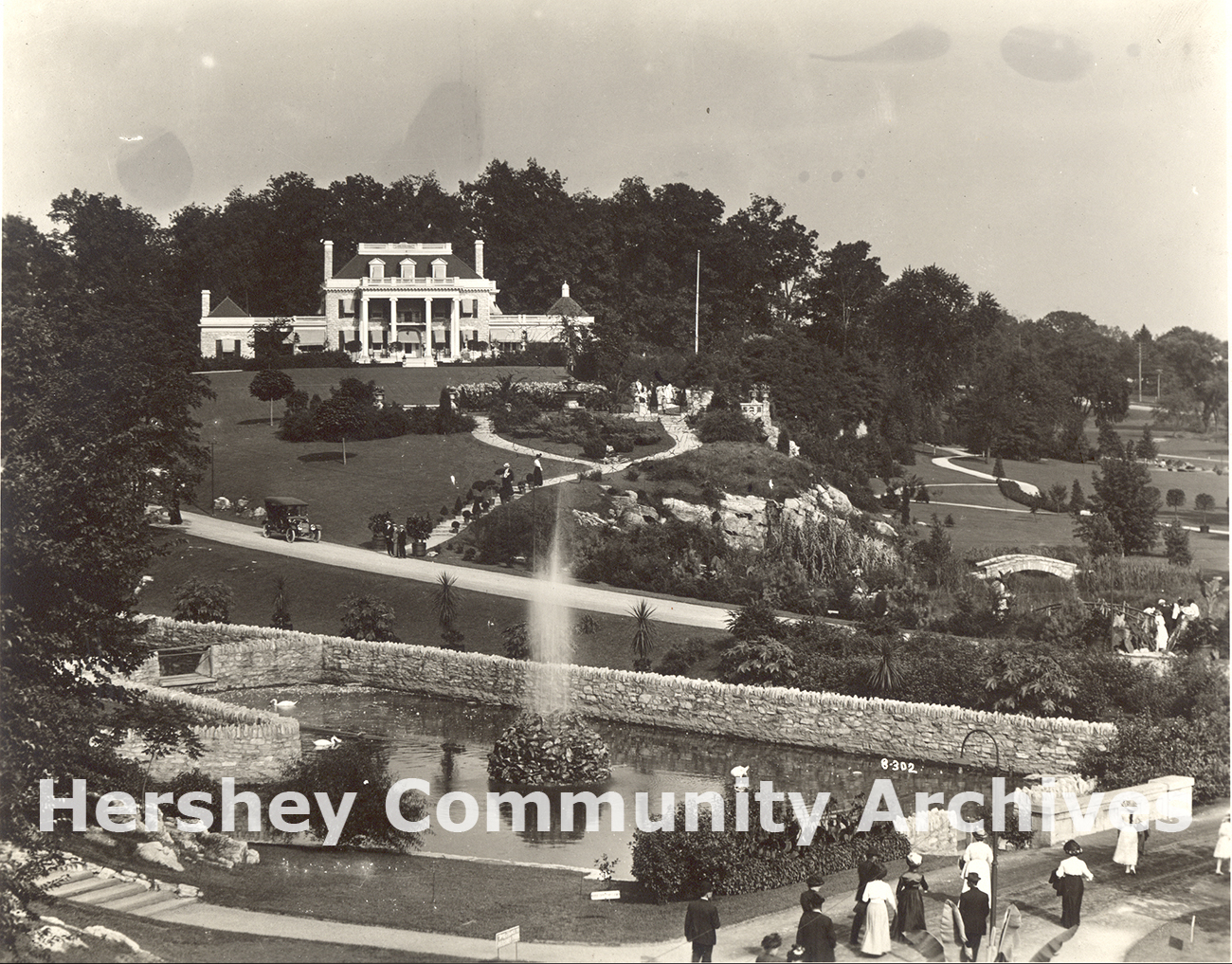

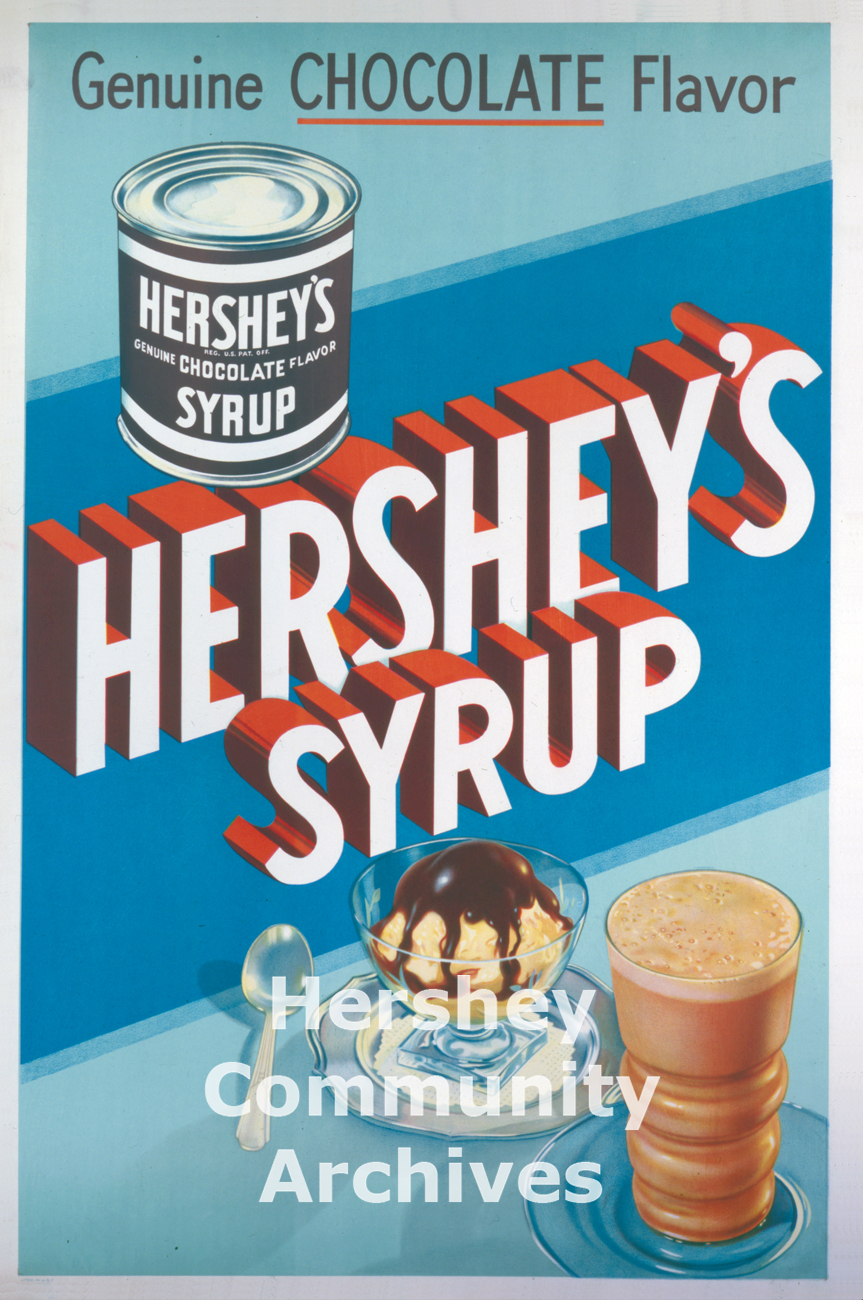
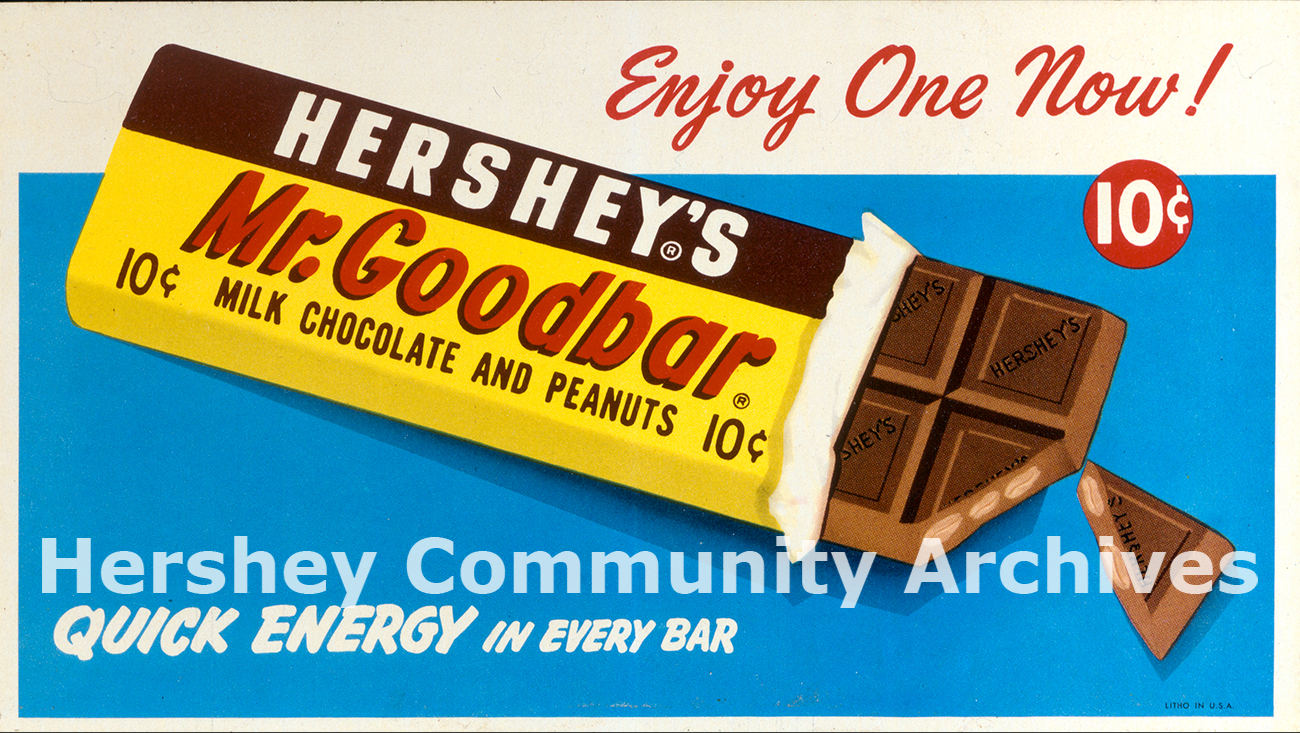
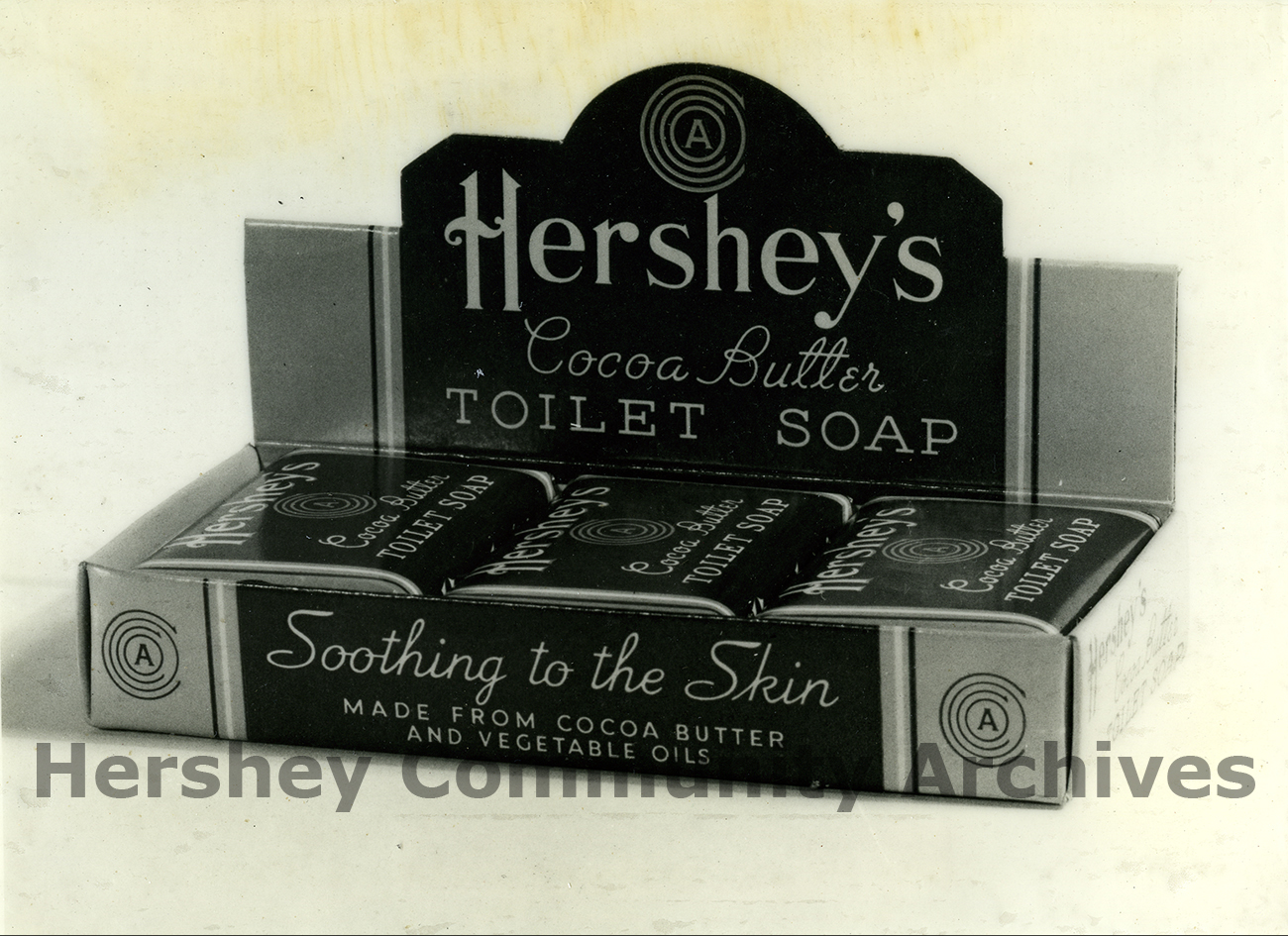
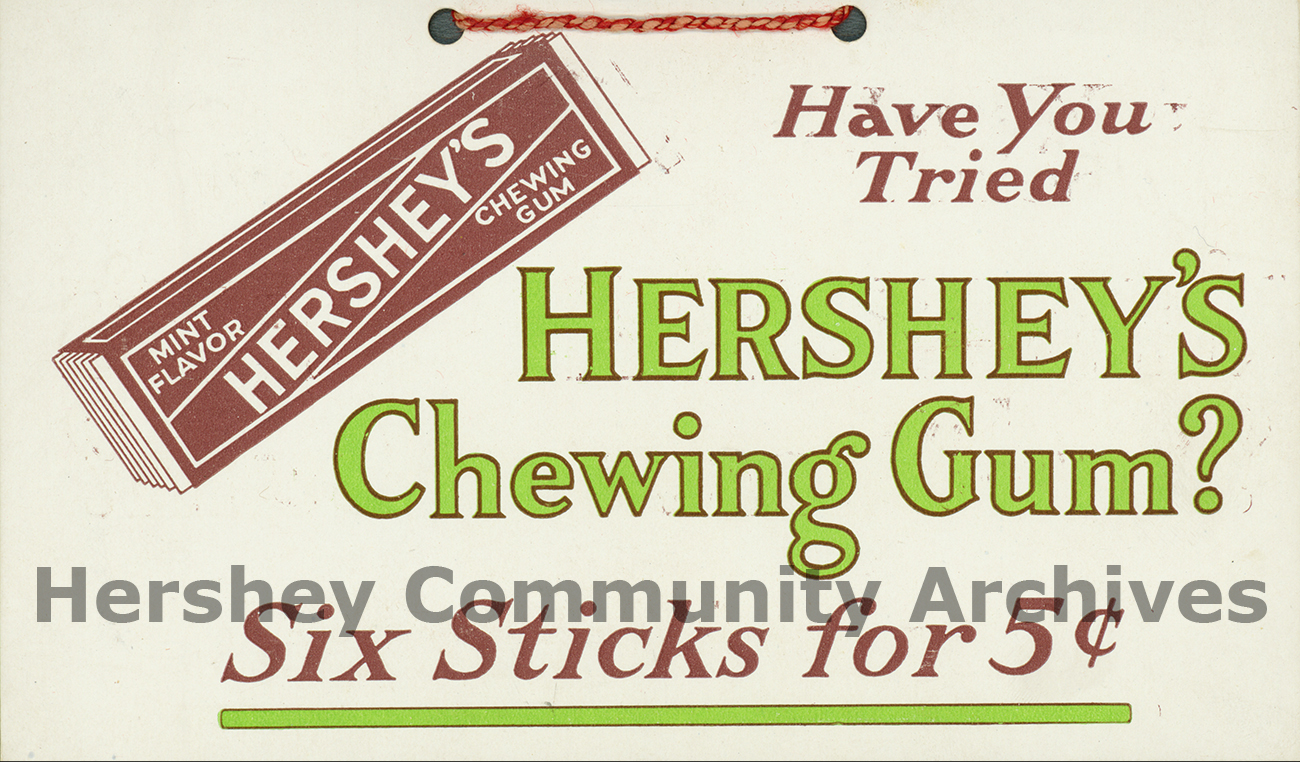
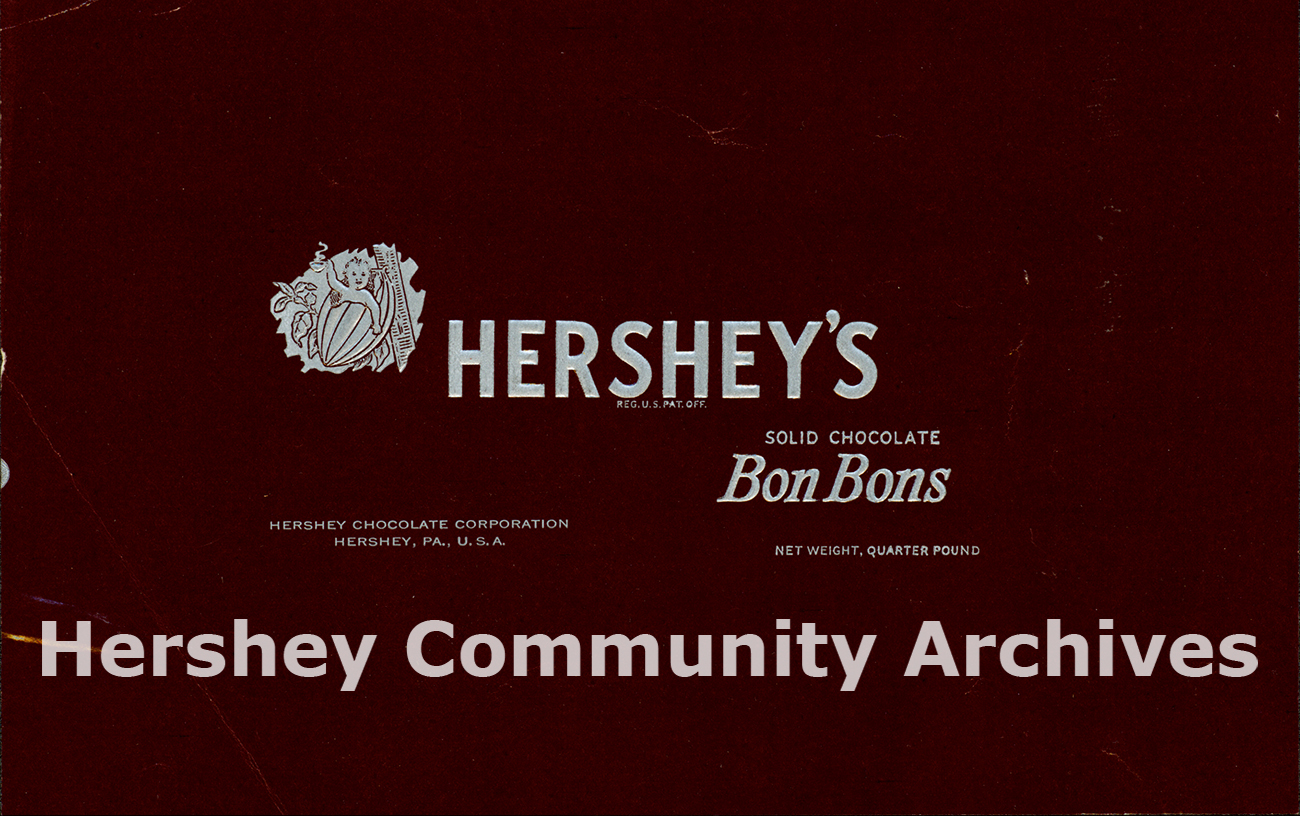
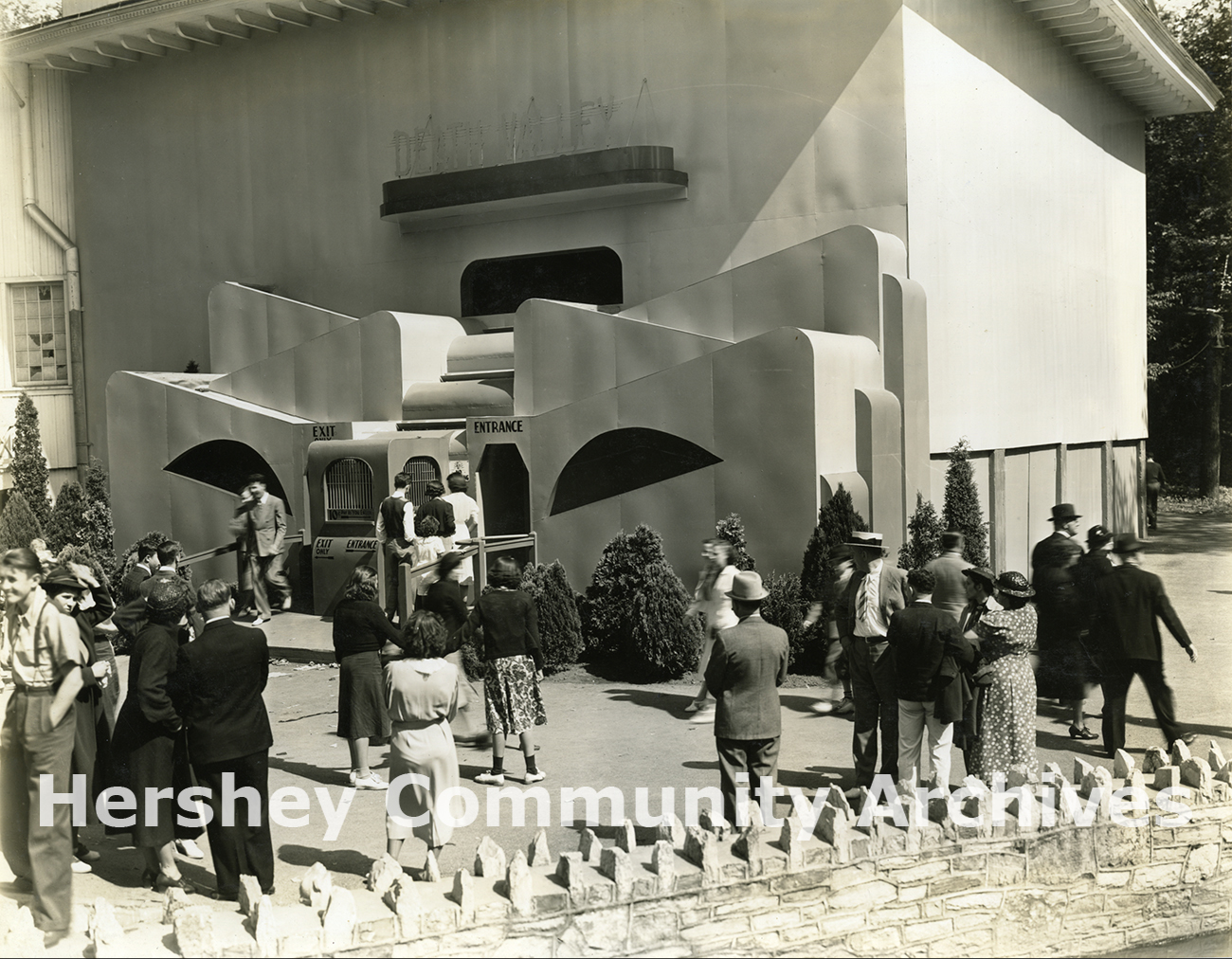
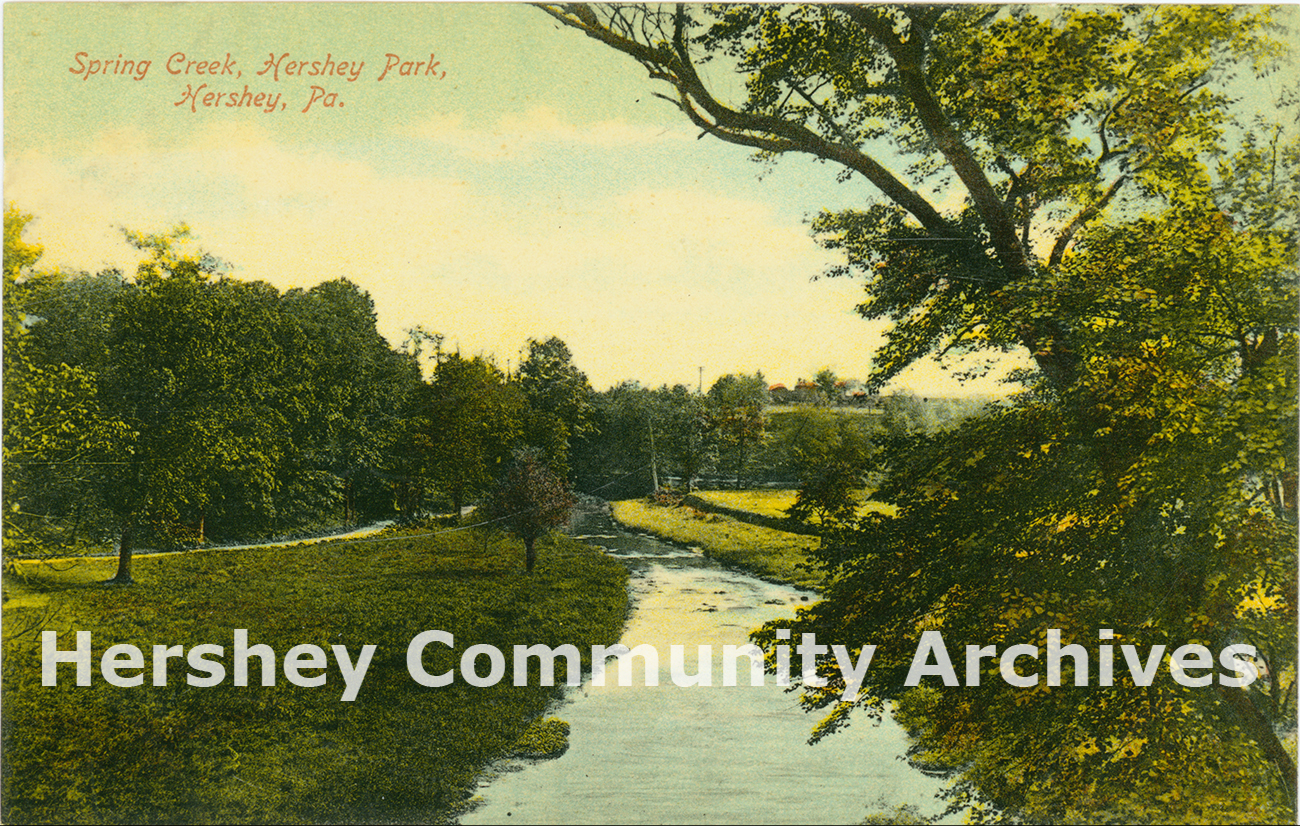
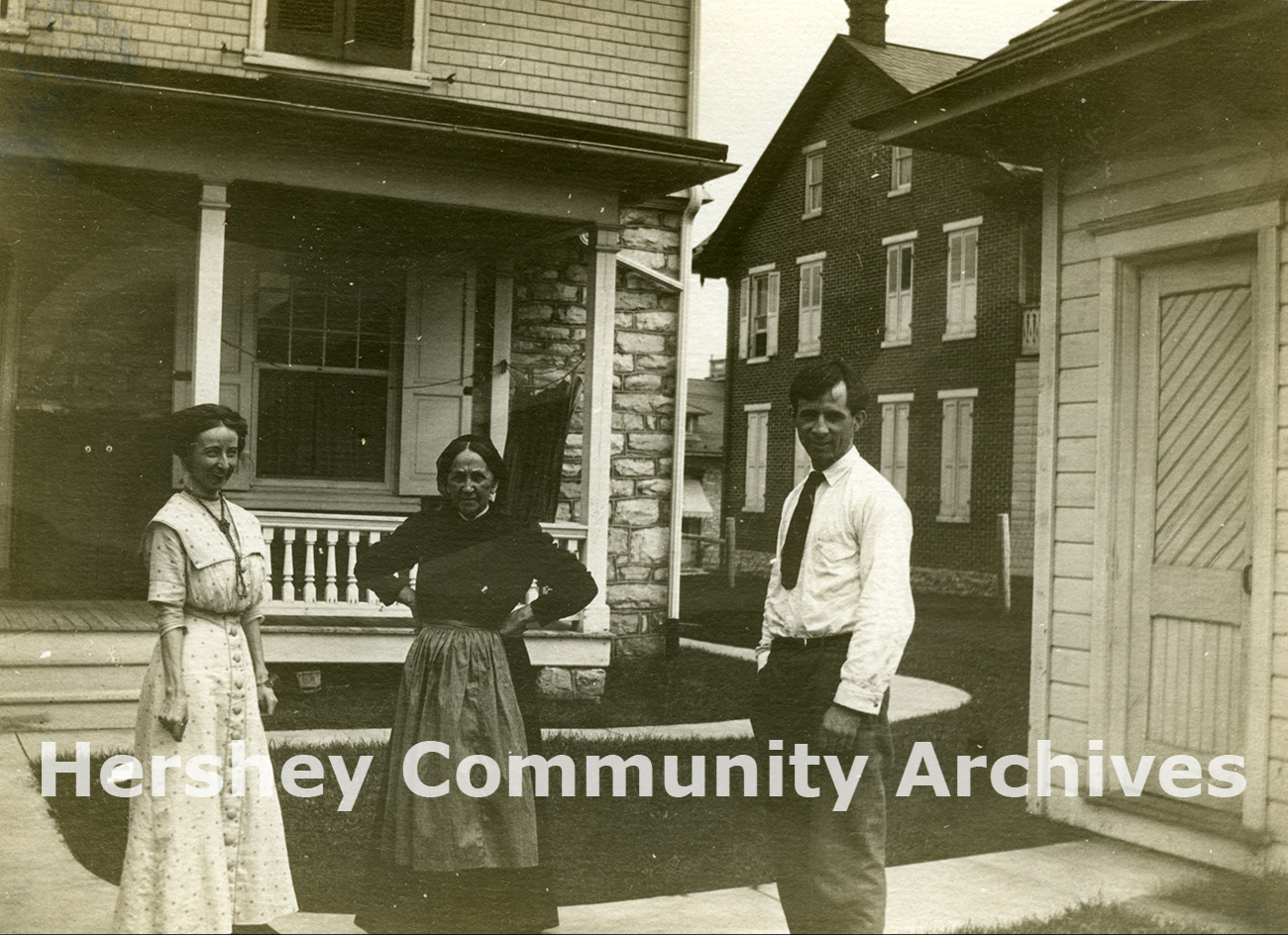
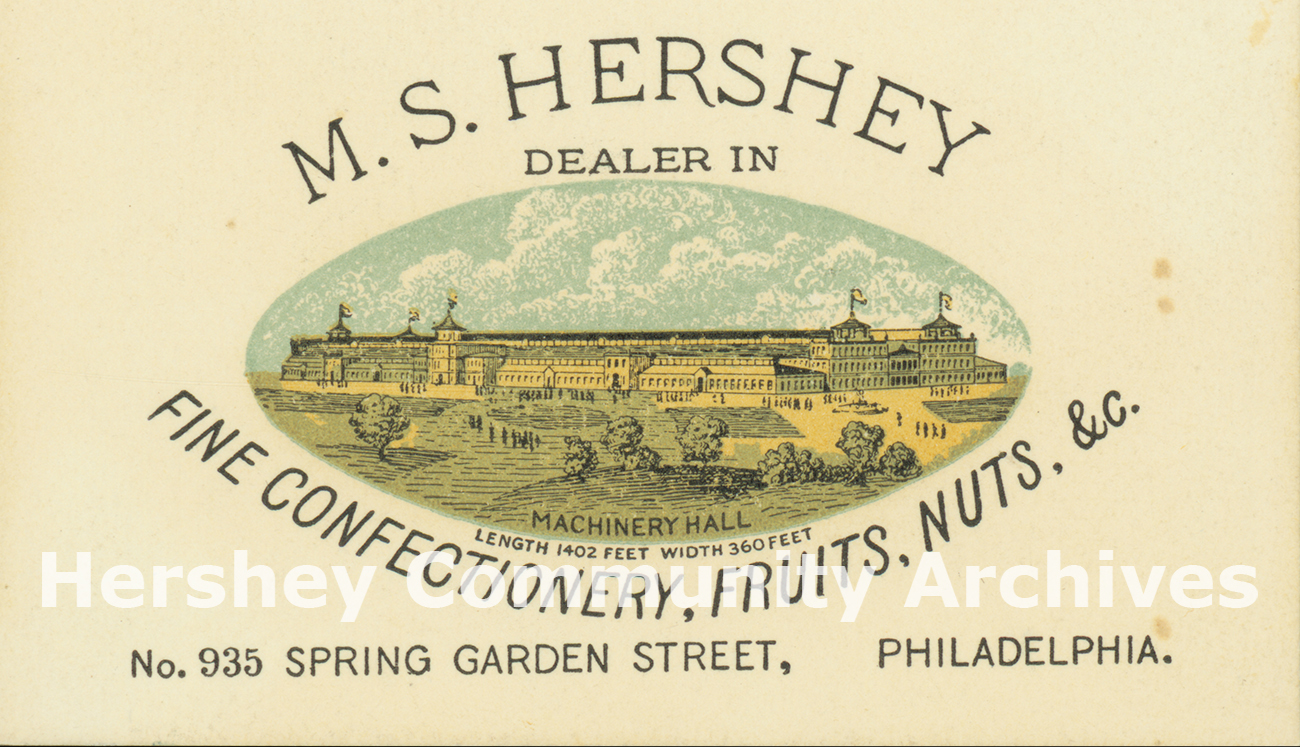
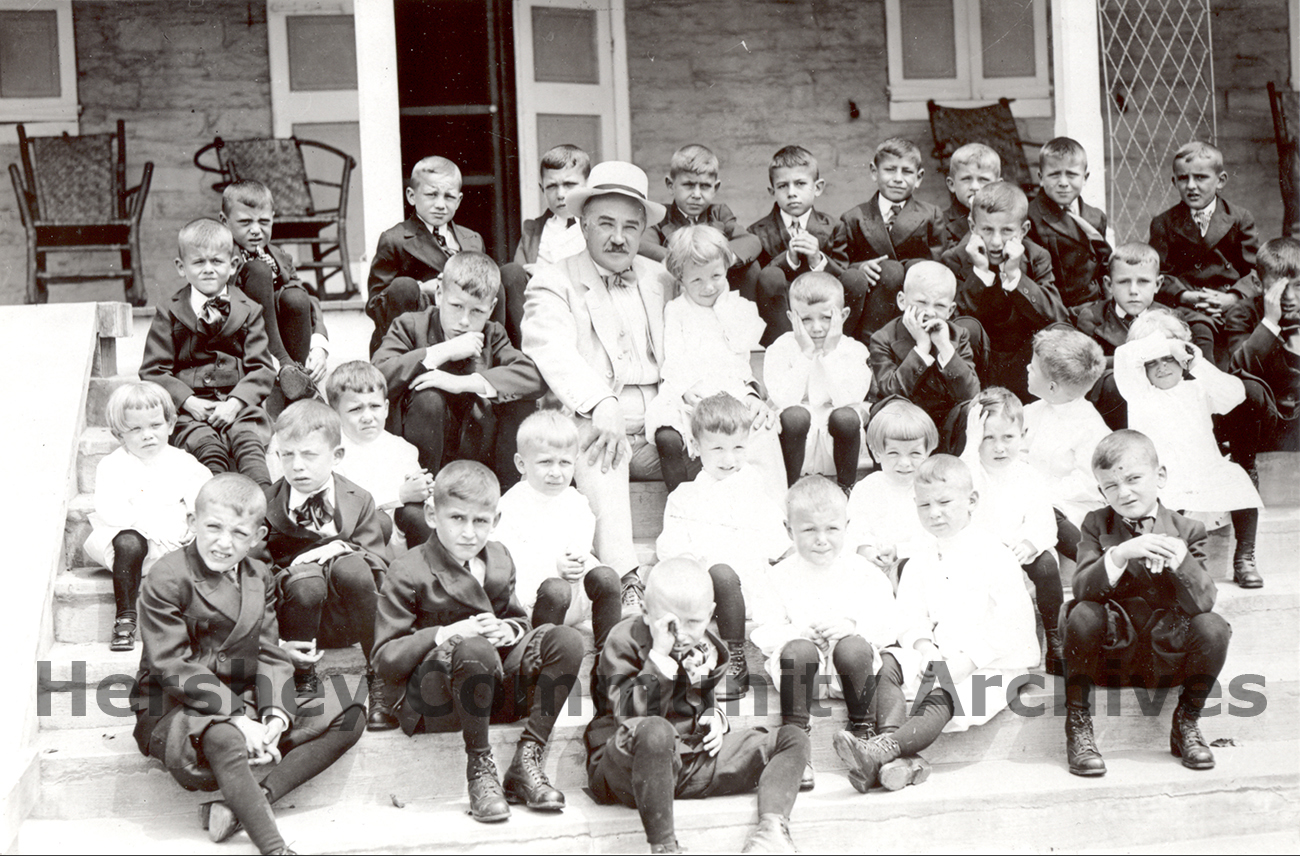

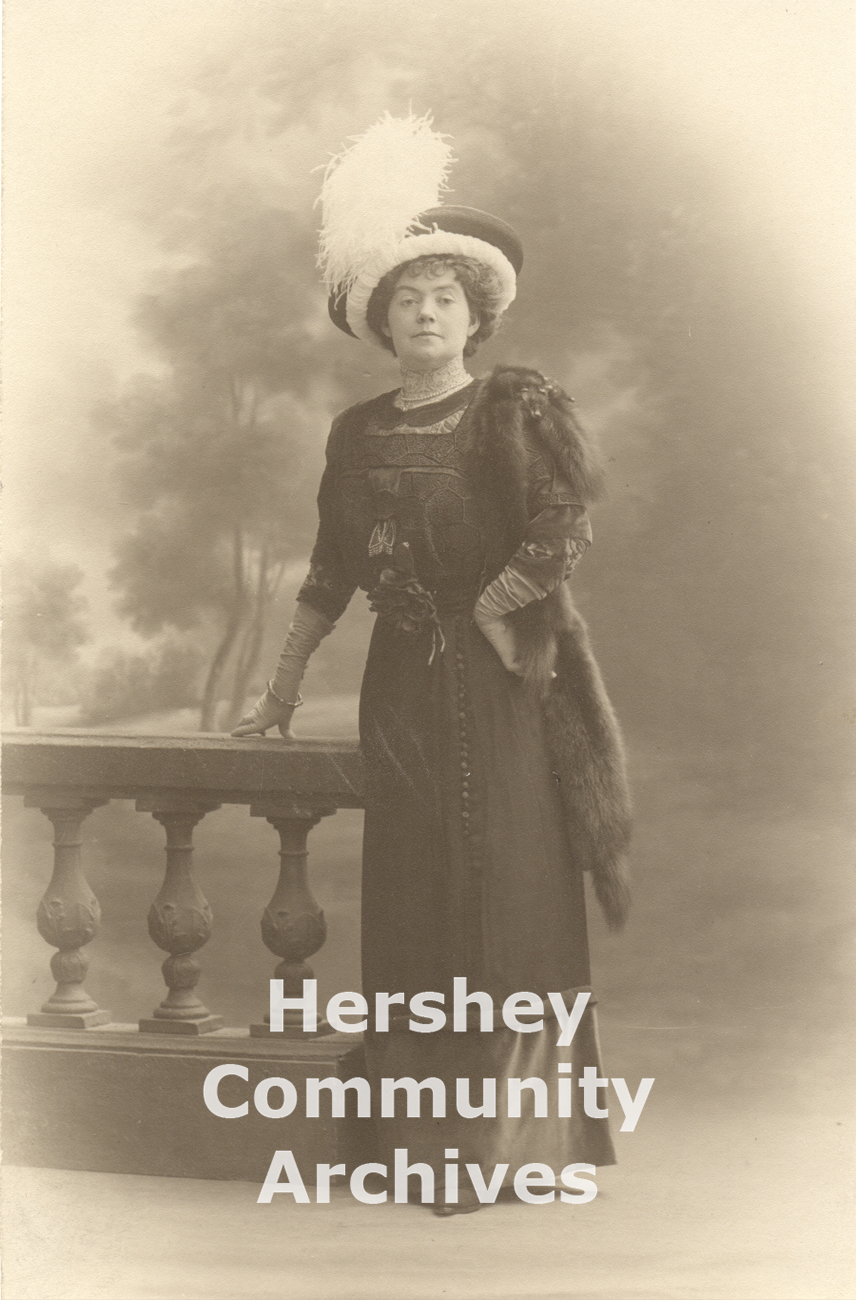
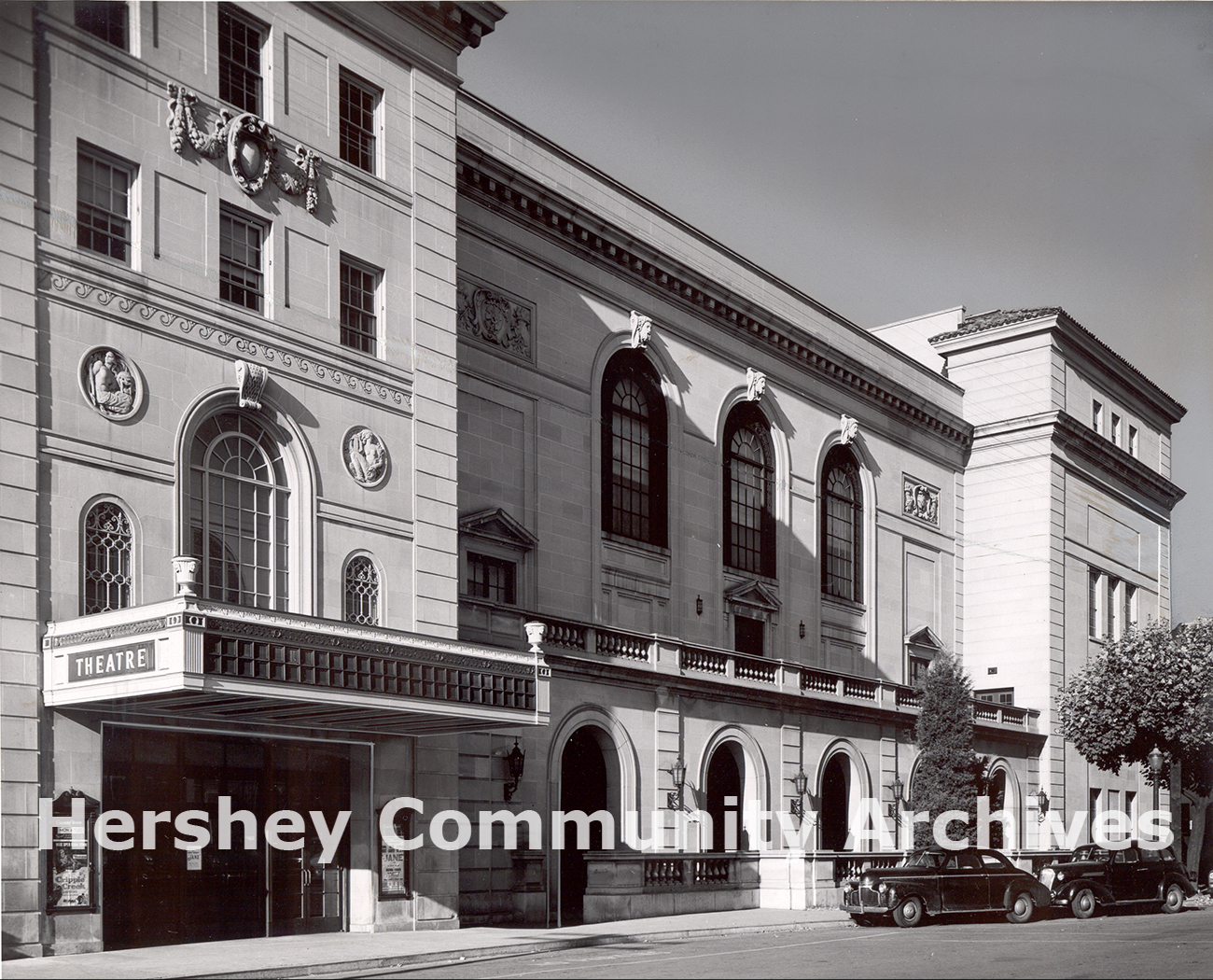
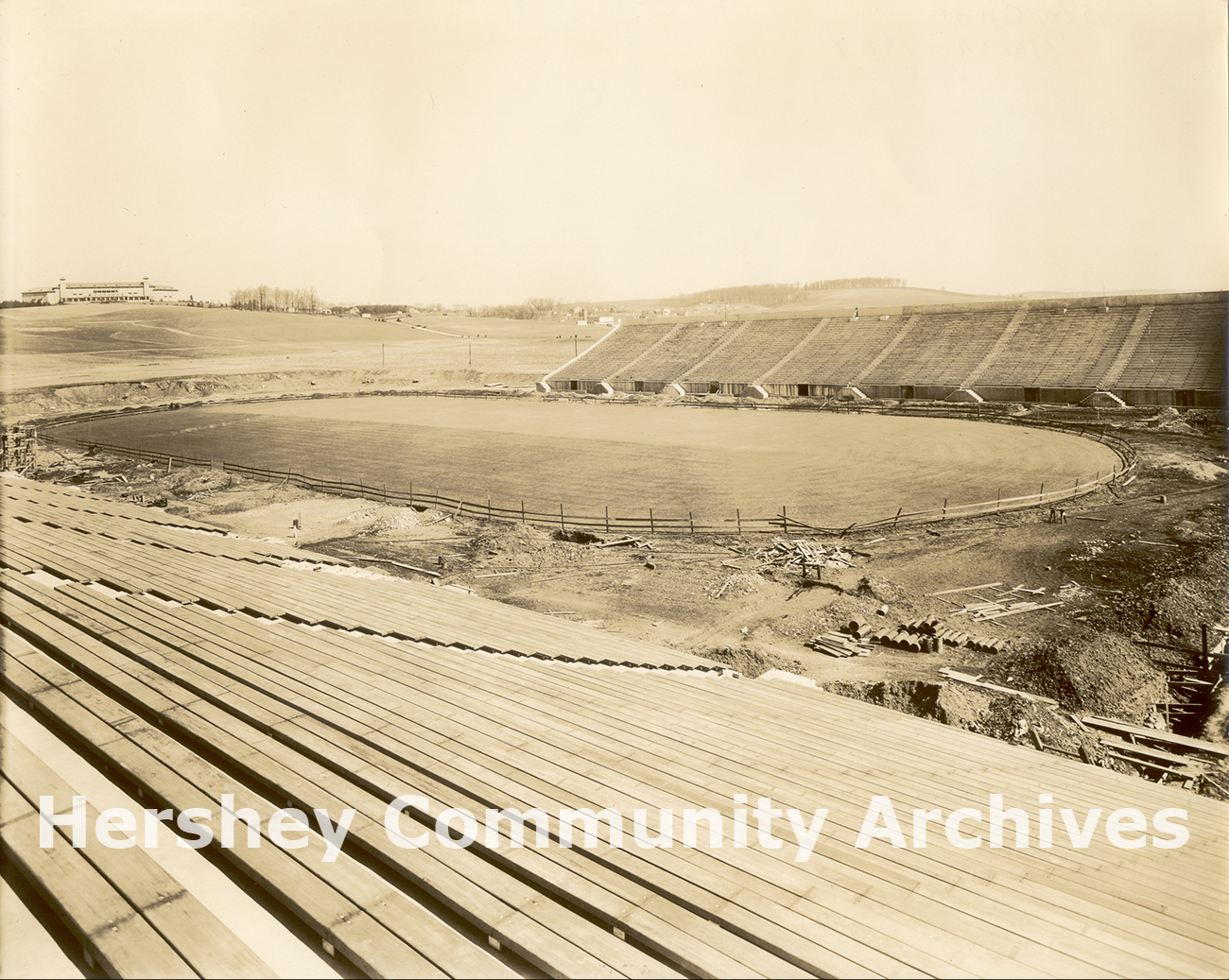
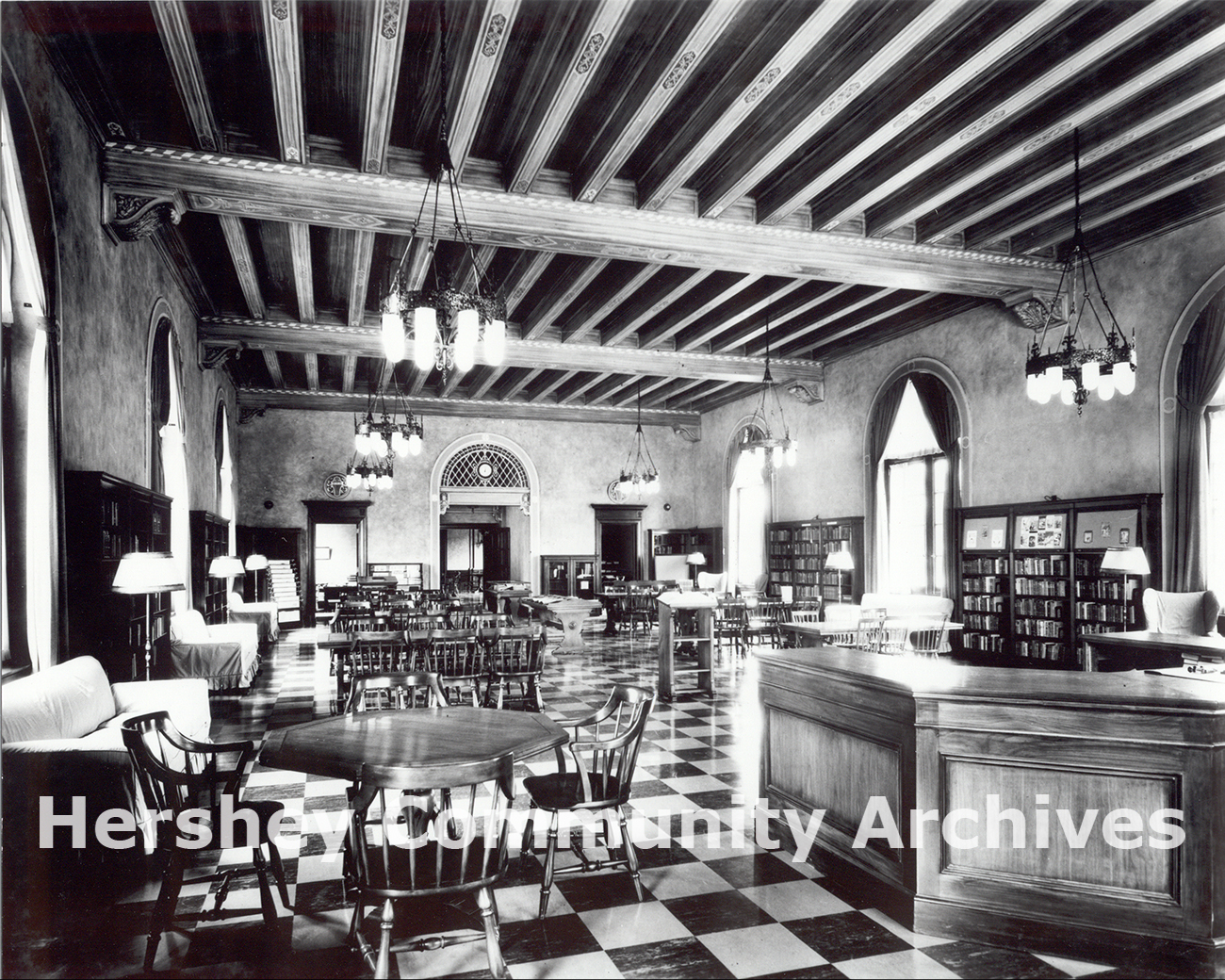
!["Pergola and Pool, Hershey Rose Garden, Hershey, Pa." 1938 (Curt Teich and Company, Chicago, Illinois [8AH1648])](https://hersheyarchives.org/wp-content/uploads/2019/07/PC217.jpg)
